- Career Blog

Writing a Winning Job Application Letter: Tips and Examples

A job application letter, also known as a cover letter, is a formal letter that accompanies your resume and introduces you to a potential employer. The purpose of a job application letter is to highlight your qualifications, experience, and skills that make you the perfect candidate for the job. It also helps employers understand your personality, work ethic, and how you plan to contribute to their organization.
Importance of Customization
One of the key factors that can make or break your job application letter is how well you customize it to the specific job you are applying for. Employers want to see that you have taken the time to research their company and understand what they are looking for in a candidate. Customizing your letter also shows that you are genuinely interested in the job and that you are willing to put in the extra effort to stand out from other applicants.
Brief Overview of Key Sections
While job application letters can vary slightly depending on the job and industry, they typically contain four key sections:
Introduction: This section should include a brief introduction, the job you are applying for, and how you found out about it.
Qualifications: In this section, you should discuss your qualifications and experience that make you a good fit for the job. Be sure to tailor this section to the specific job requirements to show that you have the skills they are looking for.
Skills: Here, you should highlight your relevant skills and how they apply to the job. Use examples from your past experiences to demonstrate your proficiency in each skill.

Closing: The closing paragraph should thank the employer for considering your application and provide contact information for them to reach you.
In this article, we will dive into each of these sections in more detail and provide tips and examples to help you write a winning job application letter.
Understand the Job Requirements
To write a winning job application letter, it is important to thoroughly understand the job requirements. This involves analyzing the job description and understanding the needs of the employer, as well as tailoring your letter to attract the specific employer.
A. Analyzing the Job Description
The job description provides you with valuable information about the position you are applying for. It outlines the required skills, qualifications, and responsibilities of the job. By analyzing the job description, you can determine if the role is a good fit for your experience and qualifications.
When analyzing the job description, it is important to pay attention to key phrases and requirements mentioned. These can give you insight into the priorities of the employer and allow you to tailor your application to meet those priorities.
B. Understanding the Needs of the Employer
To write a winning job application letter, it is also essential to understand the needs of the employer. This means researching the company and the industry to get a better understanding of the company culture, mission, and values. It also means understanding the desired outcome of the position and how you can address the employer’s needs.
One way to convey your understanding of the employer’s needs is to highlight relevant accomplishments in your application letter. By showing how you have successfully addressed similar challenges in the past, you can demonstrate your potential value to the employer.
C. Tailoring the Letter to Attract Specific Employer
Finally, to write a winning job application letter, it is important to tailor your letter to attract the specific employer. This means using language and examples that relate to the specific company and its values. It also means customizing your application letter to the specific job and its requirements.
To tailor your letter, take the time to research the company and its values. This can involve reviewing their website, social media, and other online resources. By addressing the specific needs and values of the employer, you can show that you are invested in the position and the company.
To write a winning job application letter, it is important to understand the job requirements, analyze the job description, understand the needs of the employer, and tailor the letter to attract the specific employer. By doing so, you can craft an application that stands out from the competition and showcases your value as a candidate.
Research the Company and Industry
Before writing your job application letter, it’s important to research the company and industry thoroughly to increase your chances of writing a winning letter. Here are three key areas to focus on:
A. Understanding the Mission, Vision, and Values of the Company
Make sure you take the time to research the company’s mission, vision, and values. This will help you understand the company’s goals and the qualities they look for in employees. You can find this information on the company’s website, social media pages or company annual report.

Incorporate the values and mission statement of the company into your job application letter. This highlights your alignment with the company culture, and how your beliefs and goals match that of the organization’s.
B. Identifying the Company’s Competition
Once you have an understanding of the company, you need to identify the company’s competition. Knowing who the competitors are can help you understand the industry as well as the company’s market share position.
List the company’s competitors in your job application letter and briefly explain how you see the company’s strengths overcoming the competitors’ weaknesses.
C. Industry Trends and How to Address Them
The final area to focus on when researching the company and industry is identifying current industry trends and how these trends may impact the company’s future. Use reputable sources to gather trends and predictions about the industry. This will also show the recruiter that you are not only familiar with their industry, but are engaging in informed discussion and contributing to innovative solutions.
Incorporate industry trends into your job application letter and showcase the ideas and innovations you bring, how leveraging them can enhance the company’s position and how you can contribute to any current and future challenges, for which the potential employer has yet to find a solution.
By researching and incorporating the above areas into your job application letter, you demonstrate a genuine interest in the organization and showcase clear understanding, innovative thought and how your expertise can improve the company’s performance.
Know Your Strengths and Skills
When writing a job application letter, it’s crucial to understand your unique selling proposition, relevant experience, and transferrable skills. This information will help you stand out from the other applicants and potentially land the job of your dreams.
A. Identifying Your Unique Selling Proposition
Your unique selling proposition (USP) is what sets you apart from the other candidates. It could be a specific skill, experience or personality trait that aligns with the company’s values and job requirements. Start by analyzing the job description and researching the company culture to identify what makes you an ideal candidate for the role.
Once you have identified your USP, use it as the main selling point in your job application letter. Highlight your strengths and skills and explain how they align with the job requirements and the company’s values. This will show the hiring manager that you are not just another candidate, but someone who has something valuable to offer.
B. Highlighting Your Relevant Experience and Accomplishments
Your work experience and achievements are essential in demonstrating your abilities and suitability for the job. When crafting your job application letter, focus on highlighting your relevant experience and accomplishments. Use specific examples to demonstrate how you have contributed in previous roles and how those skills could be applied to the new role you are applying for.
Be sure to use metrics whenever possible as numbers are a great way to showcase your achievements. For example, if you were able to increase sales revenue by 20% in your previous role, mention it in your letter. This will give the hiring manager a clear understanding of your capabilities and how they align with the job requirements.
C. Understanding How to Leverage Transferrable Skills
Transferrable skills are those abilities that you have gained from your previous experiences that are not necessarily related to the job you are applying for. They can be valuable in demonstrating your adaptability and ability to learn quickly.
When discussing your transferrable skills in your job application letter, highlight how they could be applied to the new role you are applying for. For example, if you have strong communication skills, explain how you could use that to effectively collaborate with team members and clients.
By understanding and leveraging your unique selling proposition, relevant experience and accomplishments, and transferrable skills, you can write a job application letter that stands out from the crowd. Remember to tailor your letter to the job requirements and company culture to increase your chances of success.
Address Gaps in Your Resume or Experience
When applying for a job, it’s important to consider any gaps in your resume or experience that might be a red flag for hiring managers. Addressing these gaps upfront can demonstrate your accountability and willingness to take ownership of your shortcomings.
A. Taking ownership of failings
If you have gaps in your work history or experience, don’t try to hide or make excuses for them. Instead, take ownership of any failings and show that you’re actively working to improve yourself. This could involve taking courses, pursuing certifications, or volunteering in relevant areas to gain hands-on experience.
B. Finding a workaround for unfilled requirements
Sometimes a job posting requires specific qualifications or experience that you don’t have. In these cases, it’s important to find a workaround that demonstrates your ability to still meet the employer’s needs. This could involve highlighting related experience or transferable skills that could compensate for the missing requirement. Alternatively, it might involve offering to take on additional training or work with a mentor to acquire the missing knowledge.
C. Highlighting transferable skills to counter an irrelevant job background
When applying for a job in a new industry or field, it’s common to have a background that might not seem directly relevant. However, this doesn’t necessarily mean you’re unqualified for the role. By highlighting transferable skills, such as leadership, problem-solving, or communication, you can demonstrate your ability to adapt to new situations and learn quickly.
Addressing gaps in your resume or experience is an important aspect of writing a winning job application letter. By taking ownership of your failings, finding workarounds for unfilled requirements, and highlighting transferable skills, you can position yourself as a strong candidate and increase your chances of landing the job you want.
Crafting an Attention-grabbing Opening Paragraph
In the competitive job market, first impressions matter. The opening paragraph of your job application letter is your opportunity to make a positive and lasting impression on potential employers. In this section, we’ll explore the importance of crafting an attention-grabbing opening paragraph and provide tips and examples on how to do so.
A. Importance of First Impressions
Studies show that it takes less than 30 seconds for a recruiter or hiring manager to form an initial impression of a job candidate. This means that your opening paragraph is a critical component of your job application letter. Your goal is to capture the employer’s interest and convince them to continue reading.
B. Creative and Engaging Opening Lines
One effective way to capture the employer’s attention is by starting your letter with a creative and engaging opening line. This can be a quote, a personal story, a relevant statistic, or a bold statement. The key is to be authentic and genuine while still standing out from other applicants.
C. Strategies for Catching the Employer’s Attention
Beyond the opening line, there are several strategies you can use to further capture the employer’s attention. These include highlighting relevant skills and experience, demonstrating enthusiasm for the position and company, and connecting your qualifications to the job requirements.
By following these tips and examples, you can craft an attention-grabbing opening paragraph that sets you apart from the competition and piques the employer’s interest.
Highlighting Your Accomplishments
When it comes to writing a winning job application letter, highlighting your accomplishments is crucial. This allows potential employers to see the proven results that you can bring to their organization. Here are a few tips on how to effectively highlight your accomplishments:
A. Demonstrating Achievements in Previous Roles
One of the most effective ways to demonstrate your achievements is by highlighting your accomplishments in your previous roles. This shows that you have a track record of success and can bring that success to your next job. When highlighting your achievements, make sure to focus on results, not just responsibilities. Instead of stating that you managed a team, highlight the specific results that you achieved as a team leader.
For example, instead of saying, “Managed a team of 10 employees,” you could say, “Led a team of 10 employees to achieve a 25% increase in sales within the first quarter.” This shows the impact you had in your previous role and gives potential employers an idea of what you can achieve in their organization.
B. Using Data to Support Accomplishments
Using data to support your accomplishments is a powerful way to illustrate the impact you had in your previous roles. This could include data such as sales figures, customer satisfaction ratings, or employee retention rates. When using data, make sure to include specific numbers and percentages.
For example, instead of saying, “Improved customer satisfaction,” you could say, “Increased customer satisfaction ratings by 15% through implementing a new customer service training program.” This demonstrates the impact you had on the organization and the value you can bring to a potential employer.
C. Highlighting Relevant Certifications and Awards
Another way to highlight your accomplishments is by showcasing any relevant certifications or awards you have received. This shows that you have taken the time to invest in your professional development and have been recognized for your achievements.
When highlighting certifications and awards, make sure to explain why they are relevant to the job you are applying for. For example, if you are applying for a marketing position, highlighting your Google Analytics certification would be relevant as it demonstrates your analytics skills.
Highlighting your accomplishments is a crucial part of writing a winning job application letter. By demonstrating your achievements in previous roles, using data to support your accomplishments, and highlighting relevant certifications and awards, you can show potential employers the value you can bring to their organization.
Showcasing Your Writing Skills
When it comes to writing a winning job application letter, showcasing your exceptional writing skills is crucial to increase your chances of getting hired. Employers often look for applicants who have a way with words, can express themselves clearly, and can craft compelling content that leaves a lasting impression. Here are several ways to showcase your writing skills:
A. Highlighting experience in writing
One of the most effective ways to showcase your writing skills is to highlight your experience as a writer. This can include previous work experience in writing-related fields such as journalism, marketing, or content creation. If you have a writing degree, mention it. You can also share published articles or blog posts that you have written to demonstrate your skills in action. Highlighting relevant experience shows that you have the skills needed to excel in the role you are applying for.
B. Incorporating keywords
Incorporating keywords relevant to the job posting can also help showcase your writing skills. Employers often use applicant tracking systems (ATS) to scan resumes and cover letters for specific keywords related to the position. By including these keywords, you can increase your chances of getting past the initial screening process and showcase your understanding of industry-specific language.
C. Proper grammar, spelling, and tone
Finally, it’s essential to ensure that your writing exhibits proper grammar, spelling, and tone. Errors in these areas can undercut the impact of your application letter and send the wrong message to your potential employer. Take the time to proofread your cover letter and resume carefully, and have someone else review them too. Double-check for proper punctuation, spelling errors, and that your tone fits the professional context.
Showcasing your writing skills is critical when applying for jobs, particularly those that require excellent communication skills. Highlighting relevant experience, incorporating keywords, and ensuring proper grammar, spelling, and tone are strategies that can help set you apart from other applicants and make a lasting impression on potential employers.
Using Power Words and Phrases
When writing a job application letter, it is essential to use powerful words and phrases that can help you stand out from the crowd. Here are some tips to help you select the right words:
A. Selecting Strong Action Words
Action words can help demonstrate your skills and experience effectively. Use verbs that showcase your achievements and contributions to your previous roles. For instance, rather than saying you “assisted” your team, use words such as “led,” “managed,” or “initiated” to emphasize your role in driving projects and initiatives forward.
B. Avoiding Common Clichés and Buzzwords
Although buzzwords and clichés may seem tempting, they could potentially undermine the impact of your letter. Instead of using cookie-cutter phrases like “I am a team player,” try to use specific examples to illustrate your ability to work collaboratively. Also, avoid jargon that may not be familiar to the reader and opt for straightforward language that can be easily understood.
C. Crafting Impactful and Persuasive Sentences
To make your letter more impactful and persuasive, use language that emphasizes your strengths and accomplishments. Start sentences with action words and focus on the results you have achieved. Also, be specific and illustrate your points with concrete examples that demonstrate your value to the prospective employer.
When writing your job application letter, make sure to choose powerful words that demonstrate your expertise and experience effectively. Avoid using clichés and buzzwords and instead focus on crafting persuasive and impactful sentences that showcase your strengths and contributions. By following these principles, you can create a compelling letter that increases your chances of landing the job you want.
Formatting and Presentation of Your Job Application Letter
When it comes to writing a winning job application letter, the presentation and formatting of the letter are just as important as the content. Here are some tips to ensure your letter looks professional and polished:
A. Ensure consistency in formatting
Make sure your letter has a consistent format throughout. This means using the same font and font size for the entire letter. Also, ensure that the margins and spacing are consistent from beginning to end.
B. Proper use of fonts, margins, and spacing
Use a standard font like Times New Roman or Arial, in a legible size (such as 11pt or 12pt). Be sure to use proper spacing between paragraphs and section headers. It’s important to have enough white space to make the letter easy to read, but not so much that it takes up unnecessary space.
C. Guidelines on length of the letter
Longer letters can seem rambling and may deter the hiring manager from reading the whole thing. Focus on the most important points and make them clear and succinct. Remember, your goal is to make a strong case for yourself as a candidate, not overwhelm the reader with information.
By following these tips, you can ensure that your job application letter looks professional, polished, and focused on what matters most – your qualifications for the job.
Sample Job Application Letter
Writing a winning job application letter is important if you’re looking to impress the hiring manager and land your dream job. In this section of the article, we’ll walk through a sample job application letter, analyze its strong points, and provide strategies to improve it.
A. Walk Through a Sample Job Application Letter
Dear Hiring Manager,
I am writing to express my interest in the position of Marketing Manager at ABC Company, as advertised on [job board]. With over [number] years of experience in the marketing industry, I believe I have the skills and knowledge to succeed in this role and make a significant contribution to your team.
During my time at XYZ Company, I was responsible for developing and executing successful marketing campaigns that exceeded client expectations and resulted in increased ROI. My experience in digital marketing, social media management, and content creation have prepared me well for this role. I am highly adaptable, and I have a proven track record of implementing innovative strategies to achieve business objectives.
In addition, I am a strong communicator and collaborator, and I work well in cross-functional teams. I am confident that my skills and experience make me a strong candidate for the role of Marketing Manager at ABC Company.
Thank you for considering my application. I look forward to the opportunity to discuss my qualifications further.
Sincerely, [Your Name]
B. Analyzing the Strong Points in the Letter
The sample job application letter has several strong points:
- The candidate clearly expresses their interest in the position and summarizes their skills and experience in the marketing industry.
- The letter highlights the candidate’s successful track record in executing marketing campaigns and achieving business objectives.
- The candidate demonstrates their adaptability and ability to implement innovative strategies.
- The letter emphasizes the candidate’s communication and collaboration skills.
C. Strategies to Improve the Letter
To improve the sample job application letter, consider the following strategies:
- Start with a strong opening sentence that grabs the hiring manager’s attention, such as a personal anecdote or a statement about the company’s mission.
- Use specific examples of your achievements and accomplishments to demonstrate your value to the company.
- Customize your letter to the specific job and company by conducting research and referencing relevant company initiatives or values.
- Show enthusiasm and a willingness to learn by expressing interest in the company’s future projects or goals.
By implementing these strategies, you can enhance your job application letter and increase your chances of landing an interview with your dream company.
Writing a winning job application letter requires attention to detail, strong communication skills, and a clear understanding of the hiring company’s needs and values. By following these tips and analyzing examples such as the one above, you can take your job application letter to the next level and stand out from the competition.
Related Articles
- The Easiest Part-Time Jobs: Maximizing Your Income in 2023
- Information Technology (IT) Cover Letter: Samples & Tips
- Package Handler Resume: Winning Examples for 2023
- 10 Photographer Resume Examples That Secured Jobs in 2023
- The Business Resume Guide: 10+ Samples & Examples for 2023
Rate this article
0 / 5. Reviews: 0

More from ResumeHead

- Search Search Please fill out this field.
- Career Planning
- Finding a Job
- Cover Letters
Job Application Letter Format and Writing Tips
:max_bytes(150000):strip_icc():format(webp)/ADHeadshot-Cropped-b80e40469d5b4852a68f94ad69d6e8bd.jpg)
- Tips for Writing an Application Letter
Job Application Letter Format
Job application letter template, job application letter example.
- Job Application Email Example
A job application letter (also known as a cover letter) is a letter you send with your resume to provide information on your skills and experience. This letter is your chance to “sell” yourself to an employer, explaining why you are an ideal candidate for a position.
When you write your job application letter, it’s essential to pay close attention to formatting . There’s a right way to format a cover letter; deviate from the standard guidelines and hiring managers may drop you from consideration.
In fact, anything that makes your job application letter appear less than professional can prevent hiring managers from taking you seriously as a candidate. Make sure your cover letter is formatted properly and is free from errors before you send.
Tips for Writing a Job Application Letter
Do not copy your resume. A cover letter is a sales pitch. The purpose of this letter is to convince the hiring manager that you’re a strong candidate and to highlight your relevant experience and abilities. Your application letter should show how exactly your background makes you a good fit for a particular position. In contrast, your resume is a general record of your experience, education, and accomplishments.
Tailor each application letter to the job. As mentioned above, emphasize in your letter why you are an ideal candidate for the specific job. This requires that you personalize each letter to fit the company and position. Match your qualifications to the job posting by highlighting the skills, experience, and requirements listed in the description.
Be professional. Application letters have a fairly rigid format—as hiring managers read your letter, they will expect to see certain information included in set areas. You have freedom within the structure to be personable, but it is important to stick to a certain level of formality. Pay particular attention to the professionalism of your salutation . You wouldn't, for instance, want to refer to the letter's recipient by their first name unless specifically requested.
Carefully proofread. Employers are likely to overlook an application with a lot of errors. Therefore, read through your cover letter, and even consider asking a friend or career counselor to read the letter. Proofread for grammar and spelling errors. Be particularly mindful to spell the letter recipient's name correctly, as well as the company name.
Follow business letter format. Use business letter format when writing your letter. If you’re sending a typed hard-copy letter, be sure to lead with a paragraph containing your address, followed by the date, followed by the address of the recipient. If you’re sending an email, you can omit the address and date sections.
Decide whether to send a hard copy or email. The main difference in formatting an email application letter is that you need to include a subject line that clearly lays out your purpose for writing, e.g. “Graphic Designer—Joe Smith.” And, instead of placing your contact information at the top of the letter, as you would in a hard copy, you'll include it below your signature.
Since your application letter will be accompanied by your resume, make sure the letter does not duplicate your resume exactly.
Use this formatting information as a guideline when writing your customized application letters , so you know what information goes where.
Contact Information Name Address City, State Zip Code Phone Number Email Address
Employer Contact Information (if you have it) Name Title Company Address City, State Zip Code
Salutation Dear Mr./Ms. Last Name, (leave out if you don't have a contact)
Body of Application Letter The body of your application letter lets the employer know what position you are applying for, why the employer should select you for an interview, and how you will follow up. See below for a paragraph-by-paragraph breakdown of the body of the letter.
First Paragraph The first paragraph of your letter should include information on why you are writing. Mention the job you are applying for and where you found the job listing. Include the name of a mutual contact, if you have one. You might conclude by briefly and concisely saying why you think you are an ideal candidate for the job.
Middle Paragraph(s) The next section of your application letter should describe what you have to offer the employer.
It can be a single paragraph, or you can break it up into a couple of paragraphs. If the section gets lengthy, you may use bullet points to break up the text. Remember, you are interpreting your resume, not repeating it.
Mention specifically how your qualifications match the job you are applying for. In this portion of the letter, make your case for your candidacy.
It can be helpful to spend some time researching the company —this knowledge and insight helps you make an informed and persuasive argument for your candidacy.
Use specific examples whenever possible. For example, if you say that you have lots of experience working successfully on team projects, provide an example of a time you worked in a group and achieved success.
Final Paragraph Conclude your application letter by thanking the employer for considering you for the position. Include information on how you will follow up.
Complimentary Close (examples)
Signature (for a hard copy letter)
Typed Signature
Download the job application letter template (compatible with Google Docs and Word Online) or see below for more examples.
Melissa Brown 11 South Street Harbor View, Maine 04005 555-555-5555 melissa.brown@email.com
July 14, 2021
Jason Rivera Human Resources Director Avery Solutions, Inc. 700 Commerce Way Harbor View, Maine 04005
Dear Mr. Rivera,
I was excited when my former colleague, Stephanie Taylor, told me that you were hiring for a Human Resources Specialist at Avery Solutions.
Stephanie has told me how important teamwork is to your group at Avery, and how much you need an HR Specialist who can fit in with the department and hit the ground running on day one. I believe that I am the ideal candidate for your team.
In my current job at Smith Group, I created and run our onboarding program, including organizing background checks and new hire orientation. I also have extensive experience in:
- Data reporting/data entry on HRIS software
- Recruiting and hiring processes, including creating job descriptions and postings, screening resumes, and scheduling interviews
- Producing company events, such as the annual company-wide picnic (100+ employees from across the country)
I’d love to speak with you about my qualifications and what I can do for your team. I’ve attached my resume for your consideration. Please don’t hesitate to contact me on my cell at 555-555-5555 with questions or to arrange an interview.
Best regards,
Signature (hard copy letter)
Melissa Brown
Job Application Email Example
Subject Line: George Woo – Editorial Assistant
Dear Ms. Cortez,
I was excited when Ada Wilson told me that you were looking for an editorial assistant with a background in rights and research and a passion for digital media. She suggested that I throw my hat in the ring, and I’d love the opportunity to tell you more about what I can offer your team.
I’ve interned for Ada’s team for the past three summers, developing extensive experience with the rights and research process. Last year, I was instrumental in securing the rights to include Sara Frey’s poems in our digital anthology – a first for an online publisher, according to Ms. Frey’s estate.
I also have:
- Expertise with most popular content management systems, including WordPress
- Analytics knowledge, including expert-level facility with Google Analytics
- A strong work ethic and commitment to meeting deadlines
I hope you’ll reach out at your convenience to tell me more about your team’s goals and needs for the coming year. You can reach me on my cell at 555-123-4567 or via email at George.Woo@email.com.
How to Get Your Application Noticed
Don’t copy your resume: Your job application letter is a sales pitch. Don’t regurgitate your resume; instead, use this document to sell the hiring manager on your skills.
Tailor your application letter to the job: Match your skills and qualifications to the job description, highlighting those that make you an ideal candidate.
Be professional: Use business letter format and be sure to proofread your letter before you send.
CareerOneStop. " How Do I Write a Cover Letter ?" Accessed July 14, 2021.
CareerOneStop. " Write Effective Cover Letters ." Accessed July 14, 2021.
Purdue University. " Writing the Basic Business Letter ." Accessed July 14, 2021.

- Mar 26, 2024
- 11 min read
How to Write a Job Application Letter (Tips and Examples)
Your guide to getting your foot in the door.
Joanna Zambas
Content Manager and Career Expert
Reviewed by Chris Leitch

Do you have your heart set on a specific company but have never seen them post a single vacancy? And are you on the verge of giving up completely, and convinced you’re going to be jobless and broke for the rest of your life?
Well, don’t crumple your perfectly written résumé in a ball of paper just yet — there’s still hope for you!
All you need to do is write an awesome job application letter.
Application letters are a great way to get your foot in the door of a company that hasn’t advertised a position or when you’re applying for an academic program or an internship .
So, what are you waiting for?
Read on to find out how to write a great job application letter (and land that dream job of yours in the process)!
What is a job application letter/email?
Whereas cover letters are used when applying for a specific vacancy, and include details which are complementary to what’s on the applicant’s résumé, application letters are submitted when there is no job opening, and they tend to be more detailed.
Unlike cover letters, which usually span about one page, application letters can be twice as long.
How should you structure your letter?
The structure and formatting of your application letter is just as important as the words you use to sell your skills and enthusiasm for the job. The pointers below will help you deliver your message in a professional and effective way.
Sender’s address
Begin your letter with your address listed in the left-hand corner of the page. In the US, it’s acceptable to list your address in the right-hand corner. (Skip this step if you’re going to send your application via email.)
If you’re applying via email, create an email address for professional use if you haven’t already. This should include your first and last names or initials — no nicknames or years of birth! Two appropriate examples are [email protected] and [email protected] .
As with any official letter, include the date of your letter below your address.
Subject line
The subject of your email should make the manager want to read more and not automatically press the “Delete” button. It could be something like: “Social Media Expert with over 5 Years of Experience”.
Inside address
The company’s address should appear a few lines below your address and the date. Skip this if you’re sending an email.
As with any formal letter, you need to open with the correct formal salutation (such as “Dear Mr [surname]” or “Dear Ms [surname]”).
It’s also best to find out who the head of the department is, and address your letter directly to them to show that you’ve taken the time to really do your research. If you begin with “Dear Hiring Manager”, for example, you’re potentially destroying your chances of getting the job you’re applying for.
Opening paragraph
The opening paragraph should provide details on why you’re getting in touch.
Think about what you want to achieve with this letter before forming your answer. For example, you could say that it’s been a dream of yours to work for the company and that you feel that, given the chance, you’d love to bring new skills and ideas to the table. You can also highlight any qualifications you have here.
Middle paragraph(s)
This is where you will explain why you’re suitable for the position by listing skills you’ve developed through previous work experience . Remember that this shouldn’t be a word-for-word copy of your résumé; rather, you should use this as an opportunity to expand on notable achievements.
And make sure you tailor the content of your letter to the particular job title and company you’re applying to — you don’t want to ramble on about irrelevant details.
Final paragraph
Finally, focus on what you bring to the table and how the company can benefit from your skills and experience. If you have statistics and figures to back up your claims, even better!
For example, if you’re an experienced project manager, you could say how you want to showcase your leadership skills and help the company reach its desired turnover, and then back this up with statistics on how you did just that in previous positions.
You should close your letter with a call-to-action. For example, you could say something like: “I look forward to hearing back from you to discuss any possibilities”. And don’t forget to thank the reader for their time!
Your name and signature
If you’re sending this by snail mail, opt for a handwritten signature. If, on the other hand, you’re sending an email, simply write your name, followed by your contact information.
Most application letter templates (and formal letter templates in general) use the Times New Roman typeface at 12 points. Other recommended fonts include Arial, Georgia and Calibri.
Tips for writing your letter
When it’s time to write an application letter, bear the following points in mind to ensure that your document captures the hiring manager’s attention and successfully creates the impression that you’d make a good fit for their company.
1. Include bullet points
Bullet points can be used as an effective formatting tool when writing your application letter. They can demonstrate points clearly and concisely, as well as help with the overall layout, allowing for bite-sized, readable chunks of information.
2. Make sure the language you use is easy to read
You might be a literary wizard , but those long words won’t impress the hiring manager if they make your letter difficult to read.
3. Use positive language
Positivity is the way forward when it comes to selling your skills to a potential employer. Therefore, you should use positive words when explaining your previous work experience.
These words include “assisted”, “conducted”, “executed”, “proposed” and “recommended”, which (when used right) can demonstrate your contribution and dedication to your role and organization.
4. Be creative
Depending on the industry that you’re interested in, you can be a bit creative with your approach . This means that you don’t have to follow the conventional structure of a cover letter, and can instead adopt a more story-like approach.
Should you add any attachments?
Since application letters are not submitted in response to particular job ads, but rather serve as an inquiry into any unadvertised openings which may be available, they tend to be standalone documents. That is to say they are not typically accompanied by other files.
Whereas cover letters are concise, tailored to the job posting and accompanied by résumés, your letter of application will be a more extensive account of your skills and experiences.
That being said, if you’re applying for a creative position such as that of a video editor or blog writer, it makes sense to include a few samples of your work that best represent your talent and ability.
Job application letter samples
The following application letter samples can give you an idea as to what to include in your letter, as well as how to structure it effectively.
1. Job application email sample
Dear Mr Cannon,
I have long been following your company’s growth and progress, being extremely passionate about clean, renewable energy. I remember coming across XYZ Renewables back in the early 2000s, when it was still in its early startup stages, and I admire how your leadership has grown the company since.
Having gained extensive experience as a solar consultant over the last decade, I have kept an eye out for any job opportunities with XYZ Renewables. This is why I am writing to you today: to express a keen interest in working with you in the future, should any solar consultation vacancies become available at your company.
In my current role at ABC Energies, I train new hires in advising and liaising with clients, as well as in designing and installing solar systems that cater to the needs and budget of our clients. I carry out the same duties myself, and have been commended for my customer service skills and technical know-how in solar systems installations. Over the last year, I have overseen and facilitated transactions totaling upwards of $1 million.
I appreciate you taking the time to read through my application. I hope that my skills and work experience can contribute to a fruitful collaboration down the line.
Yours sincerely,
Mark Rowling
2. Internship application email sample
Dear Ms Kipling,
Ever since I was a sophomore in high school, I’ve dreamed about pursuing an undergraduate degree in interior design and going on to work for an award-winning architectural firm. During my studies at AB College, where I graduated from just over a month ago, I became exposed to the works of various such firms, including your own.
XY Designs stood out to me for the simplicity of its designs (I am also a fan of Scandinavian interiors!) as well as its clever use of natural lighting and earthy colors and textures. In particular, I was impressed with the renovation of the Workwell coworking space you undertook and completed in 2022.
I believe that working alongside the designers on your team and under your mentorship would be an invaluable experience, which is why I am reaching out to enquire about any potential internship opportunities you may have this coming summer. During my studies, I have become proficient in using SketchUp and 3Ds Max, and completed my final project on Scandinavian interiors and architecture specifically. I am attaching a link to my final project portfolio below.
Thank you for your time, and I hope to hear back from you soon.
Respectfully,
3. Academic application letter sample
Gregory Allen Department of English AB University Syracuse, NY
Tuesday, March 26, 2024
Dear Mr Allen,
During my undergraduate studies in animation, I discovered — quite unexpectedly — a passion for writing, and specifically writing for film and television. Although up until that point I had believed myself to be a VFX artist in the making, the discovery caused me to reconsider. Today, I am writing to express my interest in the Creative Writing MA program at AB University.
During my final year at Arts College, I produced a screenplay for a short film, and found that setting up the scene and creating a whole new world in words was far more fascinating to me than trying to recreate it by moving around and rendering pixels on a screen. I received the highest mark out of everyone on my course for that piece of writing; and that was followed by my screenwriting professor’s recommendation: the way he spoke about AB University’s history and faculty removed any sort of doubt from my mind. It all became clear: this was to be my new path.
I have attached some writing samples, as per the application guidelines: my final-year screenplay as well as two pieces of prose I wrote in my free time. I hope that you may consider my application for a spot on the Creative Writing course.
I look forward to hearing back from you. Thank you for your time!
Best wishes,
Things to remember
From writing the first draft of your application letter to editing it and adding the final touches, remember to do the following:
1. Do your research
Research is one of the most important steps when it comes to job searching ; you need to make sure that you know all there is about the organization you’re targeting and you should have a clear understanding of what their company culture is like.
2. Don’t forget to proofread
This goes without saying, but never send your application letter off without proofreading it. With so many readily available editing tools online, there’s no excuse for a careless typo or wordy sentences. Grammarly and Hemmingway are two of the most popular programs to help you perfect your writing.
3. Use their style of writing
You can usually guess a company’s style of writing from their website and publications. So, it’s important to try and keep your letter in line with this so they can see that you’re a real match for the position and that they’d be silly to not invite you for an interview.
Final thoughts
Whether you go to write a cover letter or an application letter, or even to put together a portfolio for a prospective employer to see, the same thing applies: everything you include must be related to the position you’re hoping to land.
So, before you’ve started writing, take time to consider which of your skills, qualities and achievements best portray you as a strong candidate , and how you can best convey your interest in (and suitability for) the company as a whole.
Have you ever written an application letter before? Do you have any other tips to share with fellow jobseekers? Leave us a comment in the comments section below!
Originally published on August 21, 2018. Updated by Electra Michaelidou.
Job Applications
Finding a Job

- PRO Courses Guides New Tech Help Pro Expert Videos About wikiHow Pro Upgrade Sign In
- EDIT Edit this Article
- EXPLORE Tech Help Pro About Us Random Article Quizzes Request a New Article Community Dashboard This Or That Game Happiness Hub Popular Categories Arts and Entertainment Artwork Books Movies Computers and Electronics Computers Phone Skills Technology Hacks Health Men's Health Mental Health Women's Health Relationships Dating Love Relationship Issues Hobbies and Crafts Crafts Drawing Games Education & Communication Communication Skills Personal Development Studying Personal Care and Style Fashion Hair Care Personal Hygiene Youth Personal Care School Stuff Dating All Categories Arts and Entertainment Finance and Business Home and Garden Relationship Quizzes Cars & Other Vehicles Food and Entertaining Personal Care and Style Sports and Fitness Computers and Electronics Health Pets and Animals Travel Education & Communication Hobbies and Crafts Philosophy and Religion Work World Family Life Holidays and Traditions Relationships Youth
- Browse Articles
- Learn Something New
- Quizzes Hot
- Happiness Hub
- This Or That Game
- Train Your Brain
- Explore More
- Support wikiHow
- About wikiHow
- Log in / Sign up
- Job Application Documents
How to Write a Job Application Letter (with Examples)
Last Updated: June 8, 2024 Fact Checked
Sample Letters
Introduction, body paragraphs, closing your letter, expert q&a.
This article was written by Shannon O'Brien, MA, EdM and by wikiHow staff writer, Aly Rusciano . Shannon O'Brien is the Founder and Principal Advisor of Whole U. (a career and life strategy consultancy based in Boston, MA). Through advising, workshops and e-learning Whole U. empowers people to pursue their life's work and live a balanced, purposeful life. Shannon has been ranked as the #1 Career Coach and #1 Life Coach in Boston, MA by Yelp reviewers. She has been featured on Boston.com, Boldfacers, and the UR Business Network. She received a Master's of Technology, Innovation, & Education from Harvard University. This article has been fact-checked, ensuring the accuracy of any cited facts and confirming the authority of its sources. This article has been viewed 10,706,299 times.
So, you’ve found your dream job and want to make sure you nail the job application process. You double- and triple-check the criteria—they’re asking for a cover letter. What does that mean, and how do you write it? A cover letter or letter of application is a single page that sums up why you want and deserve the job. Think of it as an extension of your resume; a sales pitch for why you’re the perfect candidate. We’ve put together a step-by-step guide full of examples and tips on how to write a letter of application for a job. With our help and a little finesse, you may soon be calling that dream job your own.
Things You Should Know
- Format your application letter single-spaced and in Times New Roman, Arial, or Calibri font that’s 10- to 12-point in size.
- Open your letter with an engaging and confident first paragraph that briefly includes your qualifications, where you found the job, and your overall interest in the position.
- Show your personality in the body paragraphs by describing the passions that relate to the position in 1 or 2 sentences.
- Use keywords (like leadership, communication, and detail-oriented) from the job description throughout your letter to show that you’ve done your research.

- First and last name
- Phone number
- Email address
- Personal website and/or portfolio link (if you have one)

- If you don’t know the hiring manager's name, search the company’s website or refer to the name of the individual who originally posted the job opening.
- If you’re in doubt about who to address your letter to, use “[Department] Hiring Manager.”

- If you don’t have the employer or hiring manager’s name, use a general but professional opening, “To Whom It May Concern” or “Dear [Department] Hiring Manager.”

- Be short and specific in this opening paragraph—save those details for later.
- Think of your first paragraph as a sales pitch. What can you say that’ll grab their attention immediately? Is there something you have that other candidates don’t that make you more qualified for the position?
- Show the employer that you’re familiar with the company and job application by noting keywords and characteristics valued by the company.
- For example: “I write to apply for the Office Manager position at Acme Investments, Inc. I am an excellent fit for this position, as demonstrated by my extensive background in management and proven success as a corporate administrator.”

- Companies appreciate when job candidates include this information because it lets them know where people are searching for jobs.
- Only include a company contact or friend’s name if you have their permission. This way, they’ll be ready to answer any questions about you and your character later.
- You may write something like: “John Smith recommended that I get in touch with you about the general manager position at EnviroRent,” or “I came across the available position on LinkedIn and believe I am a strong candidate.”

- For instance, if the company needs someone who can lead a team and handle multiple projects at once, note what team projects you’ve led in previous positions and how you improved overall productivity.
- If you have numerical data or stats to back up your accomplishments, include them! This is your time to brag about your achievements and show how you’ve excelled in the workplace.

- Scan the job application for keywords like leadership, communication, management, and detail-oriented. Then, highlight in your letter how you have these characteristics or skills.
- Avoid embellishing any of your qualifications. Remember, an employer can always double-check the facts.
- If you’re not sure what to write, refer to your resume or CV. What have you done that matches the job description best, and how can you elaborate on it?
- For example: “In my previous role, I successfully supported an office of 100 personnel and honed my management and interpersonal skills through customer service and clerical responsibilities.”

- For instance, you could express how the company has impacted you personally and why that’s driven you to apply for the position.
- Although you want to provide details, keep it short. Stick to a 1 to 2-sentence description rather than a full-length story. Your letter should stay under 3 paragraphs.
- Here’s an example: “My passion for teaching began the summer of my sophomore year of high school when I was a camp counselor. I was given the opportunity to teach a class focusing on local plant life, and the campers’ enthusiasm cultivated my love for teaching and conservation.

- For instance, you could write, “I am excited about the possibility of working for you and your company. I would be more than happy to discuss my qualifications and Acme’s future direction in person or via video conference.”
- Keep your call to action brief and open, or provide specific dates you’d be available to meet with the employer.

- For instance, sign off with, “Thank you for your time and consideration. I look forward to hearing from you,” or “Thank you for considering me for this position. If you have any further questions or require additional documentation, please don’t hesitate to contact me.”

- If you’re sending your letter via email, import your signature into the document as an image or .png file.

- Always proofread and ask someone else to read over your application letter before you send it. This way, you can make sure it’s absolutely perfect and error-free. [13] X Trustworthy Source Purdue Online Writing Lab Trusted resource for writing and citation guidelines Go to source Thanks Helpful 0 Not Helpful 0
- Keep the overall tone of the company or employer in mind while writing your letter. For instance, if you’re applying to be a journalist for a prestigious news website, match their word choice and writing style. Thanks Helpful 0 Not Helpful 0
- Be sure to customize your application letter for every job you apply to, even if they have the same qualifications. Thanks Helpful 0 Not Helpful 0

You Might Also Like

- ↑ https://www.ferrum.edu/downloads/careers/cover-letters.pdf
- ↑ https://owl.purdue.edu/owl/job_search_writing/job_search_letters/cover_letters_workshop/formatting_and_organization.html
- ↑ https://icc.ucdavis.edu/materials/cover-letters
- ↑ https://hbr.org/2016/05/learn-to-love-networking
- ↑ https://hbr.org/2014/02/how-to-write-a-cover-letter
- ↑ https://www.astate.edu/dotAsset/54eb42cc-33a3-4237-a46e-3f4aaac79389.pdf
About This Article

The best way to start an application letter is to mention where you found the job opportunity and how your strengths can benefit the employer. Devote time in the body paragraphs to tell the employer more about your experience and qualifications. Explain why you’re the best candidate and finish by inviting the hiring manager to contact you. For suggestions on how to prepare your letter, and examples of what to write, read on! Did this summary help you? Yes No
- Send fan mail to authors
Reader Success Stories
Christian Delgado
Jun 17, 2016
Did this article help you?

Sherfa K. Hassan
Jul 1, 2017
Petru Ciuhu
Jul 7, 2017
Samuel sibu
Jul 8, 2017
Morgy Danny
Dec 5, 2016

Featured Articles

Trending Articles

Watch Articles

- Terms of Use
- Privacy Policy
- Do Not Sell or Share My Info
- Not Selling Info
wikiHow Tech Help Pro:
Level up your tech skills and stay ahead of the curve

- South Africa
- Apply for Scholarship
How to Write an Application Letter
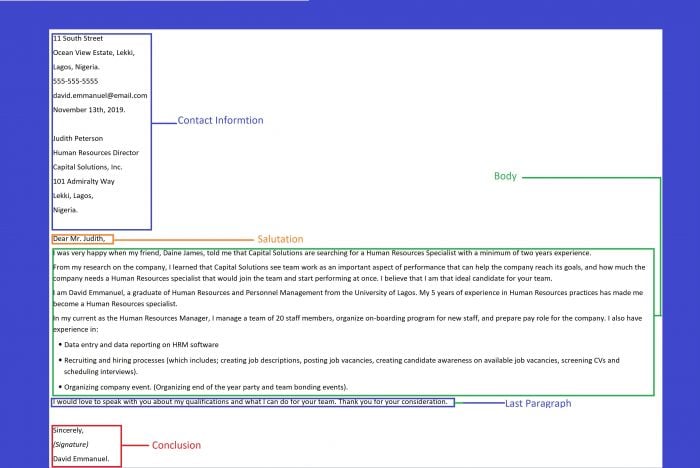
How do you write an application letter that can get you the job you desire?
Many job seekers don’t always see the reason why they should write an application letter when they are applying for a job because they feel they can just send their CVs.
Your CV indeed contains all the necessary information that the recruiter needs to know about you, but sometimes your CV alone may not be able to do the job of helping you land the job of your dreams.
Your CV may do a great job of showing that you have the skills and education required to excel in a particular position, but it may not be great at telling your prospective employer that you are the best person for the job.
This is what an application letter does for you. An application letter expresses your interest in a job and shows the employer why you are the best person for the position. Writing an application letter is one of the hidden job search hacks that help you apply for fewer jobs, but land more interviews .
If you are tired of getting rejected every time you apply for a job vacancy , then you should consider writing an application letter that will help you express your sincere interest in the job of your dreams. In this article, we will be looking at:
- What is an application letter
- Importance of an application letter
- Difference between an application letter and a resume letter
- How to write an application letter
- Application letter examples
OPTIMIZE YOUR JOB SEARCH WITH FREE CV BUILDING
What is an Application Letter?
A job application letter is a formal document that is sent to a prospective employer to express your interest in a position. An application letter is usually sent alone and not attached alongside another document.
Most times, an application letter is not sent after you must have seen an advertised position but sent whether or not a vacancy was advertised. The application letter serves a purpose that is similar to that of the CV.
Read: How to Write an Application Letter in Nigeria for a Teaching Job
When You Should Write an Application Letter.
Yes, it is true that you should write an application letter when you are interested in a job, but that is not all you consider before you decide to write an application letter.
When you see a job advert that you are interested in, you send your CV and cover letter, right? But this does not quite work for application letters. Employers will not replace the CV and cover letter with an application letter.
The approach of an application letter is different from the CV and the cover letter. You should write an application letter when the employer does not solicit your interest in the position. This simply means when there is no job advertisement or posting.
For example, if you are searching for a job and you have a list of top companies that you would love to work for, you don’t necessarily have to wait for a job posting to declare your interest in that particular job. You can simply email an application to different companies.
This is a way for you to extensively and formally introduce yourself to the prospective employer of the companies that you would love to work for.
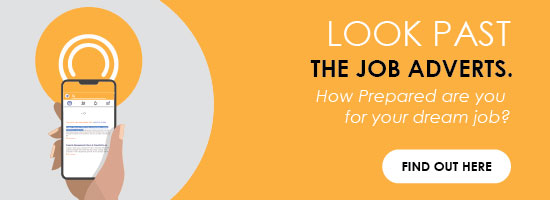
Why You Should Write an Application Letter for a Job
Just like we have discussed earlier, there are many reasons why people write application letters. If you are actively searching for a job, then this is why you should consider writing an application letter:
- It serves as a formal introduction between you and your prospective employer.
- It can help you access hidden jobs.
- It can help you to be a step ahead of other job seekers.
- It puts you in a less competitive circle in comparison with what happens when jobs are advertised with thousands of applicants showing interest.
- It can help you boycott the process of applying for a job online, and writing a resume letter because most times application letters stand alone.
Difference between a Job Application Letter and a Cover Letter
Many people use the terms application letter and resume letter interchangeably because they think that they mean the same thing. Even though the application letter and the cover letter perform almost the same function, they are different.
- An application letter is intended to stand alone, while a cover letter is usually accompanied by a CV or resume.
- A resume/cover letter will contain a brief introduction that consists of three to four sentences about the job seekers' experience, education, accomplishment and why the job seeker feels he/she is the best candidate for the job. On the other hand, an application letter may have a more extensive introduction because it is meant to stand alone just like the CV.
- An application letter often can substitute for a resume and, therefore, requires that the job seeker include specific information about her work history and professional competencies. A cover letter, on the other hand, should not contain too much information about the job seekers because it is merely an introduction to the resume.
- A cover letter is like an elevator pitch. It is intended to capture the reader's attention enough to make the recruiter or hiring manager want to review the CV.
- A cover letter is usually used by a job seeker to show interest in a job vacancy after which the job seeker will attach a detailed document (which is usually a CV). An application letter is mostly used by a job seeker to show interest in an unsolicited job.
Learn how to write a stunning cover letter now.
How to Write An Application Letter in 10 Easy Steps
These tips will guide you on how you can write an application letter:
- Write an Outline
- Write your first draft
- Use a friendly tone
- Make it concise
- Tailor the job application letter to the job specification and company requirement
- Use typed and not handwritten documents
- Use quality paper
- Write a mind blowing ending
Are you applying for a security job, but don't know how to write an application letter? Read how to write an application letter for a security job in Nigeria
1. Write an Outline : Just like you write an outline when you want to write an essay, it is also important that you write an outline when you want to write your application letter. The outline is the structure of what you want to write in your actual application letter. It is good that you make clear what you want to achieve, and all the things that you want your prospective employer to know.
An outline of your application letter will make it easy for you to write your application letter because you have the structure planned out already.
2. Write a Draft : After you must have done a structure for your application letter, then it is good for you to do a rough draft of the application letter before writing the original one.
When you are drafting your application letter, you can make use of the outline that you did earlier to serve as a guide for your application letter. At this point, you may not worry about grammatical mistakes and punctuation errors. This is to help you develop a prototype application letter.
3. Salutation : Salutation is one aspect of the application letter that is obvious. Most times that is what the employer will likely see first as soon as they open the letter. Since this is an important aspect of the application letter, you need to be careful.
It is important for you to know some tips on salutation before you start writing your application letter:
- You should put a comma at the end of your salutation
- If you are addressing more than one recipient, you should address the recipient as ‘Dear Sirs/Madams’.
- If you don’t know the name of the recipient, you should address the person as ‘Dear Sir/Madam’.
- If the recipient's gender is not known, you should address the person with the full name. Like; ‘Dear David Houston’.
4. Tone : Employers can sense your tone from the way that you write. When you are writing your application letter, you must treat the recipient with respect. Be polite and use formal language when you are writing. Be careful not to use slang or ambiguous words.
5. Be Brief : As much as you need to give your prospective employers reasons why you think you are the best person for the job, it is equally important for you to as brief as possible.
Employers are very busy and may not be able to spend time reading your application letter. Mention the purpose of your letter in the first paragraph because this is where the employer will likely look at first.
6. Tailor the letter to the job and the company : Tailoring your application to the job that you are applying for and the company will give your prospective employer the mindset that you are passionate about the job and the company.
Employers look forward to hiring people that are passionate about the job. Tailoring your application letter may be all you need to land the job of your dreams.
7. Use typed and not handwritten documents : Unless a handwritten letter is requested, you should send a typed and computer-generated document. Typing your document will help you present a well-aligned, clear, and easy to read the document.
8. Use a high quality Paper: If you are sending a hard copy application letter, make sure you use a good and quality paper. Don’t tear out a sheet of paper from your notepad and use that paper to write your application letter. If you do that, your application letter will look scrappy and rough.
9. Proof-reading : proof-reading your application letter will help you see errors that you would need to fix before you send your application letter. You can read your application letter out loud to yourself to see some errors.
Check the spellings on your application letter and punctuation errors. You can use Grammarly.com to check your spellings and edit your errors.
10. Ending your application letter : When you are sending your application letter, you should make sure that your tone matches the tone of the letter. A formal letter closing is polite, courteous, and respectful.
These are common closing that you can use to end your application letter:
- ‘Sincerely’ or your ‘faithfully’
- ‘Your Truly’
- ‘Faithfully Yours’
Application Letter Example for Any Job Vacant Position
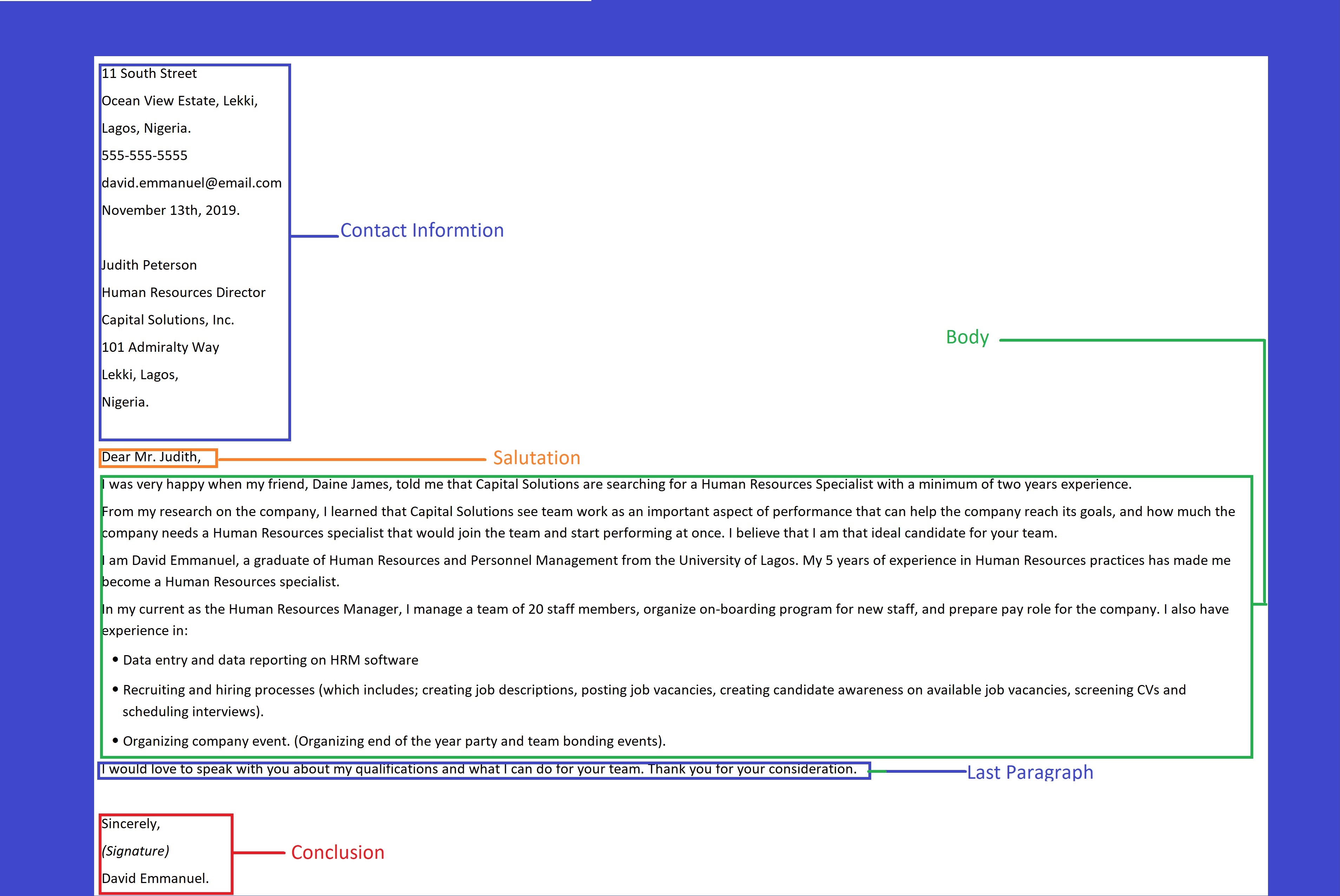
Writing an application letter can be easy and straight forward if you follow some rules. From salutation, closing, to the overall organization of your letter some rules makes your application letter appear good.
Your application letter should begin with the contact information. The contact information should include your contact and that of the employer.
The contact information should include; name, address, phone number, email, and date. If it is an email application letter, you can put your contact at the end of the letter after your signature.
The heading of your application letter includes the contact information and the salutation.
Contact information
(Your contact information)
City, State Zip Code
Phone Number
Email Address
(The employer’s contact information)
Dear Mr./Ms. Last Name,
(Salutation)
Salutation is the polite greeting that is usually at the beginning of the application after the contact information of the. The common salutation format is ‘Dear Mr./Ms’ followed by the person’s last name.
The body of the application letter
The body of your application letter lets your prospective employer know the position that you are applying for, why they should consider your application and how they would finally follow you up if they consider you for the position.
The body of your application letter is made up of different paragraphs leading up to the conclusion. Here we are going to look at the different paragraphs.
First paragraph
The first paragraph of your application letter will include information about why you are writing the letter in the first place. It is in this paragraph that you will mention the job that you are applying for and where you saw the job application.
It is in the first paragraph that you create a lasting impression on the employer. This is where you sell yourself to your prospective employer.
Second and third paragraph
The second and the third paragraph of your application letter should tell your prospective employer what you have to offer the company and what you have to offer performing the job.
These paragraphs are the most important in your application letter because this is where you have to prove to the employer that you meet the need of what the employer is looking for.
This is where you would have to share the experience, skills and accomplishments that suggest you as the best person for the job.
Remember to state how your qualification makes you the best person for the job.
Note : You should research the company and find out some information that will help you emphasize that you are the best person for the position. You can research the role that you would love to fill to find out the company’s expectation for the role, and then tailor your application in that regards.
You should also not forget to make use of specific example where possible. If you say that you are a skilled at marketing products, you should be able to give examples that would emphasize that.
Last paragraph
The last paragraph of your application letter should summarize your application letter. You should also thank your employer in this part of your application letter. You should conclude this paragraph by thanking your employer for considering you for the position.
You can also include information on how the employer or the company will follow you up.
Complimentary close
You should sign off your letter with a polite close. For example;
Signature (for a hard copy letter)
Typed Signature
Job Application Letter Example for an Experienced Job Candidate
Writing an application letter for a job may not be an easy thing to do especially when you are writing one for the first time.
Looking at an application letter example will help write your own without much stress. This application letter example will guide you to write your application letter.
David Emmanuel
11 South Street
Ocean View Estate, Lekki,
Lagos, Nigeria.
555-555-5555
November 13th, 2019.
Judith Peterson
Human Resources Director
Capital Solutions, Inc.
101 Admiralty Way
Lekki, Lagos,
Dear Mr. Judith,
I was very happy when my friend, Daine James, told me that Capital Solutions are searching for a Human Resources Specialist with a minimum of two years experience.
From my research on the company, I learned that Capital Solutions see team work as an important aspect of performance that can help the company reach its goals, and how much the company needs a Human Resources specialist that would join the team and start performing at once. I believe that I am that ideal candidate for your team.
I am David Emmanuel, a graduate of Human Resources and Personnel Management from the University of Lagos. My 5 years of experience in Human Resources practices has made me become a Human Resources specialist.
In my current as the Human Resources Manager, I manage a team of 20 staff members, organize on-boarding program for new staff, and prepare pay role for the company. I also have experience in:
- Data entry and data reporting on HRM software
- Recruiting and hiring processes (which includes; creating job descriptions, posting job vacancies, creating candidate awareness on available job vacancies, screening CVs and scheduling interviews).
- Organizing company event. (Organizing end of the year party and team bonding events).
I would love to speak with you about my qualifications and what I can do for your team. Thank you for your consideration.
(Signature)
David Emmanuel.
Job Application Letter Example for Job Candidates with No Experience
Jane Aderinsola
11 Ajayi Close,
111-333-4444
John Samuel
Dear Mr Emmanuel,
I was extremely excited when a friend mentioned the opening for the role of a customer service intern. I recently graduated from the University of Lagos, where I studied Mass Communication. I am very passionate about customer service, which is why I am excited about this position.
As a first-class graduate of Mass Communication, and as a one-time public relations officer for the students’ Union. I have learned how to effectively communicate and manage relationships with diverse people.
Asides from my graduate program, I have also taken different certificate courses and training in customer service practices and public relations. I recently attended a 2-weeks customer service training where I learned: The ethics of customer services, telephone etiquette, and I improved my written communication skills.
From my education, training and experience, I have been able to build the following skills:
· Excellent communication skills
· Good listening skills
· Improve my writing skills
· People management skills
· Interpersonal skills
· MS Office
I believe that my education, experience, and training in Mass communication and customer service practices has prepared me for this internship role.
Considering the great milestone that ABC company has achieved over time, I am certain that this company will be a great environment for me to grow my career as well as contribute to the success of the organization.
I look forward to a scheduled time where we can discuss my qualification as regards the internship.
Thank you for your consideration .
Application Letter FAQ
1: should my cv be accompanied by an application letter .
The answer is yes, your CV or résumé should always be accompanied by an application letter. It's an important self-marketing tool which you shouldn't fail to utilize.
2: How Should I Format My Application Letter?
Your application letter should be formatted the following way: ● Heading (hard copy) or Subject (Email) ● Salutation Check this post for more infomration on how to format your application letter
3: What Should I Include In My Application Letter?
Your application letter should include relevant work history and skills, the significant role you played in your previous job which matches the job you are now applying for, why you would be a good fit for the role, achievements, and any industry certifications you possess
4: How Long Should My Application Letter Be?
Typical, a cover letter should be half a page, or one full page in length. Break it into paragraphs, so that the information can be easily and quickly absorbed by the recruiter.
Having a professional application letter can help you land the job of your dreams without having to wait for years. Companies receive loads of application letters daily, but learning how to write an effective application letter can help stand out from other job seekers.
Looking to land your dream job? See 100 interview questions and answers to get you prepared for the big day.

Staff Writer
24 comment(s).

You explain it very well because your way of explanation is lovely. I am a social person, and I read many blogs from different websites. is one of them. He can also provide us with good information. I appreciate it. Keep it up.

Thank you very much Meave for your comment.

You have explained well. But what if the person doesn't have any working experience?
Thank you Ozuu for your comment. The post has been updated, so you can look at the application letter example for job seekers with no experience.
It is the section before the application letter FAQ.

thanks it has helped me

I love yr explanation but what if the person is not a graduate ,and have no experience, if the person is an ssce holder , how we the person write the application Letter

I appreciate your work,good explanation.It really helped me

I really appreciate your explanation,it was very helpful

You explained very well... Thanks so much

Thank you for your explanation but what about shs graduate

Thanks alots your explanation helps.

Thanks for your vivid insight on this subject. I actually benefited alot. Keep it up.
Best regards from;
EMMANUEL SUNDAY

Wow! Never knew that there's a difference between application letter and CV cover letter. Thanks for your explanation, was really helpful.

The lecture is very educative.

What if you are writing an application letter for a job that isn't related to your specialty.
Example, you studied banking and finance but wanting to write for a position of a human resource and you don't have any experience on that. How will you go about it?

I love this question, can someone answer this

This article is fantastic and I got some good information by reading this.

Nice comment, <a href=";>check this out also.</a>
Leave a Comment
- Beware of Job Scam: Don't Pay to Get a Job
- Indemand Jobs That Employers Find Hard to Fill in 2024
- Jobs That Will Likely Be Replaced By AI
- The Most In-Demand Jobs in Nigeria Right Now
- 2023 Job Search Report by MyJobMag
- Data Entry Work From Home Jobs
- Nursing Student Resume: Tips and Examples On How to Create One
- #Cover Letter Writing
- Top 100 Job Interview Questions and Answers
- Top Skills Employers Want in 2023
- How to Select a Suitable Recruitment Agency in Nigeria
- 100 Job Search Mistakes to Avoid in 2024
- Top Categories
- Scholarships/News
- Interview Tips
- Job Hunting
- Career Development
- Competitions
- Career Videos
- TemplateLab
- Job interview
- Letter Of Application
49 Best Letter Of Application Samples (+”How to Write” Guide)
Almost all adults have written a letter of application when applying for a job that suits their qualifications. At times, the feedbacks could be extremely frustrating and it may not even be your qualifications that come into question. If the substance of your letter of application sample is okay, then it must have been the format. Therefore, you must learn all that you can to compose an effective job application template .
Table of Contents
- 1 Letter Of Application Templates
- 2 What is a letter of application?
- 3 Letter Of Application Samples
- 4 Writing a letter of application
- 5 Application Letter Examples
- 6 Practical tips to keep in mind when writing your letter of application
- 7 Job Application Templates
Letter Of Application Templates
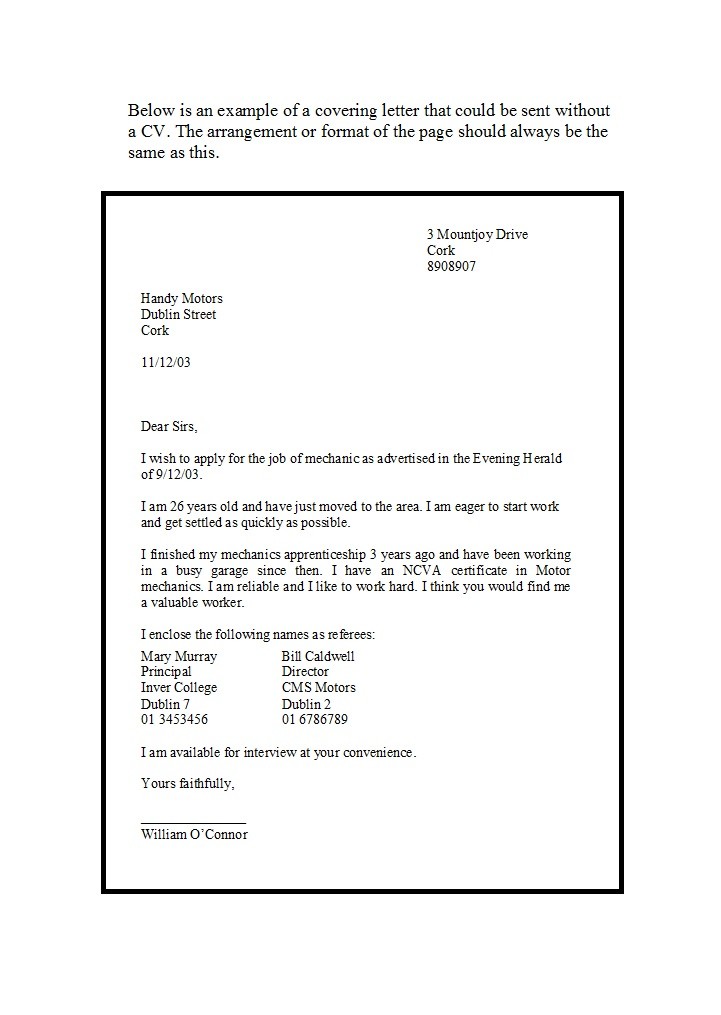
What is a letter of application?
A letter of application which is sometimes called a cover letter is a type of document that you send together with your CV or resume. It provides details about your experiences and skills. It also contains detailed information about why you consider yourself the most qualified for the job you’re applying for.
In most application letter examples, you also enumerate reasons with explanations about your interest in the position you want which requires all of your relevant skills. Letters of application inform your prospective employer about your interest in the position, what makes you a worthy contender, and why the employer should choose you.
Letter Of Application Samples
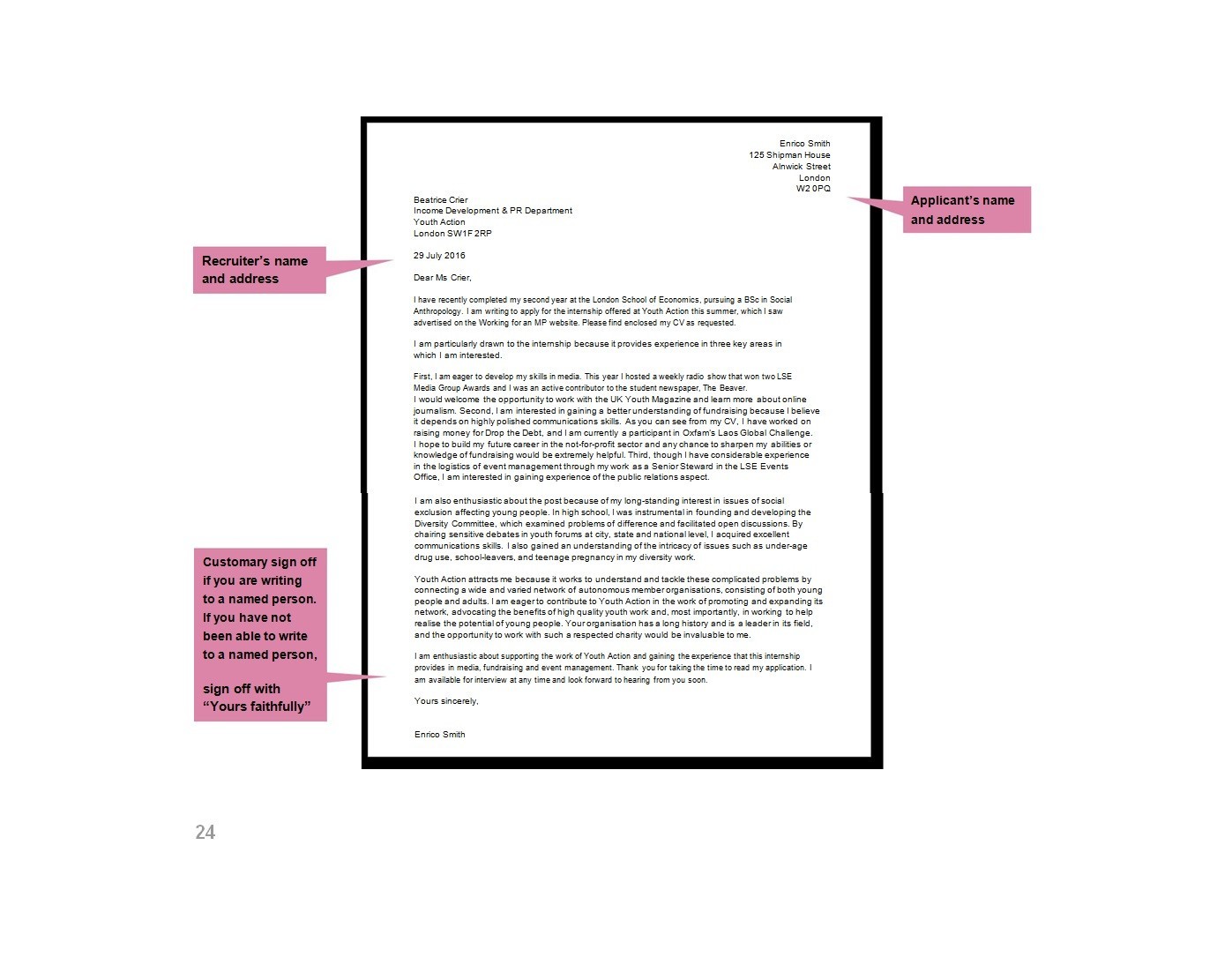
Writing a letter of application
You would compose a letter of application for a variety of purposes which are either domestic or professional. All letter of application samples are generally of the formal type and they follow some predefined format which applies to most types of application letters. It is, therefore, essential to get acquainted with the steps when writing one:
Preparation
- Get a blank sheet of paper and divide this into two columns. Indicate “Requirements” in one column and “Skills” in the other. Now read the details of the job vacancy very carefully. While doing this, familiarize yourself with the job requirements too.
- At this point, you should already have a resume which you can compare with the requirements of the job, both in terms of skill and experience. Including these major points relevant to the job provides for you the right and most significant information in your application letter format more efficiently and quickly.
- Start your job application template by including your contact details at the top. The purpose of this is to make it very easy for the prospective employer to find out exactly who you are and how to contact you. Make sure you use the correct letterhead too.
- Include the company’s information. After your contact details, you should also provide information about the company of the employer you’re applying to and this includes the name, job title, company name, and the business address. Providing these details gives the impression that you’ve taken some time to compose a customized letter of application to that company.
- Including this information also shows that you have done extra research about the hiring manager of the position you want. You can always search for the company’s website to find out the hiring manager’s name. Or as an alternative, search for the name of the department head of the department to which you’re applying. If you can’t access either name, it’s still okay to address the application letter to the company’s hiring department.
- Address the letter to the employee whom you’re writing to. Including this in your application letter format shows that you’re formal enough to begin with an official address. Never address your application letter with the words “ To Whom It May Concern .” This is very generic and informal. It also gives the impression that you didn’t do much research on the company you’re applying to.
Application Letter Examples

Writing the letter of application
- Write a compelling first paragraph. Write something that draws the interest of your reader, in this case, the hiring manager. Most application letter examples end up in the dust bin because they’re devoid of appeal. To avoid this, treat your first paragraph like a breaking news article by opening with a declarative statement.
- Inform the reader about your enthusiasm for applying for a position in the company. Demonstrate to the hiring manager about your familiarity with the company’s work and how you would perfectly fit for the position applied for.
- Mention where you discovered the information about the position you’re applying. Make some calls and research to find out if you have an acquaintance in the company. It’s always great to have a reference on the inside. Don’t hesitate to name drop, especially if the person granted you permission to do so.
- Elaborate why hiring you will benefit the employer. A job vacancy usually opens when the company has an issue which needs solving. As an applicant, it’s your job to solve this issue among other things.
- You can refer to your resume where you have enumerated your accomplishments, experiences, and skills. From this, you can use an example or two and elaborate on them. These show that you are very much qualified for the role.
- Provide a brief summary of your strengths, experience, and qualifications. The second paragraph of your letter should provide a summarized description of your experiences and abilities to demonstrate why you’re the perfect choice for the job.
- Highlight the most significant parts of your professional career. Although your most recent accomplishments would be a good place for you to start, you might have a past experience which perfectly fits the required qualifications of the job. If you need to dig deeper to prove your worth, then do so.
- Create an image of yourself which isn’t on your resume. Resumes typically depict what you’ve done during your last assignments or jobs. As an applicant, you would also want the hiring manager to see the person behind these accomplishments.
- In maybe two or three sentences, express your thoughts on how your previous company has personally made an impact on you and how this dream job application will, in one way, shape your future. Showing this human side of you proves that you are more than the facts printed on paper.
Finish up your application letter
- Create a brief summary explaining why you are the best candidate for the position in just one sentence. It’s best to end your letter with a polite reminder to your prospective employer why you’re the best applicant for the job and this gesture may earn you an interview. But do this succinctly in just one meaningful sentence.
- Provide a gentle invitation to reach out to you. Make an invitation to your reader about wanting the chance to speak more about the vacant position. It isn’t redundant to give your contact information again just for emphasis.
- Also, don’t forget to thank the hiring manager about any consideration that he will make then end the letter with a courteous statement like “looking forward to hearing from you at the earliest convenience” or something equally pleasant.
- Sign off. This step can, at times, be very frustrating, especially if you don’t know what’s considered appropriate. Using a tone that’s too formal may have a tinge of insincerity and it might not fit the overall style of the letter itself. Just be sincere without sounding offensive, period.
- Finally, after signing off, write your complete name and affix your signature. If your word processor has been set up for a signature, you may insert this underneath your name. Or you can print out the final version of your letter then affix your signature. For a letter of application sample, a signature is optional.
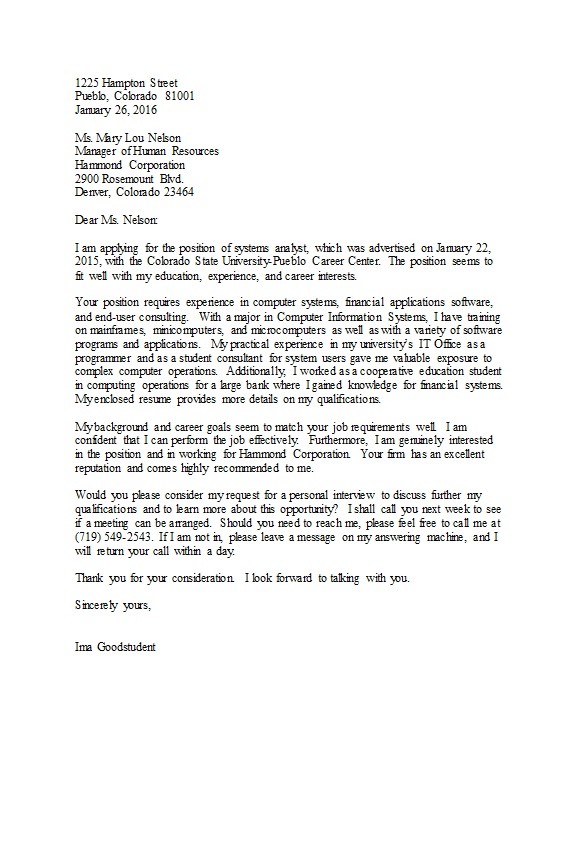
Practical tips to keep in mind when writing your letter of application
Depending on what it contains, how you prepared it, and how you formatted it, a letter of application can either make you or break you. To make sure that your application letter format will support you, consider the following tips:
- Get right to the point The first paragraph of your job application template should already state the purpose. Indicate the job you’re applying for, the name of the company, and the source of the job vacancy listing. You can mention why you’re a strong contender for the position but do so in a direct-to-the-point statement.
- Offer a variety of information Instead of being too technical, tone down your language on a more personal level, not to sound like the contents of your bullet-point resume. An anecdote about your career and work experience will do just fine. Although a resume is a must when applying for a job, the application letter should highlight relevant information which your resume cannot do.
- Make a good case for yourself The main objective of your letter of application is to land a job interview which hopefully will get you a job offer. A good application letter can achieve both goals for you. Another way to enhance your chances is by offering details regarding your experiences and job background which demonstrates why you’re a very qualified candidate. Expound on how your previous jobs have prepared you adequately for the position and what good you can do with said position and the company as well. Highlight your strengths.
- Close the letter with relevant details Don’t forget to include a note of thanks towards the end of the letter to show your appreciation for considering you for the position. Again, provide your contact details and state how you plan to follow up on your letter. This gives the impression on your genuine interest for the position.
Job Application Templates
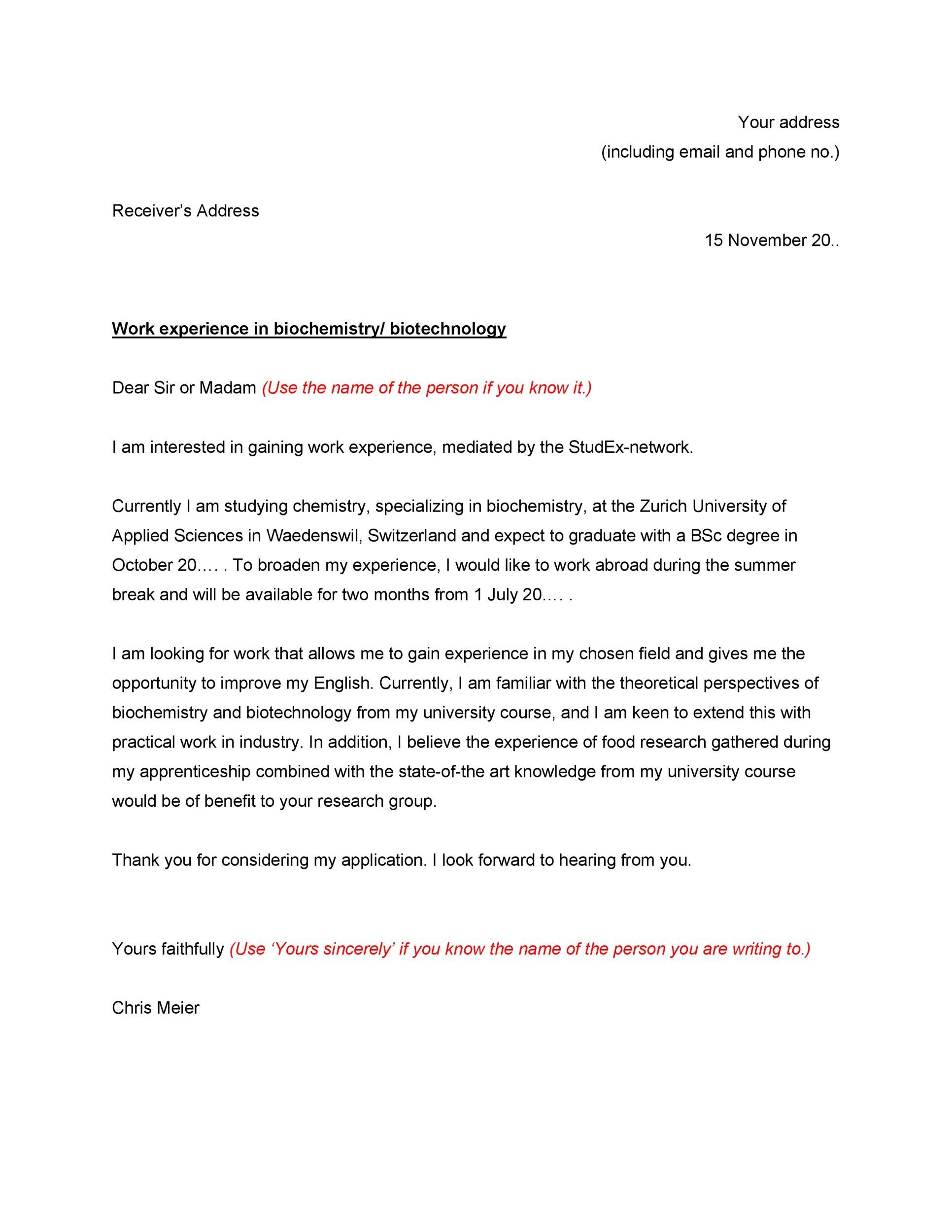
More Templates
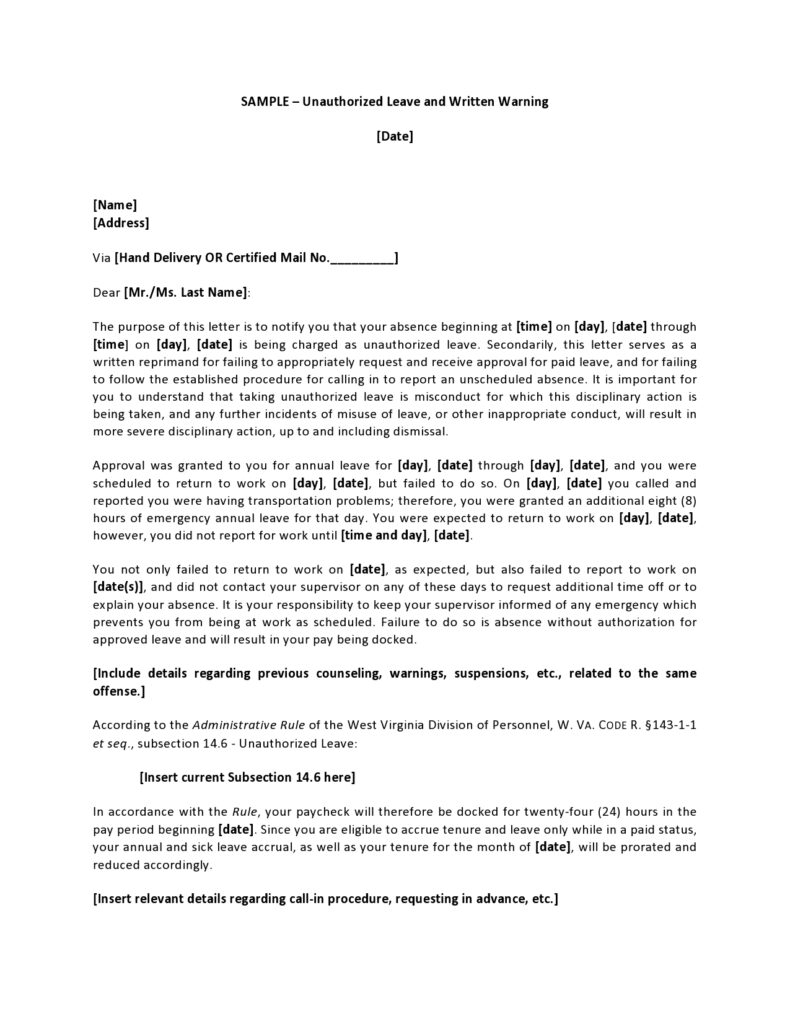
Job Abandonment Letter
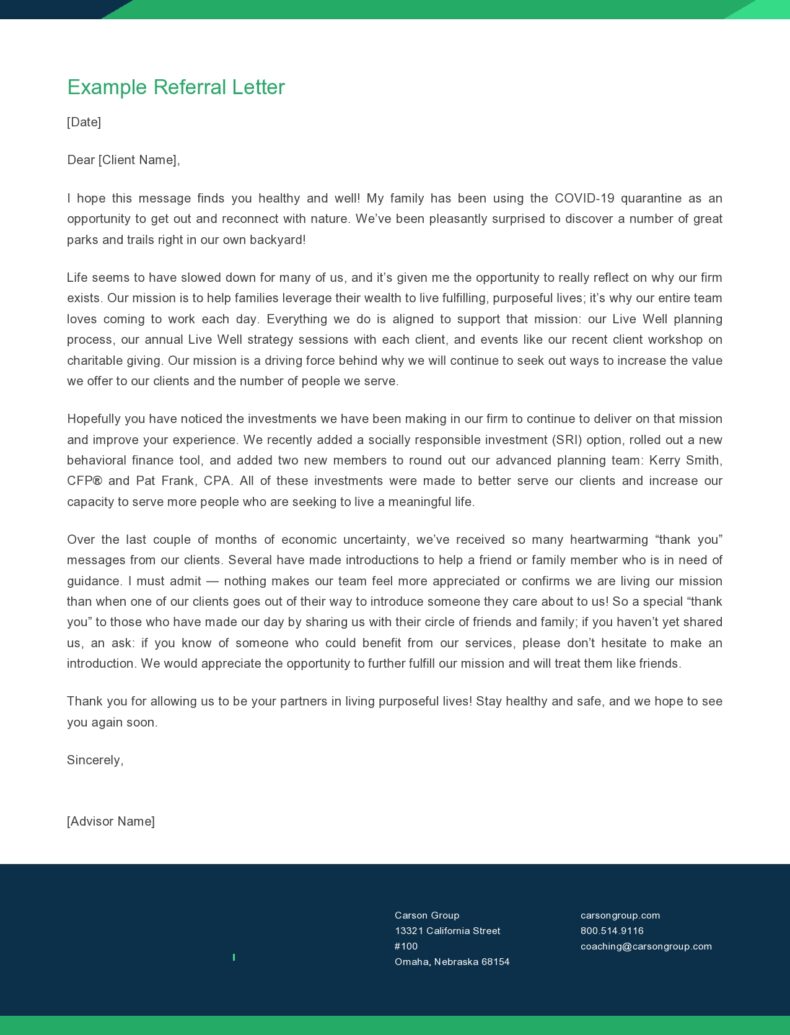
Referral Letters
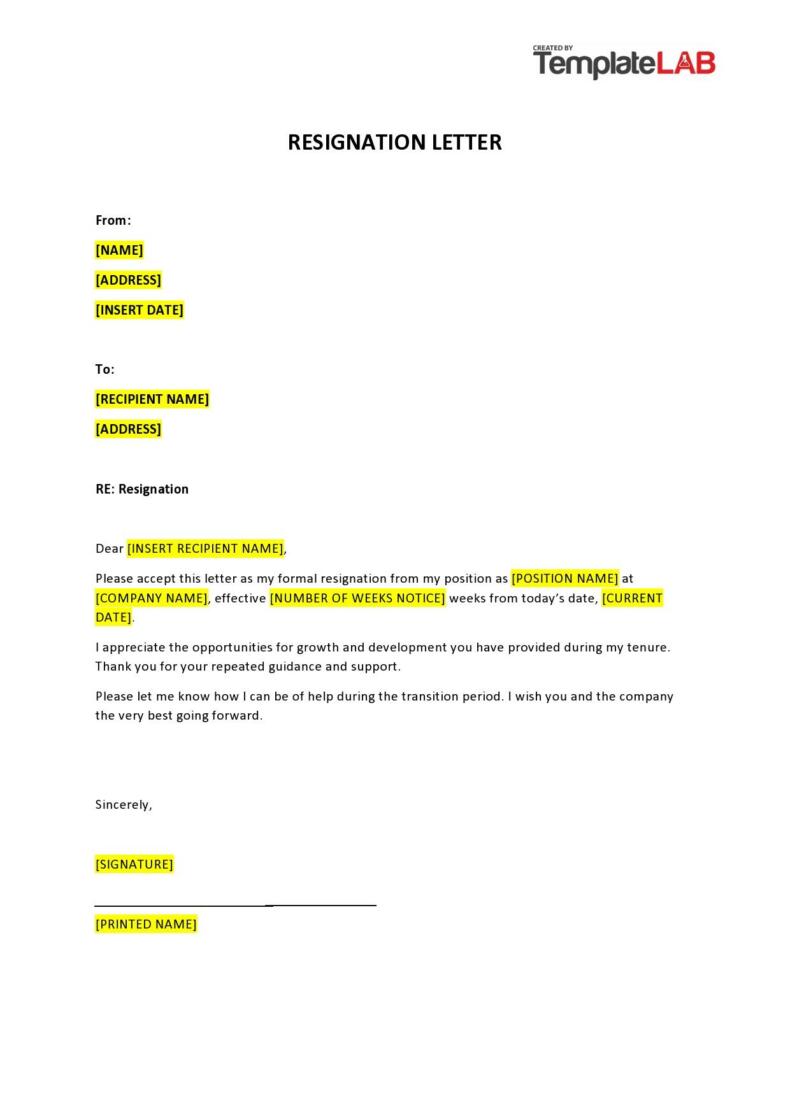
Two Weeks Notice Letters
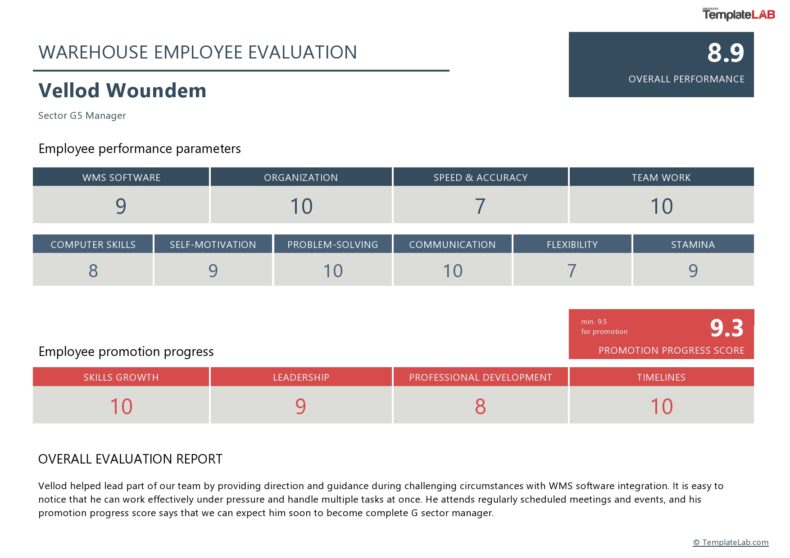
Employee Evaluation Templates
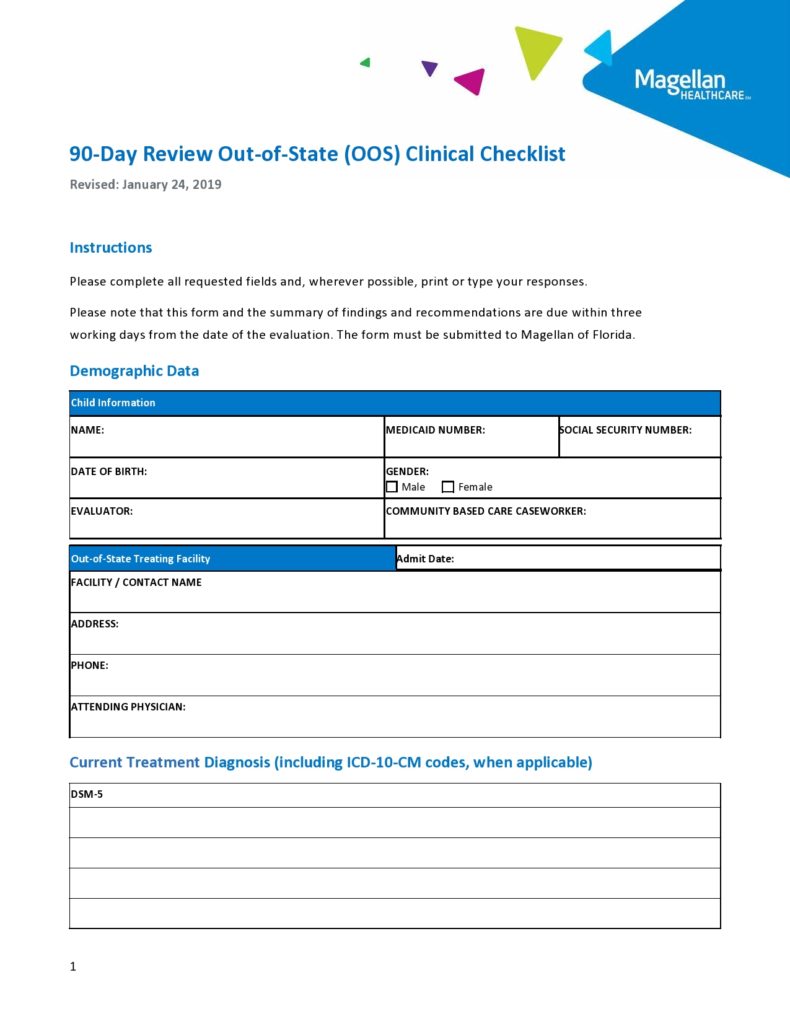
90 Day Review Templates
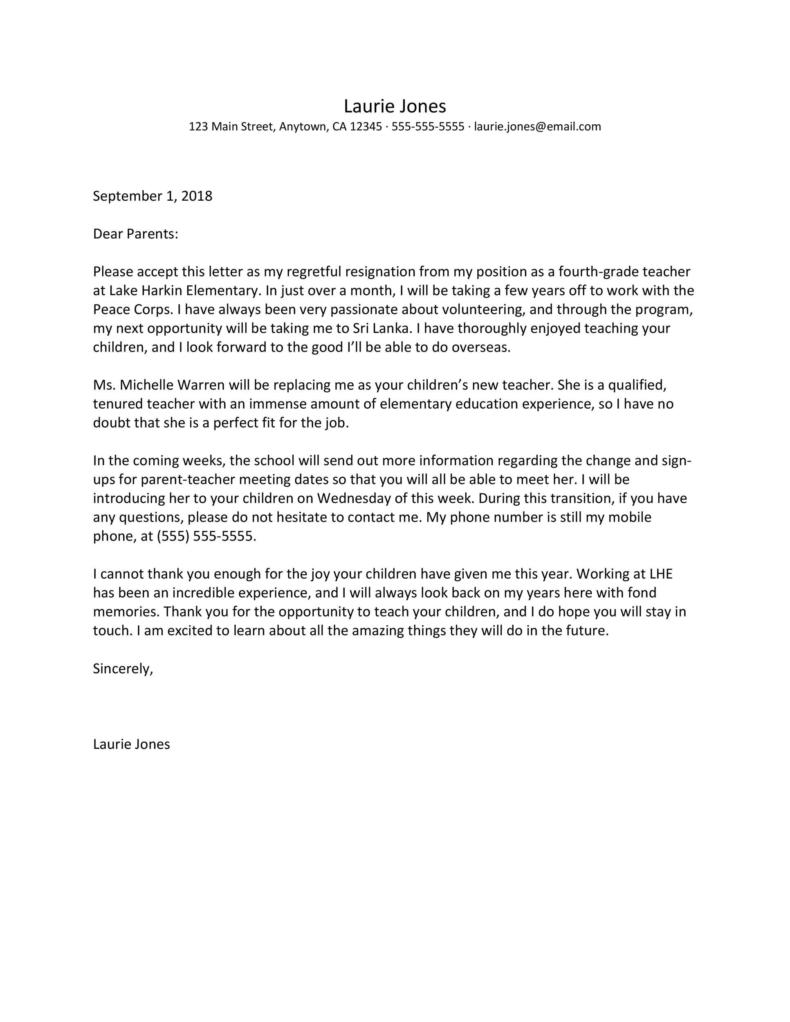
Teacher Resignation Letters
- Letter Writing
- Formal Letter Writing In English
- Job Application Letter Format
Job Application Letter Format - Check Out How to Write and Sample Letters
Are you a person who has completed their degree and is looking for a job? Have you been sending out job applications but have not heard back from the employer? If so, going through this article on job application letter writing format is what you should do now. Read through the following topics to understand the areas you are missing out on and what recruiters are looking for in a job application.
Table of Contents
Writing a job application letter – what recruiters expect.
- Formal Letter for Job Application for the Position of Cryptographer
Sample Job Application Letter for the Post of High School English Teacher
Sample job application mail template.
- FAQs on Job Application Letter Format
Every individual needs a job that pays them well so as to be able to live a comfortable life. In this competitive world, people find it really hard to get themselves placed in a good company due to the little things they thought were not that important and did not take into consideration. According to many, how you perform at the interview is all that matters, but that is not true. The employer builds an opinion about you from the very beginning. From the time you send in your job application, or your profile gets noticed on an online platform, the employer notices each and every little detail. Your job application letter is one of the first things that creates an impression about you in the eyes of the recruiter, so it is vital that you understand how to write a job application letter and draft a good one.
There are a few main aspects that recruiters look for when going through a job application letter. They try to analyse how passionate you are about taking up the particular job. Being genuine is one of the qualities that they look for in a potential candidate. How your skills and experience would add value to the company or organisation is one of the most important pointers they would be interested to know. You have got to convince the recruiter that you are the right person for the job in the way you present the job application letter.
Sample Job Application Letters for You
When you start writing your job application letter, keep in mind that a job application letter is not something casual. It has to be written in the format of a formal letter . Know how exactly you should write a job application letter by going through the sample job application letters given below.
Formal Letter of Job Application for the Position of Cryptographer
589/22, Srilakshmi Nagar Block 3
Subbanna Palya Extension
Banaswadi, Bangalore North
January 7, 2022
The HR Manager
Anton Technologies
Electronic City
Bangalore – 560012
Subject: Job application letter for the position of Cryptographer
Respected Sir,
This is with reference to the job posting on LinkedIn for the position of Cryptographer in your esteemed organisation. I have carefully read the job description. I have also browsed through your official website to understand the kind of work you do, and I am interested in working with you.
I am an MSc Electronics graduate, and I have completed multiple diploma courses in Cyber Security. I have hands-on experience of working in the field of cyber security for five years. Planning and executing various security means, analysing and documenting security systems, rebuilding and making arrangements for the safety of the security system, writing and developing security codes are some of the areas I have good experience with. I believe that I will be a good fit for the role in your company and that I can do justice to the responsibilities I will have to take up.
I have enclosed my resume and work samples for your kind review.
Thank you for your time and consideration. Hoping to hear from you.
Yours sincerely,
28 C, K K Nagar
Avarampalayam
Coimbatore – 641045
12 th January, 2022
The Principal
D A V Matriculation Higher Secondary School
Chennai – 600012
Subject: Job application letter for the post of High School English Teacher
Dear Mr. Sishir Kumar,
I am writing to you to express my interest in the job opening for the post of High School English Teacher in your prestigious institution. I have reviewed the roles and responsibilities in the job description you have posted on the Naukri employment portal dated 09/01/2022.
I am an MA English graduate. I have also completed my Masters in Education. I have a teaching experience of three years at the Indian Public School, Coimbatore. I have handled students from Class VI to X. I have experience in teaching the IGCSE syllabus. I have also been a part of the curriculum development team. I am looking for better opportunities where I can use my skills and expertise to help and mould students and their communication skills. I believe that I can do well and play a good role in providing quality education.
I have attached my resume and experience certificate for your kind perusal. Looking forward to hearing from you.
Thank you for taking the time to review my application.
LINDA RODRIGUES
Receiver’s mail id: [email protected]
Subject: Job Application for the Role of (Mention the job role you are applying for)
Respected Sir/Ma’am,
I am (Mention your full name) and I would like to apply for the role of (Job role) at your prestigious company.
I have completed my (Mention your degree) in (Mention the subject/specialisation). I have (Mention the years of experience) years of experience in the field of (Mention the field of work) at (Mention the name of your previous company). I have an in depth knowledge of the duties that I will have to perform and expertise in the particular field of work that would help me accomplish all the assigned tasks in the event of me being placed in your company.
I have enclosed herewith my resume, my detailed profile and a certificate of experience for your reference and review. I have also provided my contact information. Please feel free to contact me in case of any questions. I am looking forward to meeting with you in person for an interview.
Thank you for your time and consideration.
Your full name
Contact number : 123456
Email id: [email protected]
Frequently Asked Questions on Job Application Letter Format
How do i write an application letter for a job.
Tips to write a job application letter:
- Mention the job position you are applying for and where you found the information about the job opening.
- Introduce yourself and highlight your skills and qualifications.
- State strongly why you would be right for the job.
- Use a polite tone throughout your letter.
- Stay genuine and professional.
- End the letter on a positive note.
- Proofread the letter before you send it to the concerned hiring manager/employer.
What is a job application letter?
A job application letter is a cover letter that is written to the potential employer to provide them with information about your qualifications, skills and experience. It is sent along with your resume and other necessary documents.
How do you end a job application letter?
You can end your job application letter by thanking the employer for the time and consideration in going through your job application. You can use a complimentary closing such as ‘Yours sincerely’, ‘Sincerely’, ‘Best regards’, etc.
| ENGLISH Related Links | |

Leave a Comment Cancel reply
Your Mobile number and Email id will not be published. Required fields are marked *
Request OTP on Voice Call
Post My Comment
Register with BYJU'S & Download Free PDFs
Register with byju's & watch live videos.
Are you seeking one-on-one college counseling and/or essay support? Limited spots are now available. Click here to learn more.
How to Write a Cover Letter – Template and 9 Expert Tips
July 19, 2024
If you’re applying for a job, you’ll most likely need to prepare a polished résumé, to practice common interview questions , to request recommendations and references , and to write a cover letter. There are many types of cover letters out there. These include the application cover letter, the prospecting cover letter, and the career change cover letter. In this article, we’ll discuss the most common: the application cover letter, which is what you’ll need when trying to secure a new job (usually for a currently open position). Below, we’ll recommend how to write a cover letter (including how to end a cover letter) and provide a cover letter template to help you get started!
If you like our template and tips you may also want to view our 3 Great Cover Letter Examples for Any Job .
While we can provide a cover letter template to serve as a skeleton for your writing, you’ll need to flesh out your work with important details that are relevant to you, your experiences, and the prospective job at hand. As you begin drafting these details, it’s important to remember a few essential moves that are crucial as you learn how to write a cover letter:
1) Do your research
Before you send a cover letter to an employer, it’s imperative that you have a thorough understanding of the position you’re applying for , the job’s expectations and requirements, your future role within the hierarchy of the workplace, and the overall company culture. Knowledge of these items will help you determine which of your relevant skills and accolades you should include in your letter, the person or people to whom you should address your writing, and the tone and style of your cover letter. It will also help you decide what to leave out of your cover letter. Remember to only stick to items that are relevant to the position at hand!
2) Make particular connections
Use specificity when listing your accomplishments and describing your goals. Just as importantly, describe how you as a candidate are uniquely positioned to fill this position successfully. For instance, a general and less-connected sentence might say, “I have strong leadership skills.” But a detailed, job-specific sentence might be, “As a project manager for Waterscapes, I oversaw a team of twelve employees working on the development and implementation of River Clean Up 2024, which reduced plastic waste in our local water systems by 27%. This experience will inform my future work with your company as an Assistant Director of Eco-Initiatives.”
Think of each sentence as an opportunity to illustrate potential links between your previous work and your future career. Just like answering a “ tell me about yourself ” question in an interview, this is a moment to describe your past, present, and now your future in your hoped-for job.
How to Write a Cover Letter – Cover Letter Template (Continued)
3) add well-considered details.
Does your prospective job’s company have a strong online presence? Does your future employer have a LinkedIn profile that lists publications, affiliations, or specific awards and accolades? Do you have a personal connection with your employer or someone important at the company? If so, now is the time to utilize some of your social capital and make mention of these items. Doing so adds a personal touch and makes your cover letter more memorable. It also demonstrates your willingness to research and promote the company’s culture.
For instance, if you’re applying for a position at a language-learning app company and their motto is, “Communication for All,” this specific phrase could be used as you describe your passion for making language-learning accessible, regardless of the student’s background or income.
4) Be professional
Depending on the job for which you’re applying, your overall cover letter tone may vary. If you’re applying for a job as a copywriter for a quirky astrology start-up, you might be able to include fun details about horoscopes in your cover letter. If, on the other hand, it’s a position for a tenure-track professor job at a top research university, your tone will be much more formal and will include particulars about your contributions to the field.
Regardless of the job, you should always utilize a professional font (no Comic Sans!) and clear letterhead for readability to convey your seriousness about the position. You should also always try to convey sincerity in your writing. Additionally, make sure your reader knows you really want this job and will do your best at it if you’re hired.
5) Be confident!
Now is not the time to focus on your professional faults or limitations. Now is the time to promote yourself with abandon. Focus on your relevant work experience, your strengths, your accolades, and your willingness to learn and grow in this new job.
6) Brainstorm and draft
Do not rush your cover letter! This is a professional genre of communication that signifies your intentions to advance your career. It should be treated as a formal record of your employment history. As such, spend time cultivating your writing and trimming it so that it is rich, informative, candid and attractive.
Drafting also includes editing details like spelling and grammar checks – it has long been established that simple errors and problems with writing organization can cause employers to not take your work seriously. [i] Other small details can indicate your level of seriousness about yourself and this work. [ii] For instance, if you have a personal email address like “ [email protected] , you may want to think of creating and using a separate email address that is a little more professional, like “ [email protected] .”
7) Be direct
At all points in your cover letter, it’s essential to start with the punchline. Studies have demonstrated that readers and listeners often retain the first sentence of a paragraph or presentation before their attention starts to wane. [iii] As such, beginning with your main point and following with examples to support that point is the best way to grab your reader’s attention and ensure they fully absorb your meaning.
8) Pay attention to length
How long should a cover letter be? In most cases, a cover letter should not exceed one page of single-spaced writing (about 250 to 400 words, max). Remember that your prospective employer may be reading dozens of cover letters. He or she will probably not have the time nor inclination to read an unnecessarily long cover letter.
9) Finish on a promising note
As you consider how to end a cover letter, it’s important to focus on positivity and continuing dialogue with your prospective employer. Gesture toward future communication with closings like, “I look forward to your response,” or “I look forward to sharing more with you about my previous experience and qualifications for this position.”
Is it okay for me to use this cover letter template?
As you sit down to brainstorm how to write a cover letter, you may be wondering: How can I be original if I’m using a template? Aren’t I just copying what someone else has written? In short, the answer is: you can definitely use a cover letter template because templates are simply great starting points! You aren’t copying the content of the cover letter template. Rather, you are using the frame of the cover letter template to create your own original writing.
Templates are generative, meaning they are simply a beginning or prompt for your own writing and ideas to grow and flourish. Templates help you make writing moves you might not have otherwise considered. In the case of a cover letter template, using a model can be inspirational, helping you remember important details about your résumé and other job-related skills you may have forgotten. Finally, templates can combat writer’s block and help you organize your ideas into a coherent cover letter. Ultimately, “the aim of templates is not to stifle critical thinking but to…be direct about the key rhetorical moves” necessary for a piece of writing. [iv]
Below, you’ll find a cover letter template to get you started. Good luck!
Cover Letter Template
[ Your name ]
[ Your phone number ]
[E mail address ]
[ Optional: Your mailing address – you usually only need to include this if it’s a printed cover letter or if the employer will not be contacting you via email or phone. ]
Dear [ specific title and name of application recipient ],
As a [ your professional title ] with [ number ] years’ experience in [ field ], I am applying for the position of [ job title ]. To this position, I would bring [ highlight the 1-3 most important ways you will bring your specific skills to this job to benefit, develop, and serve the company or employer ].
[Body Paragraph 1: Using the skills you mention at the beginning of the letter, find 1-2 relevant, concrete examples from your previous work experiences to demonstrate how you’ll be a good fit for this new job ].
Because of [ skill or experience listed in first paragraph ], I can facilitate [ your company ] with [ specific requirement listed in the job description ]. Furthermore, my previous work with [ specific skill ] can additionally help [ specific job requirement ].
[Body Paragraph 2: Using the skills or experiences mentioned at the beginning of the letter, demonstrate how your current work will make you a good candidate for this job .]
In my current position as [ job title ] at [ current place of work ], I [ list specific responsibility with detail ] and am eager to continue to grow professionally at [ your company ] with [ similar work that will be required at this new job ]. At [ your company ], [ insert specific detail about the company culture, job requirements, or general news about the company ], I am eager to use my current skills as a [ insert your experience ] to help expand this work.
[Body Paragraph 3: Using the skills and experiences mentioned at the beginning of the letter, demonstrate how you hope to grow as a worker in this new position ].
I have always seen myself as a [ particular job title or responsibility ] and to be afforded the opportunity to do so at a company as prestigious as [ company name ], will let me develop [ specific professional skills ] while promoting the company’s mission to [ include part of the company’s mission ].
I am available to answer any questions you may have about my résumé or previous work experiences. Please don’t hesitate to reach out. Thank you so much for your time and consideration. I look forward to your response.
[ Your Name ]
How to Write a Cover Letter with Template – Works Cited
- [i] McDowell, Earl E. “Perceptions of the Ideal Cover Letter and Ideal Resume,” Journal of Technical Writing and Communication. Volume 17, Issue 2, April 1987.
- [ii] Martin-Lacroux, Christelle, and Alain Lacroux. “Do Employers Forgive Bad Spelling in Resumes?” Business and Professional Communication Quarterly, Volume 80, Issue 3. 26 October 2016.
- [iii] Garner, Joanna K. and Michael P. Alley. “How the design of presentation slides affects audience comprehension: A case for the assertion-evidence approach,” International Journal of Engineering Education . Vol. 29, Issue 6, 2013.
- [iv] Graff, Gerard, and Cathy Birkenstein. They Say / I Say: The Moves That Matter in Academic Writing . W.W. Norton & Company, New York, 2006.
How to Write a Cover Letter with Template – Additional Resources
- How to Send a Condolence Message for a Coworker (with Samples)
- 25 High Paying Work from Home Jobs
- How to Tell Your Boss You’re Quitting
- How to Answer “Tell Me About Yourself” with Examples
- Resignation Letter Samples
- 25 Job Interview Questions and Answers
Jamie Smith
For the past decade, Jamie has taught writing and English literature at several universities, including Boston College, the University of Pittsburgh, and Carnegie Mellon University. She earned a Ph.D. in English from Carnegie Mellon, where she currently teaches courses and conducts research on composition, public writing, and British literature.
- 2-Year Colleges
- Application Strategies
- Best Colleges by Major
- Best Colleges by State
- Big Picture
- Career & Personality Assessment
- College Essay
- College Search/Knowledge
- College Success
- Costs & Financial Aid
- Data Visualizations
- Dental School Admissions
- Extracurricular Activities
- Graduate School Admissions
- High School Success
- High Schools
- Homeschool Resources
- Law School Admissions
- Medical School Admissions
- Navigating the Admissions Process
- Online Learning
- Outdoor Adventure
- Private High School Spotlight
- Research Programs
- Summer Program Spotlight
- Summer Programs
- Teacher Tools
- Test Prep Provider Spotlight
“Innovative and invaluable…use this book as your college lifeline.”
— Lynn O'Shaughnessy
Nationally Recognized College Expert
College Planning in Your Inbox
Join our information-packed monthly newsletter.
How to Write a Cover Letter for College Application (Free Template
Crafting a compelling college application cover letter is crucial yet challenging. It’s a single-page document that can set you apart from thousands of applicants. Learn how to highlight your academic achievements, extracurricular activities, and community service to make your application stand out.
Written by:
Dr. Moina Rauf
Dr. Moina Rauf, fluent in English and Dutch, is a distinguished writer and editor with a PhD in Economics and a Bachelor’s degree in English Literature and Economics. With extensive experience in both academia and industry, she excels in elucidating complex concepts about business management, human resources policies, legal documentation, employee leaves, appointments, contracts, and workplace culture. Her proficiency in analyzing and simplifying intricate documents ensures comprehensive understanding for her audience. Published in academic journals, Dr. Rauf’s authority in her field is well-established.
Writing a great college application cover letter can be one of the most challenging prose pages that one has to put together in their high school career. On the one hand, it is just a simple single-page document, but on the other, how do you talk about the things you need to talk about without boring the reader? A well-written cover letter will give you an edge among the thousands of applicants sending in their applications for the same college. The letter should highlight your academic achievements, extracurricular, athletic, and community service achievements that will help you stand out during the highly competitive selection process.
- What is a College Application Cover Letter?
A college application cover letter is a written document submitted during the college admission process. It allows applicants to introduce themselves, share personal experiences, and explain why they are a strong fit for a particular college or university. The letter provides a more qualitative perspective beyond academic achievements and test scores, giving applicants an opportunity to showcase their personality, goals, and unique qualities.
- How to Write a Great Cover Letter for Your College Application
Writing a cover letter, also known as a personal statement or statement of purpose, is a crucial step in the admissions process. Here’s a step-by-step guide on how to write an effective college application cover letter:
Understand the Requirements
Review the application guidelines provided by the college. Understand the word limit, formatting requirements, and any specific prompts or questions they want you to address.
Start with a Strong Introduction
Craft an engaging opening that captures the reader’s attention. This could be a personal anecdote, a relevant quote, or a thought-provoking question. Make it clear why you are passionate about your chosen field of study.
Provide Personal Background
Share relevant personal details, such as your name, where you’re from, and any unique aspects of your background that have influenced your academic journey.
Highlight Academic Achievements
Showcase your academic accomplishments, including your GPA, standardized test scores, and any honors or awards you’ve received. Discuss specific courses or projects that have contributed to your academic growth.
Discuss Extracurricular Activities
Detail your involvement in clubs, sports, or organizations. Highlight any leadership roles, responsibilities, or significant contributions you’ve made. Connect these activities to your personal and academic development.
Express Your Passions and Interests
Share your hobbies, interests, and passions outside of academics. Demonstrate how these aspects contribute to your well-rounded nature and connect to your chosen field of study.
Outline Your Career Goals
Clearly articulate your short-term and long-term career goals. Explain how the college’s programs and resources will help you achieve these goals. Show a thoughtful and informed approach to your future plans.
Explain Why You Chose This College
Discuss why you are specifically interested in attending this college. Mention particular programs, professors, or resources that align with your academic and personal objectives.
Address Challenges and Overcoming Adversity
If applicable, briefly discuss any challenges you’ve faced and how you’ve overcome them. Highlight your resilience and determination in the face of adversity.
Summarize in the Conclusion
Summarize key points in the conclusion and restate your enthusiasm for joining the college. End with a strong closing statement that leaves a positive impression.
Proofread and Revise
Carefully proofread your letter for grammatical errors, clarity, and coherence. Consider seeking feedback from teachers, mentors, or peers to gain different perspectives.
- Free Cover Letter Template
[Your Full Name]
[Your Address]
[City, State, ZIP Code]
[Email Address]
[Phone Number]
[College Admissions Committee]
[College Name]
[College Address]
Dear [Admissions Committee or Specific Individual],
I am writing to express my sincere interest in applying for admission to [College Name] as a prospective student in the [Intended Program/Major]. With a passion for [Your Chosen Field] and a commitment to academic excellence, I am excited about the prospect of contributing to and benefiting from the vibrant community at [College Name].
Allow me to introduce myself. My name is [Your Full Name], and I hail from [Your Hometown]. Currently enrolled at [Your Current Educational Institution], I come from a [Brief Description of Family Background] that has instilled in me the values of [Values]. These values have been instrumental in shaping my academic journey.
Throughout my academic career, I have consistently demonstrated a commitment to excellence. My [GPA/Standardized Test Scores] reflect my dedication to achieving academic milestones. I have also engaged in [Relevant Courses/Projects] that have deepened my understanding of [Your Chosen Field].
Beyond the classroom, I have actively participated in [Clubs/Sports] and undertaken leadership roles in [Specific Clubs or Organizations]. These experiences have not only honed my leadership and teamwork skills but have also allowed me to make meaningful contributions to my school community.
In addition to my academic pursuits, I am a dedicated [Hobbies/Interests]. This multifaceted approach to life reflects my belief in the importance of a well-rounded education.
My short-term and long-term goals include [Your Career Aspirations], and I believe that [College Name] is the ideal environment to nurture my ambitions. The [Programs/Resources] offered align perfectly with my aspirations, and I am eager to immerse myself in the rich academic environment at [College Name].
Upon extensive research, it became evident that [College Name] stands out for its [Highlight Specific Programs/Resources]. I am particularly drawn to [Professor’s Name] work in [Specific Area], and I am excited about the opportunity to learn from and collaborate with such esteemed faculty members.
In facing challenges such as [Briefly Mention Challenges], I have cultivated resilience and determination. These experiences have not deterred me but, instead, have strengthened my resolve to succeed in the face of adversity.
In conclusion, I am enthusiastic about the prospect of contributing to the [College Name] community and believe that my unique background and experiences make me a strong candidate for admission. I look forward to the opportunity to further discuss my application in an interview.
Thank you for considering my application. I appreciate your time and attention to my candidacy.
[Your Signature]
Practical Users
The template provided is useful for prospective students applying to undergraduate or graduate programs. Its utility lies in its adaptability, as it can be customized to suit the individual’s unique experiences, educational background, and aspirations. The template provides a structured format, saving time for applicants who may be applying to several institutions. By inserting their personal details and customizing the content, applicants can efficiently create tailored letters for different colleges without starting from scratch each time.
Key Components
- Personalization is crucial in a college application cover letter. By providing placeholders such as “[Your Full Name],” “[Your Address],” “[Your Hometown],” and “[Your Current Educational Institution],” the template ensures that the applicant can easily insert their specific details. This personalization makes the letter feel more genuine and tailored to the individual’s unique background.
- Mentioning specific details about the chosen program and the college demonstrates that the applicant has done thorough research. Placeholders like “[Intended Program/Major]” and “[College Name]” allow the applicant to customize the letter for each application. This adaptability ensures that the letter feels relevant and targeted to the specific institution.
- Academic achievements and career goals are central to the letter. Placeholders like “[GPA/Standardized Test Scores],” “[Relevant Courses/Projects],” and “[Your Career Aspirations]” allow the applicant to showcase their unique academic strengths and aspirations. This flexibility ensures that the letter effectively communicates the applicant’s academic profile and future plans.
- Extracurricular activities provide insights into the applicant’s character. Placeholders like “[Clubs/Sports]” and “[Specific Clubs or Organizations]” allow the applicant to insert details about their involvement and leadership roles. This customization ensures that the letter reflects the breadth of the applicant’s experiences beyond academics.
- Demonstrating a genuine interest in the college is vital. Placeholders like “[Highlight Specific Programs/Resources]” and “[Professor’s Name]” allow the applicant to specify what aspects of the college attracted them. This customization ensures that the letter convincingly communicates the applicant’s alignment with the college’s values and offerings.
- Sharing challenges and how they were overcome adds depth to the application. Placeholders like “[Briefly Mention Challenges]” allow the applicant to insert specific details about their resilience. This adaptability ensures that the letter authentically communicates the applicant’s ability to overcome obstacles.
- Maintaining a formal tone and including proper salutations and closings is essential in professional communication. Placeholders like “[Admissions Committee or Specific Individual]” and “[Your Signature]” ensure that the letter adheres to formal conventions while still allowing for personalization.
Craft an engaging opening statement that reflects your personality. Consider using a relevant anecdote, a thought-provoking question, or a personal reflection. Address the admissions committee or specific individuals if their names are known.
- Sample Cover Letter
Dear Admissions Committee,
I am writing to express my enthusiastic interest in applying for admission to Elite University as a prospective student in the Computer Science program. With a fervent passion for technology and a commitment to academic excellence, I am eager to contribute to and benefit from the esteemed community at Elite University.
From the earliest days of my academic journey, the realm of computer science has captivated my imagination. As an aspiring computer scientist, the opportunity to apply for admission to Elite University is a dream come true. Allow me to introduce myself. My name is Alexander Greene, and I hail from the vibrant city of Technoville, where innovation and technology intersect.
Coming from a family of engineers, I have been immersed in a culture that values analytical thinking and problem-solving. My parents, both accomplished software engineers, have instilled in me the importance of creativity and perseverance in the face of complex challenges. Their influence has been pivotal in shaping my interest in computer science.
Throughout my high school years at Technoville High, I have consistently demonstrated a dedication to academic excellence. With a current GPA of 4.0 and outstanding scores on standardized tests, I have sought to challenge myself by enrolling in advanced placement courses, particularly those in mathematics and computer science.
My academic journey has been complemented by hands-on experiences, including a notable project where I developed a mobile application to assist local businesses in managing inventory. This project not only honed my coding skills but also instilled in me a deep appreciation for the practical applications of technology.
Beyond the classroom, I have actively participated in various clubs and organizations that have further fueled my passion for computer science. As the president of the Technoville Coding Club, I initiated coding workshops for local high school students, fostering a community of young tech enthusiasts.
Additionally, my role as the captain of the Technoville Robotics Team allowed me to merge theoretical knowledge with practical problem-solving. Leading the team to victory in regional competitions highlighted my leadership abilities and reinforced my commitment to collaborative innovation.
In addition to my academic pursuits, I am an avid participant in hackathons and coding competitions, where I continually seek to expand my knowledge and skills. My interest in ethical hacking has led me to explore the intersection of cybersecurity and artificial intelligence, and I am excited about the potential of these fields to shape our technological future.
My short-term goal is to pursue a degree in computer science at Elite University, where I aim to immerse myself in cutting-edge research and collaborative projects. Long-term, I aspire to contribute to the development of innovative technologies that address real-world challenges, particularly in the field of artificial intelligence.
My decision to apply to Elite University is grounded in the institution’s renowned Computer Science program and its commitment to fostering a dynamic learning environment. The opportunity to learn from distinguished professors, such as Dr. Cynthia Innovator, whose work in artificial intelligence aligns with my interests, is particularly enticing.
Furthermore, Elite University’s emphasis on hands-on research, its state-of-the-art facilities, and the vibrant tech community on campus are precisely what I seek to propel my academic and professional journey forward.
In facing challenges such as navigating a demanding academic curriculum while actively contributing to extracurricular activities, I have cultivated resilience and time management skills. These experiences have not deterred me but, instead, have fueled my determination to excel in the face of adversity.
In conclusion, my passion for computer science, combined with my academic achievements and hands-on experiences, makes me a strong candidate for admission to Elite University. I am confident that my contributions to the university community will extend beyond the classroom, enriching the collaborative spirit that defines Elite University.
Thank you for considering my application. I look forward to the opportunity to further discuss how my unique background and aspirations align with the vision of Elite University.
Alexander Greene
[Signature]
The sample letter provided is useful as it effectively integrates key elements, including an engaging introduction, a comprehensive overview of the applicant’s academic and extracurricular achievements, and a clear alignment with the specific college’s offerings. The letter is personalized, demonstrating a genuine interest in the institution, and maintains a formal tone throughout. Furthermore, it showcases the applicant’s unique qualities and ambitions, contributing to a compelling and well-rounded application.
- The letter by Alexander Greene begins with an engaging introduction that immediately captures the reader’s attention. This is important for making a positive first impression and encouraging the admissions committee to continue reading.
- The inclusion of the personal background by the writer provides context to their journey, linking family influences and values to their interest in computer science. This adds depth and helps the admissions committee understand the applicant’s motivations.
- Academic achievements, including GPA and standardized test scores, are highlighted by Alexander Greene, showcasing his commitment to excellence. The mention of advanced placement courses and a hands-on project demonstrates a well-rounded approach to education.
- Alexander’s involvement in coding clubs, robotics, and leadership roles emphasizes not only academic prowess but also teamwork and leadership skills. This section illustrates a holistic engagement with the subject beyond the classroom.
- Detailing participation in hackathons and coding competitions shows a genuine passion for computer science. The exploration of ethical hacking and the intersection of AI and cybersecurity adds specificity and uniqueness to Alexander’s profile.
- The articulation of short-term and long-term career goals is beneficial for demonstrating a clear vision. Linking these goals to the desire for a degree at Elite University helps align Alexander’s aspirations with the institution’s offerings.
- The writer provides specific reasons for choosing Elite University, including renowned professors and a commitment to hands-on research. This demonstrates that he has thoroughly researched the institution and understands how it uniquely fits its academic and professional objectives.
- Mentioning challenges faced and overcome adds a human element to the application. It showcases resilience and the ability to manage demanding situations, contributing to Alexander’s overall character.
- The conclusion effectively summarizes key points and reinforces Alexander Greene’s enthusiasm for joining Elite University. It leaves a positive and lasting impression on the reader.
- Downloadables

- Tips for writing an effective letter
Regardless of the recommended length, your college application cover letter should show evidence that you performed due diligence concerning the selected college. You don’t want to include any irrelevant information that you “think” should be included. Conduct your research and lay down the facts. You can visit the college website and look at local news to find out what is happening on campus.
Sound structure
An application letter should be both formal and professional. Structure your application letter in business letter format and include your contact information, your name, title, date, and address of the recipient. Also, make sure to use a proper salutation, e.g., “Dear Application Committee,” Alternately, if you already have their name and title, you can use “Dear (their last name).”
Even cover letters, although formal, can showcase a person’s personality, passion, and sense of humor. Just as college application essays are meant to add color to the applicant’s back and white representation, so too can the college application cover letter tell a little more about the applicant. Choosing a single area from your application on which to expound tells the recipient what you consider important.
College Connection
When writing your application, you should highlight how you see yourself fitting in on the college campus. Legacy students may speak to their family’s pride in their family’s rich history at the college. Others with political affiliations might refer to their intentions of becoming active student leaders. Athletes might talk about their previous high school success and how they expect to contribute to their college teams.
In the race to get into your dream college, every student wants to be noticed among the flood of application letters. With so many pouring in daily, writing a really good letter is your way to get a competitive advantage. Our collection of college application cover letter templates, some free and some with added features, is simple and special. They make your application look impressive. Pick and get these templates to make your writing better and ensure you stand out in the crowd.
Remember, your cover letter is more than just a summary of your grades or a request for your resume. It’s like a cover letter, introducing you and giving a little peek into how well you fit with the college. Writing with care is super important. Don’t send in a letter that’s not fully developed and still expects to stand out. Take your time to carefully write a letter that shows off your unique qualities. As you step into this journey, we wish you the best of luck with your college application process.
Table of Contents
Related Articles

A Gift Affidavit is a legal document that formally declares a gift's transfer from one person to another without any expectation of compensation. Utilizing Gift Affidavit templates ensures that all necessary legal elements are included, simplifies the drafting process, and provides a consistent and professional format, thereby reducing the risk of errors and ensuring the document's validity.
An Affidavit of Death is a legal document used to declare the death of an individual, often required for settling estates or claiming benefits. Using an Affidavit of Death form template simplifies this process by providing a standardized format for the necessary information.
A Medical Records Release Form is a document used to authorize the transfer of a patient's medical records from one healthcare provider to another. Using a medical records release form template ensures a consistent and legally compliant format, simplifying the process for both patients and healthcare providers.

Creating a personal mission statement is an exercise in self-discovery and goal-setting. It encapsulates your core values, aspirations, and guiding principles, providing a framework for aligning your actions with your priorities. This reflective process enhances self-awareness and helps articulate your vision for the future.

Writing a personalized apology letter is one of the most effective ways to clear your conscience and mend relationships. While it can be a challenging task for some, mastering the art of saying sorry is crucial both in personal and professional life.

A grant proposal is a detailed request for funding, typically aimed at supporting projects or research. Using a grant proposal template streamlines the application process, ensuring all essential information is organized and presented effectively.
License Agreement
© WordLayouts 2024
Connect with us
Empowering individuals and businesses around the world by offering a diverse portfolio of professional document templates. At WordLayouts, we envision a future where high-quality documentation is accessible, adaptable, and absolutely free, breaking barriers and fostering innovation in every endeavor.
Protect your data
This site uses cookies and related technologies for site operation, and analytics as described in our Privacy Policy . You may choose to consent to our use of these technologies, reject non-essential technologies, or further manage your preferences.
- Career Advice
- What to Say When Emailing a...
What to Say When Emailing a Resume (with Examples)
10 min read · Updated on June 12, 2024

Introduce yourself professionally when you email your resume
You've written the perfect resume and tailored it to the role you're aspiring to. What should you do next? A few years back, you'd have printed it off on some quality paper, addressed an envelope in your best handwriting, posted it off, and settled in to wait for a response. These days, though, it's more common to email your resume. It's faster, it's more professional, and it's easier to share a file than a printout.
But if you're going to email your resume, what should you say? Should you attach a cover letter? How much detail should you include?
So many questions!
But fear not, TopResume is here to help you decide what to say when emailing a resume, and we have answers to all these questions and more. Settle in as we guide you through it.
Should I email my resume?
Yes! It's absolutely fine to email your resume when you apply for a job. In fact, it's usually preferred to printed correspondence these days. Of course, the most important point is that you should follow the instructions on the job posting. If it requests a printed resume or a resume uploaded via an online portal, you should definitely apply in line with those instructions. However, if there are no specific instructions, an email application is advisable. Just make sure you're addressing it to the right person!
General rules for emailing your resume
Before we get into the specifics, let's refresh on some general guidelines for emailing your resume to a company. After all, first impressions count, so using proper email etiquette is important.
Use a professional email address. “ HotLips69@...” may have seemed cool and funny when you set up the account, but does it really convey that you're a credible professional? If necessary, set up a new email account to use for job applications – and remember to check it regularly for responses!
Add a clear subject line. Make the point of your email clear with a logical subject line – you could include the job title of the vacancy you're applying for, for example, or refer to the fact that the email is a job application or resume.
Choose a professional greeting. Think “Dear [name],” or even just “[name],” rather than “Hiya” or “Greetings.” While email is less formal than a letter, you still need to keep the tone professional.
Be concise. Short, snappy paragraphs are easier to read on a screen, and no one wants to trudge through pages of waffle to find the information they need. Respect the reader's time by keeping it simple.
Add a formal sign-off. A version of “thank you” and your name is sufficient – you may also want to add your professional title, a contact number, and a link to your portfolio if you have one.
Don't forget the attachments! Make sure that you've actually attached your resume (and your cover letter, if required). Ensure they have sensible file names, too: “Jay Miller – Resume” or “J Miller – Sales Executive Resume” is more professional and easier to retrieve than something like “JM 010224 v3” or simply “Resume.” Also, double-check the file type that you're sending – check out our article Word vs PDF if you're not sure.
What to say when emailing your resume – the detail
So now we've reviewed the basics of email etiquette, let's get down to business. You need to know what to say when emailing a resume. Well, the exact wording will vary depending on the situation, the role, and your personality, but you'll certainly need to include the following:
Why you're emailing
Your reader may have a ton of open vacancies and is likely to receive many resumes for each one. Make their life easier by clearly stating the role you're interested in applying for. If you have a reference number for the vacancy, you can include that too.
Your elevator pitch
Briefly explain who you are , what you do, and why you're the right person for the open role. This doesn't need to take up a lot of space or be very detailed – the key thing here is to be convincing enough for them to want to open your resume document to find out more. Include whatever information is most pertinent to the role – that could be your academic qualifications, your industry experience, awards and accolades, or particular skills. Refer to the job posting to find out what the company wants to see in a successful candidate and ensure the requirements are reflected in your email.
A call to action
Encourage the reader to open your resume, reach out with further questions, or schedule an interview. This one little line can show your enthusiasm for the role, emphasize your professionalism, and prompt your reader to take the next step in progressing your application.
What to say when emailing a resume – sample messages
Do you need a bit more inspiration to craft your message? Take a look at these sample emails and use them as a frame for your own resume email. Remember, the job advert is your cheat sheet when it comes to deciding what details to prioritize here.
What to say when cold emailing a resume
To: Katie French
From: Matthew Cole
Subject: Sales resume
I've long admired XYZ Inc. as a leading supplier of home tech solutions and have heard many positive reviews about your company as an employer. To that end, I am attaching my resume in the event that a sales vacancy may soon arise.
As you can see, I have enjoyed a successful 10-year career in technology sales and am a committed user and advocate of your products. This year, I am on track to exceed my sales target by 46%. I would bring an extensive network of industry contacts and a proven ability to motivate sales teams to surpass expectations.
If there are no suitable vacancies at the moment, please feel free to keep my resume on file for future reference. I look forward to hearing from you soon.
Matthew Cole
Sales Manager, Acme Products
What to say when emailing a resume in response to a job posting
Subject: Sales Executive vacancy (Ref: ABC123)
In response to your advertisement for a Sales Executive, I am attaching my resume. As you can see, I combine eight years of sales experience with a degree in Marketing and three awards for excellence in sales roles.
The advertised role is particularly interesting to me, as it will allow me to leverage my expertise in technical sales, provide the opportunity for international growth, and establish trusted relationships with your clients to open new avenues for revenue and increased sales.
Please don't hesitate to reach out to me if you have any questions; I look forward to discussing my suitability further with you at an interview.Thank you for your consideration,
Sales Executive, Acme Products
What to say when emailing a resume to a recruiter
Subject: Healthcare Roles
Dear Katie,
I saw on JobBoard.com that you are recruiting for several healthcare roles, and would like to submit my resume for your consideration. I combine 10 years' experience as a Healthcare Assistant with numerous industry certifications and consistently receive positive patient feedback.
I look forward to hearing from you,
What to say when emailing a resume to follow up on a conversation
Subject: Finance Manager follow-up
Following our phone discussion earlier today, I would like to reiterate my interest in the Finance Manager position and attach my resume for your consideration.
As you can see, I am currently fulfilling the Finance Manager role at XYZ Company and am looking forward to developing my career within a global organization. I have a master's degree in Business Administration, as well as extensive experience in managing the finance function within a security business. I look forward to bringing my leadership skills to your team of finance experts.
Please reach out to me at 555-555-5555 when you have had a chance to review my attached resume.Regards,
Finance Manager, XYZ Company
What to say when emailing a resume following a referral
Subject: Events Manager vacancy
Dear Ms French,
Please find attached my resume. I have been referred to the Events Manager position by one of your colleagues, John Day, who I previously worked with at ABC Inc. Having delivered many successful events with John as my manager, I'm flattered that he has now asked me to apply for your open role.
I've recently delivered a conference for 800 international delegates and a team building event for 5 national teams, both of which were very well received and were completed within challenging budgets. I am confident that I can bring a similar level of client satisfaction to DEF Inc. and look forward to discussing the position further with you.
Please don't hesitate to get in touch to schedule an interview at your convenience,
555-555-5555
Should you attach a cover letter when emailing a resume?
Now we've covered what to say when emailing a resume, it's time to consider the cover letter. As you can see, we recommend that the body of the email be kept short and concise. If you feel the need to include more detail, you can consider attaching a cover letter as well as a resume. There's no obligation to do this unless a letter is specifically requested as part of the application instructions, but it does give you the opportunity to expand on key points of interest.
Top tip: You may like to read our article on how to write a cover letter to make sure you get this part of your application bang on!
How long does it take to hear back after emailing a resume?
Don't panic if you don't hear back immediately! While email is a speedy way to apply, recruiters and hiring managers receive many resumes for every open role and need time to sift through them, create shortlists, and schedule interviews. That said, certain recruiters have a reputation for ghosting unsuitable candidates, or your application may simply have been overlooked, so there's no harm in following up after a week or two if you haven't heard anything.
What to write in a follow-up email
Subject: Communications Assistant vacancy (ref: 12345)
I emailed my resume to you last week in response to your advertisement for a Communications Assistant. I just wanted to check that you'd received it, and to reiterate that I remain very interested in the role.
If you didn't receive the resume or have further questions regarding my application, please do get in touch with me either via email or by phone at 555-555-5555.
Email with confidence
Now you know what to say when emailing your resume in any situation, you're ready to apply for your dream job! Use this checklist to make sure you've nailed it before you hit the send button:
Correct email address and personalized greeting
Appropriate subject line
Clarification of the role you're applying for
Elevator pitch
Call to action
Professional sign-off
Attachments attached
Final proofread
If you feel that your resume isn't quite ready to be unleashed upon the world, why not get an expert opinion? Our free resume review will explain which areas need further work before you submit your application.
Recommended reading:
How to Write the Perfect Goodbye Email to Co-Workers & Clients
The Networking Email That Works Every Time
How To Use AI To Prepare For A Job Interview
Related Articles:
Guide to Writing a Great Resume with No Work Experience
How To Write a Sick Leave Letter (with Template and Example)
Business Analyst Skills: Add to Improve Your Resume!
See how your resume stacks up.
Career Advice Newsletter
Our experts gather the best career & resume tips weekly. Delivered weekly, always free.
Thanks! Career advice is on its way.
Share this article:
Let's stay in touch.
Subscribe today to get job tips and career advice that will come in handy.
Your information is secure. Please read our privacy policy for more information.

45,000+ students realised their study abroad dream with us. Take the first step today
Meet top uk universities from the comfort of your home, here’s your new year gift, one app for all your, study abroad needs, start your journey, track your progress, grow with the community and so much more.

Verification Code
An OTP has been sent to your registered mobile no. Please verify

Thanks for your comment !
Our team will review it before it's shown to our readers.

- School Education /
Leave Letter to Class Teacher: Format and Samples
- Updated on
- Mar 16, 2024

A leave letter to class teacher acts as a source of updates that lets students communicate their need to take a leave of absence from school. As the immediate point of contact, the class teacher is the class’ authoritative figure that coordinates with all the other teachers in charge of the particular class, responsible for tracking the performance of each student. Taking the same into consideration, the student, when planning to take a leave of absence from school, may work on writing a leave letter, informing their class teacher of the same. Read this blog that expands on the same; including the format and sample of a leave letter to the class teacher.

Table of Contents
- 1 Reasons to Write a Leave Letter to Class Teacher
- 2 Guidelines to Write a Leave Letter to Class Teacher
- 3 Essential Components
- 4 Format of a Leave Letter to Class Teacher
- 5 Tips to Write a Leave Letter to Class Teacher
- 6 Sample of a Leave Letter to Class Teacher
Reasons to Write a Leave Letter to Class Teacher
Starting with, let’s go through some of the reasons that may arise the need to write a leave letter to the class teacher.
- The student must be engaged with prior commitments with their family such as attending a marriage function or being involved with a range of traditions.
- The student could be going out of the station, which could have been planned beforehand, making it predictable for the students to determine the days of their leave of absence so that they can communicate with their teacher.
- There might be some kind of health issues that the student could be facing, such as coming down with a fever, which could translate into writing a leave application for fever.
- The student could have met with an accident; for which writing a medical application could suffice.
- There might be certain extremities that the student could be facing, with respect to their familial circumstances, such as the loss of a loved one.
Guidelines to Write a Leave Letter to Class Teacher
Some guidelines that should be kept in mind while writing a Leave Letter to Class Teacher are:
- The tone of the letter should be sincere and respectful.
- Mention what is the cause behind your application of leave.
- The letter should be concise and to the point.
- Grammar, Spellings, punctuations, should be correctly used.
- Attach the required documents where necessary.
Also Read: Medical Leave Application
Essential Components
Moving forward, it’s time to take a look at some of the most essential components of a leave letter to the class teacher.
- The letter should clarify the intent from the start. So the need of a subject line is a must.
- It’s essential to include the school name and address.
- In this letter, the student’s address shall also be included.
- Mentioning the date of submitting the letter is crucial.
- Using a correct salutation at the beginning of the body and its end is highly essential to incorporate.
Also Read: Leave Application Format for Office, School & College
Format of a Leave Letter to Class Teacher
For a better understanding of the student, the format of writing the letter is explained in the table below.
| The letter should start by mentioning the sender’s name and address. Mention the latter in complete detail. | |
| The date comes next, preferably in the format: DD/MM/YYYY | |
| Here, it is to mention “To The Class Teacher”, followed by the school name and address. Make sure to mention which class the class teacher is in charge of. | |
| The subject line of the letter could be to the likes of: “Leave Application for Two Days”, clarifying the purpose of the letter. | |
| This is to show respect to the one you are writing the letter to (in this case, the class teacher). So a “Respected Ma’am/Sir” should suffice. | |
| The body of the leave letter to class teacher can be divided into three paragraphs: It includes the student introducing themselves, along with stating the purpose of writing the letter. : It includes factual information that explains the situation of the student in detail, leaving no room for verification or clarification. : It includes a sense of gratitude as well as an optional inclusion of restating the request for the leave of absence. | |
| The letter is concluded with a simple “Your Sincerely/Your Faithfully” | |
| Finally, the sender is to mention their name, class, and optional signature. |
Tips to Write a Leave Letter to Class Teacher
Some tips to follow for the students are as follows.
- The student is advised to use a formal salutation, tone and signature in the letter.
- The subject line should be brief.
- The student should not over-exaggerate their situation and not go too much into detail in the body paragraph of the letter.
- “Yours Faithfully” is the preferred way to close the letter.
- If the student chooses to use a signature at the bottom of the letter, they must make sure that it is the full signature of the one writing it.
Sample of a Leave Letter to Class Teacher
This is a sample letter for students to get a glimpse of writing a leave letter to class teacher.
*Insert Sender’s Name*
*Insert Sender’s Address*
Date: ________
The Class Teacher
*insert school name and address*
Subject: *insert a short sentence that clarifies the need of taking leave of absence*
Respected ____,
I, _____ (name of the student), a student of Class ____, am writing this letter to request two days of leave from _____ to _______ (mention the dates of absence). I have prior engagements at home, for which I shall be out of station for the given time period.
Kindly consider approval for 2 days of leave.
I shall be thankful for your consideration.
Yours faithfully,
*insert name of student*
*Full signature*
Also Read: Casual Leave Application
Related Reads :
Ans. Mention the reason for your leave and follow the format of the leave application to write a simple leave.
Ans. A leave letter to the class teacher is required when the student is suspecting their leave of absence from school, keeping the teacher in the loop and taking their approval for the same.
Ans. You request leave by writing a leave application.
This was all about Leave Application to Class Teacher. Subscribe to more such interesting yet informative blogs on Leverage Edu
Sanya Chhabra
A hermit who prefers to stand true to her values of kindness, inclusivity; and reflects the same in her writing. With a degree in literature and multimedia journalism, she's on a forever pursuit to improve. Additionally, she's open to inputs that are not unsolicited. Welcome to her professional writing space, hope you enjoy your time.
Leave a Reply Cancel reply
Save my name, email, and website in this browser for the next time I comment.
Contact no. *

Connect With Us
45,000+ students realised their study abroad dream with us. take the first step today..

Resend OTP in

Need help with?
Study abroad.
UK, Canada, US & More
IELTS, GRE, GMAT & More
Scholarship, Loans & Forex
Country Preference
New Zealand
Which English test are you planning to take?
Which academic test are you planning to take.
Not Sure yet
When are you planning to take the exam?
Already booked my exam slot
Within 2 Months
Want to learn about the test
Which Degree do you wish to pursue?
When do you want to start studying abroad.
January 2024
September 2024
What is your budget to study abroad?

How would you describe this article ?
Please rate this article
We would like to hear more.
Have something on your mind?

Make your study abroad dream a reality in January 2022 with
India's Biggest Virtual University Fair

Essex Direct Admission Day
Why attend .

Don't Miss Out
Your favourite senior outside college
Home » Employer Resources » HR Resources » Offer Letter Format
Job Offer Letter Format [Steps, Sample & Tips]
Crafting the perfect offer letter is a crucial step in the hiring process. An offer letter is a formal document that outlines the terms of employment, including job role, salary, benefits, and conditions. It’s essential for setting clear expectations and providing a positive first impression to your new hires. By mastering the art of writing offer letters, you can ensure a smooth onboarding process and foster a positive employer-employee relationship. In this blog, we’ll guide you through the steps to craft a comprehensive offer letter. We will also share sample offer letter formats for various roles and highlight common mistakes that you should avoid.
Table of Contents
How to Write a Job Offer Letter?
Drafting an offer letter is a crucial step in the hiring process. It formalizes the employment relationship between you and the employer. Additionally, it outlines the terms of employment, it establishes clear expectations and responsibilities for the new hire. As an employer, you want to ensure that your offer letter format is professional and comprehensive. Here’s a step-by-step guide to help you draft an effective job offer letter format:
Step 1: Start with a Professional Header
Begin your offer letter with a professional header that includes your company’s name, address, and date. This gives the document a formal appearance and ensures that all essential details are clearly presented.
| [Company Name] [Company Address] [City, State, ZIP Code] [Date] |

Step 2: Include Candidate’s Information
This section of the offer letter format includes the candidate’s full name, complete address, and contact details. These details ensure that the letter is personalized and directed specifically to the intended recipient.
| [Candidate’s Name] [Candidate’s Address] [City, State, ZIP Code] |
Step 3: Write a Warm Opening
Once you have addressed the candidate, you can begin the letter with a warm and welcoming opening. Express your enthusiasm for offering them the job position and convey a positive tone that reflects your company’s culture.
| We are thrilled to offer you the position of [Job Title] at [Your Company Name]. After a thorough review of your qualifications and a series of insightful interviews, we are confident that you will be a valuable addition to our team. |
Step 4: Detail the Job Position
When composing the job offer letter, it’s important to ensure that the position is clearly outlined. You must incorporate details, such as the job title, department, reporting structure, and a succinct summary of the primary responsibilities. These details provide the candidate with a comprehensive understanding of their role in the organization.
| As a [Job Title], you will be joining our [Department Name] team and will report directly to [Supervisor’s Name]. Your primary responsibilities will include [brief description of key responsibilities]. |
Step 5: Outline Compensation and Benefits
This section of the offer letter format showcases the comprehensive compensation package. These details include the base salary, payment schedule, and any supplemental financial incentives like bonuses or commissions. Furthermore, it highlights the employee benefits , such as health insurance, retirement plans, paid time off, and other perks.
| Your starting salary will be [Salary Amount] per [hour/year], paid on a bi-weekly basis. You will also be eligible for our company benefits plan, which includes health insurance, retirement savings plans, and paid time off. |
Step 6: Specify Employment Terms and Conditions
The job offer letter should clearly outline the key terms and conditions of employment. This includes specifying the start date, employment status (whether full-time, part-time, or temporary), and the expected work schedule. Additionally, this section also covers information regarding the probationary period.
| Your expected start date is [Start Date]. Your regular working hours will be from [Start Time] to [End Time], Monday through Friday. This offer is contingent upon the successful completion of a [number of months] probationary period. |
Step 7: Mention Additional Clauses
This section of the offer letter format includes any additional clauses relevant to the employment agreement. These clauses cover confidentiality agreements, non-compete clauses, or intellectual property rights. It’s essential to clearly state any policies that the new hire needs to be informed about.
| As part of your employment, you will be required to sign a confidentiality agreement and a non-compete agreement. |
Step 8: Close with Instructions for Acceptance
To conclude, it’s essential to include clear instructions for acceptance. This concludes the formal offer and solidifies a record of acceptance for both parties. Additionally, you should provide signature lines for both the employer and the candidate, along with spaces for the date.
| Please sign and return a copy of this offer letter by [Acceptance Deadline] to indicate your acceptance. You can email it to [HR Contact’s Email] or return it by mail to the above address. Best Regards, [Your Name] [Your Title] [Company Name] Accepted by: _______________________ [Candidate’s Name] Date: _______________________ |
Sample Job Offer Letter Templates
Writing an offer letter is a crucial step in the hiring process. An effective offer letter not only extends a formal job offer but also clearly communicates the terms of employment, ensuring both parties are on the same page. To streamline this process, we’ve compiled a collection of sample offer letter format templates. These templates cater to various job roles and employment types that can be customized to meet your specific needs.
i. Standard Offer Letter Template
Here’s a template for a standard offer letter format that you can utilize to hire candidates for your organization:
| [Company Name] [Company Address] [City, State, ZIP Code] [Date] [Candidate’s Name] [Candidate’s Address] [City, State, ZIP Code] Dear [Candidate’s Name], We are pleased to offer you the position of [Job Title] at [Company Name]. Your position will be [Job Title] in the [Department Name], reporting to [Supervisor’s Name]. Your starting salary will be [CTC Amount] per year, paid on a monthly basis. You will also be eligible for our company benefits plan, which includes health insurance, retirement savings plans, and paid time off. Your expected start date is [Start Date]. Your regular working hours will be from [Start Time] to [End Time], Monday through Friday. This offer is contingent upon the successful completion of a [number of months] probationary period. As part of your employment, you will be required to sign a confidentiality agreement and a non-compete agreement. Please sign and return a copy of this offer letter by [Acceptance Deadline] to confirm your acceptance. You can send it via email to [HR Contact’s Email] or mail it to the address above. Sincerely, [Your Name] [Your Title] [Company Name] Accepted by: _______________________ [Candidate’s Name] Date: _______________________ |
ii. Executive Offer Letter Template
Here’s a comprehensive offer letter format tailored specifically for executive job positions:
| [Company Name] [Company Address] [City, State, ZIP Code] [Date] [Candidate’s Name] [Candidate’s Address] [City, State, ZIP Code] Dear [Candidate’s Name], We are excited to extend an offer for the position of [Executive Job Title] at [Company Name]. In this leadership role, you will be reporting directly to [Supervisor’s Name] and will be responsible for [key responsibilities]. Your starting base salary will be [CTC Amount] per year, paid on a monthly basis. In addition, you will be eligible for the following executive benefits: [list of executive benefits, such as bonuses, stock options, car allowance, etc.]Your expected start date is [Start Date]. Your working hours will typically be from [Start Time] to [End Time], Monday through Friday. This offer is contingent upon the successful completion of a [number of months] probationary period. You will be required to sign our standard confidentiality agreement and a non-compete agreement as part of your employment. Additionally, we will need you to complete a background check and drug screening. Please sign and return a copy of this offer letter by [Acceptance Deadline] to confirm your acceptance. You can send it via email to [HR Contact’s Email] or mail it to the address above. We are looking forward to having you join our team and contribute to the growth and success of [Company Name]. Sincerely, [Your Name] [Your Title] [Company Name] Accepted by: _______________________ [Candidate’s Name]Date: _______________________ |
iii. Part-Time Offer Letter Template
Here’s a comprehensive offer letter format that you can use to hire part-time candidates for your organization:
| [Company Name] [Company Address] [City, State, ZIP Code] [Date] [Candidate’s Name] [Candidate’s Address] [City, State, ZIP Code] Dear [Candidate’s Name], We are pleased to offer you the position of [Part-Time Job Title] at [Company Name]. Your position will be [Job Title] in the [Department Name], reporting to [Supervisor’s Name]. Your starting compensation will be [Compensation Amount], and you will be paid on [hourly, weekly, bi-weekly, monthly basis]. You are expected to work [number of hours] hours per week, from [Start Time] to [End Time] on [workdays]. This offer is contingent upon the successful completion of a [number of months] probationary period. As part of your employment, you may be required to sign a confidentiality agreement. Please review the attached document and return a signed copy with your acceptance. Please sign and return a copy of this offer letter by [Acceptance Deadline] to confirm your acceptance. You can send it via email to [HR Contact’s Email] or mail it to the address above. We are excited to welcome you to our team and look forward to your contributions. Sincerely, [Your Name] [Your Title] [Company Name] Accepted by: _______________________ [Candidate’s Name]Date: _______________________ |
iv. Internship Offer Letter Format
Here’s a comprehensive offer letter format that you can utilize to hire interns for your organization:
| [Company Name] [Company Address] [City, State, ZIP Code] [Date] [Candidate’s Name] [Candidate’s Address] [City, State, ZIP Code] Dear [Candidate’s Name], We are thrilled to offer you an internship position at [Company Name]. You will be working as an [Internship Title] in the [Department Name], reporting to [Supervisor’s Name]. This internship will commence on [Start Date] and will end on [End Date]. You will receive a stipend of [Stipend Amount] per [week/month], paid on a monthly basis. During your internship, you will be expected to work [number of hours] hours per week, from [Start Time] to [End Time] on [workdays]. Please note that this internship is designed to provide you with valuable work experience and is not a guarantee of future employment. However, we believe you will gain significant skills and knowledge during your time with us. As part of your internship, you may be required to sign a confidentiality agreement. Please review the attached document and return a signed copy with your acceptance. Please sign and return a copy of this offer letter by [Acceptance Deadline] to confirm your acceptance. You can send it via email to [HR Contact’s Email] or mail it to the address above. We are excited to have you join our team and look forward to a productive and educational internship experience. Sincerely, [Your Name] [Your Title] [Company Name] Accepted by: _______________________ [Candidate’s Name]Date: _______________________ |
Common Mistakes to Avoid in Job Offer Letters
When drafting an offer letter, it’s crucial to get the details right to avoid misunderstandings and legal issues. Even small errors can lead to significant problems, from miscommunications with new hires to potential legal disputes. Here are some common mistakes that you should avoid in your offer letter:
1. Ambiguities in Job Description
One of the most common mistakes is having vague or unclear job descriptions . Ensure the role’s responsibilities, reporting structure, and expectations are clearly outlined. Ambiguities can lead to misunderstandings about job duties, which may result in dissatisfaction or turnover. Take the time to craft a detailed and precise job description to set clear expectations.
| You will work in the marketing department You will be responsible for creating and managing digital marketing campaigns, including social media, email marketing, and SEO strategies. Furthermore, you will report directly to the Marketing Manager. |
2. Incorrect Compensation Details
Errors in detailing compensation, such as misstating salary, bonuses, or benefits, can cause significant issues. Double-check all figures and clearly specify the salary structure, payment frequency, and any other compensation components. Miscommunication about salary can lead to mistrust and legal disputes, so accuracy is essential.
| Your salary will be Rs. 6,00,000. Your starting salary will be ₹6,00,000 per annum, paid on a monthly basis. You shall also be entitled to receive an annual performance bonus of up to 10% of the base salary, based upon individual and company performance, at the sole discretion of the company. In addition, you will be eligible for our company’s benefits plan, which includes health insurance, provident fund contributions, and an annual performance bonus. |
3. Lack of Clear Terms and Conditions
Failing to outline the terms and conditions of employment can create confusion and potential legal problems. Clearly state the employment type (full-time, part-time, temporary), working hours, probation period, and any other relevant conditions. This transparency helps the new hire understand their commitments and the company’s expectations.
| The start date is ASAP. You would be expected to start work on 1 August 2024. Working hours will be 9:00 AM to 5:00 PM, Monday through Friday. This offer is made subject to satisfactory completion of a three-month probationary period. |
4. Not Including a Deadline for Acceptance
An offer letter without a specified acceptance deadline can leave the hiring process in uncertainty. Clearly state a reasonable deadline for the candidate to accept the offer. This encourages prompt decision-making and helps you manage your hiring timeline efficiently. Providing a deadline ensures both parties are aligned and the onboarding process can proceed smoothly.
| Please confirm your acceptance. Please sign and return a copy of this offer letter no later than July 20, 2024, to confirm your acceptance. |
In this blog, we’ve outlined the steps to create a comprehensive offer letter. We have also provided sample offer letter formats for various job roles that you can utilize in your hiring process. By following these guidelines, you can ensure your offer letters are clear, professional, and effective. This attention to detail not only sets a positive tone for the employment relationship but also helps in attracting and retaining top talent. You can check out our blog on how to post a job on Internshala to hire candidates for your organization.
Answer: An offer letter should include the following: – Job Title – Responsibilities – Compensation Details – Benefits – Employment Terms – Conditions – Start Date – Reporting Structure
Answer: An offer letter should typically give the candidate a deadline of 5 to 7 days to accept the offer. However, the acceptance time depends upon the company’s policies.
Answer: Yes, an offer letter can be rescinded if the candidate fails background checks, does not meet employment contingencies, or if the company’s circumstances change significantly.
Answer: An offer letter can be legally binding if it contains clear terms and conditions that are agreed upon by both parties, but it often includes clauses stating that it is not an employment contract.
- ← Previous
- Next →

Shobha Saini, the Head of Human Resources at Internshala, has maintained a stellar track record in employee relations and talent acquisition. With eight exceptional years of experience, she specializes in strategic planning, policy-making, and performance management. A multi-talented individual, she has played a major role in strategizing HR practices in the organization.
Related Post

Appointment Letter for an Internship: [with Template]
Internships are valuable experiences for individuals starting their careers and organizations alike. It provides real-world experience for students and graduates, allowing them to apply theoretical knowledge. On the other hand,

Appointment Letter for a Computer Operator: A Comprehensive Guide
An appointment letter is an official document given by an employer to a candidate once they are chosen for a job role. It’s a formal job offer that outlines the

How to Hire a Technical Recruiter: A Step-by-Step Guide
The rapidly evolving tech industry necessitates finding the right talent more than ever. This is where a technical recruiter comes into play. A technical recruiter specializes in sourcing, evaluating, and

How to Hire a Product Designer? A Comprehensive Guide
In today’s competitive business landscape, the role of a product designer has evolved beyond creating aesthetically appealing products. These designers play a pivotal role in driving innovation, enhancing user experiences,


Teacher Resignation Letter
Resignation letter maker.
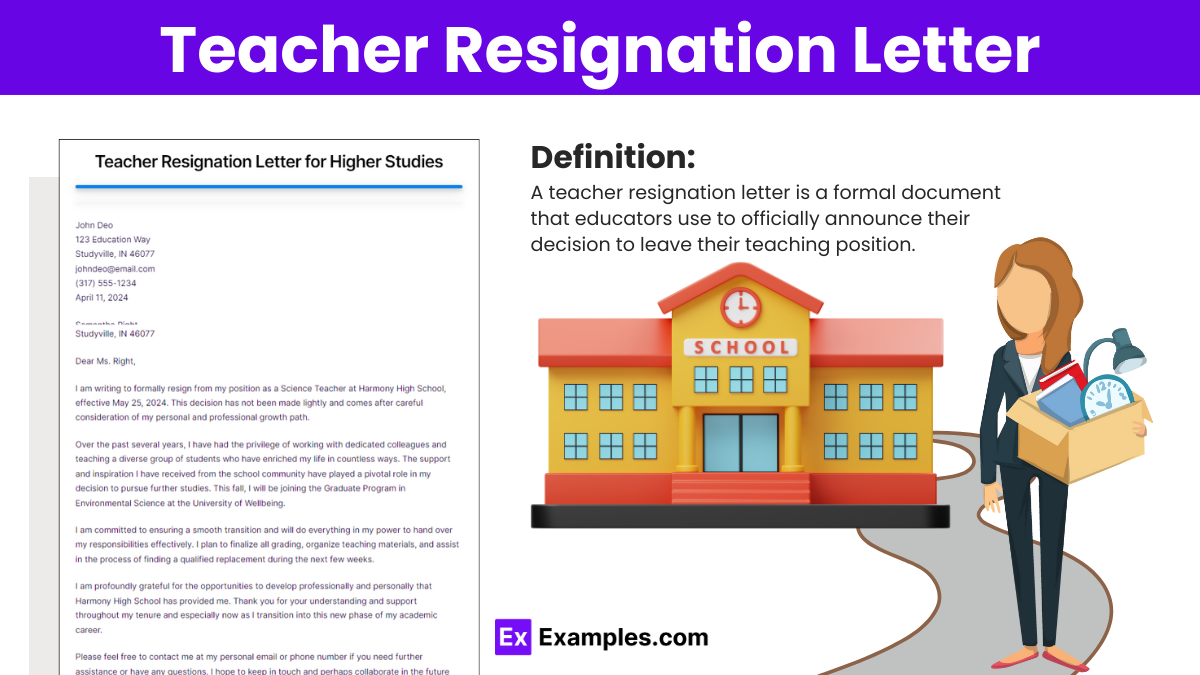
Writing a teacher resignation letter can be a significant step in your career journey. Whether you’re moving on to new opportunities or taking a break, it’s essential to convey your departure professionally. Discover how to draft a compelling teacher resignation letter with our examples and expert tips. Learn the art of expressing gratitude, providing notice, and leaving a positive impression as you embark on the next chapter of your professional life.
What is a Teacher Resignation Letter? – Definition
A teacher resignation letter is a formal document that educators use to officially announce their decision to leave their teaching position. It serves as a professional and courteous way to inform school administrators, colleagues, and other stakeholders about the intention to resign. A well-written resignation letter includes essential details such as the resignation date, reasons for leaving (optional), expressions of gratitude, and a commitment to facilitate a smooth transition. By providing advance notice through a resignation letter, teachers uphold professionalism and maintain positive relationships within the educational community.
Teacher Resignation Letter Format
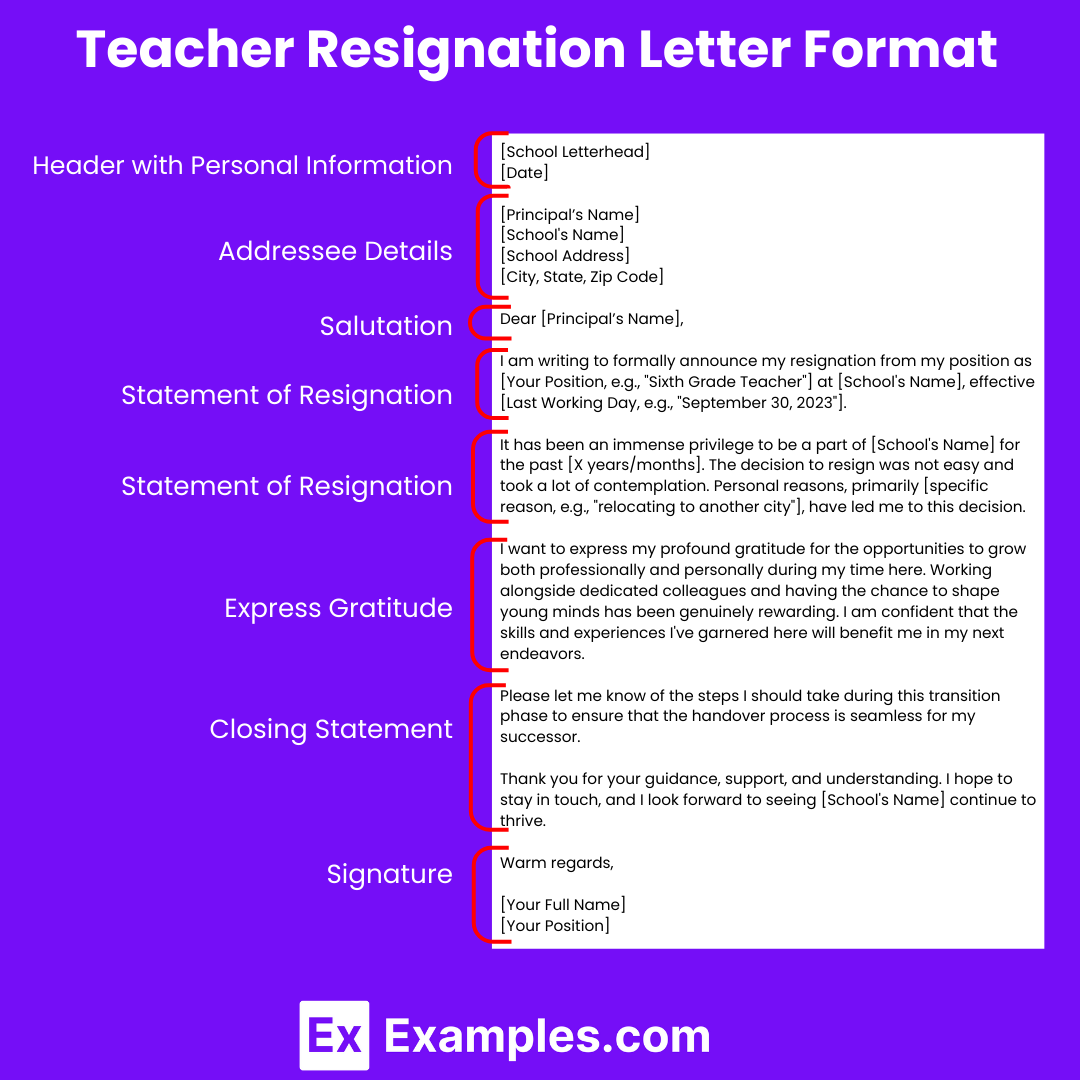
[Your Name] [Your Address] [City, State, ZIP Code] [Email Address] [Phone Number] [Date]
[Principal’s Name] [School Name] [School Address] [City, State, ZIP Code]
Dear [Principal’s Name],
I am writing to formally announce my resignation from my position as [Your Position] at [School Name], effective [Last Working Day, typically two weeks from the date of the letter]. This decision was not made lightly, but after careful consideration, I believe it is the right time for me to explore new opportunities in my career journey.
I want to express my heartfelt gratitude for the support, guidance, and camaraderie I have experienced during my time at [School Name]. It has been an incredible privilege to work with dedicated colleagues, inspiring students, and supportive parents. The memories I’ve gained and the relationships I’ve formed will remain with me forever.
In the upcoming weeks, I am committed to ensuring a seamless transition. I will work closely with my colleagues to provide any necessary information, materials, and guidance to support the continuity of the learning experience for our students. Please let me know how I can assist in this process.
I am excited to embark on this new chapter in my career, but I will always look back fondly on my time at [School Name]. Thank you once again for the wonderful memories and the opportunities for growth that I’ve been afforded here.
If you need to reach me after my departure, you can still contact me at [Email Address] or [Phone Number].
Thank you for your understanding, and I wish the entire [School Name] community all the best in the future.
[Your Name] [Your Signature]
How Do I Write a Resignation Letter as a Teacher? – Step by Step Guide
Follow these steps to write an effective resignation letter as a teacher:
Step 1: Choose the Right Format Use a formal business letter format. Include your contact information, date, recipient’s name, school’s name, address, and a proper salutation.
Step 2: Express Your Decision Clearly state that you are resigning from your position as a teacher. Mention the effective date of your resignation.
Step 3: Provide a Reason (Optional) While not mandatory, you can briefly mention the reason for your resignation. Keep it positive and professional, focusing on personal growth or new opportunities.
Step 4: Express Gratitude Express gratitude for the experiences, relationships, and opportunities you’ve had at the school. Highlight specific moments that have had a positive impact on you.
Step 5: Offer Assistance Offer to assist in the transition process by providing a notice period and collaborating with colleagues to ensure a seamless handover.
Step 6: End on a Positive Note End your letter on a positive and appreciative tone. Express well wishes for the school’s future and thank the recipient for their understanding.
Step 7: Close with Your Signature Use a closing such as “Sincerely” or “Best regards,” followed by your typed name. Sign your name above your typed name.
Tips for Writing a Resignation as a Teacher
Writing a teacher resignation letter is a professional courtesy that reflects your commitment to ethical conduct and seamless transitions within the educational community. It ensures that your departure is seen as a positive step forward in your career journey.
- Be Clear and Concise: Keep your letter straightforward and to the point. Avoid unnecessary details or lengthy explanations.
- Maintain a Professional Tone: Use a respectful and professional tone throughout your letter. Avoid negativity or criticism.
- Provide Adequate Notice: Whenever possible, provide at least two weeks’ notice. This gives the school time to find a replacement and allows you to assist with the transition.
- Express Gratitude: Show appreciation for the opportunities, experiences, and relationships you’ve gained during your time at the school.
- Offer Assistance: Offer your willingness to help during the transition, whether through training your replacement or providing guidance.
- Proofread: Carefully proofread your letter for grammar and spelling errors before submitting it.
- Keep a Copy: Keep a copy of the resignation letter for your records.
- Notify in Person: Ideally, inform your immediate supervisor or principal in person about your decision before submitting the written resignation.
- Follow School Protocol: Adhere to your school’s specific resignation procedures and policies.
- Stay Positive: Leave on a positive note, maintaining professional relationships with your colleagues and supervisors even after your departure.
10+ Teacher Resignation Letter Samples
- Teacher Resignation Letter for Family Reasons
- Teacher Resignation Letter for Marriage Reason
- Teacher Resignation Letter For Salary Reasons
- Teacher Resignation Letter for Higher Studies
- Teacher Resignation Letter for Better Opportunity
- Teacher Resignation Letter for Pregnancy Reason
- Teacher Resignation Letter to Principal for Health reasons
- Teacher Resignation Letter to Principal for Further studies
- Teacher Resignation Letter for Toxic Environment
- Teacher Resignation Letter for Relocation
15+ Teacher Resignation Letter Examples
This simple resignation letter example showcases the elements of a well-structured teacher resignation letter, including a respectful tone, clear notice period, expressions of gratitude, and a commitment to a smooth transition. Remember to customize the letter according to your situation and the specific details of your resignation.
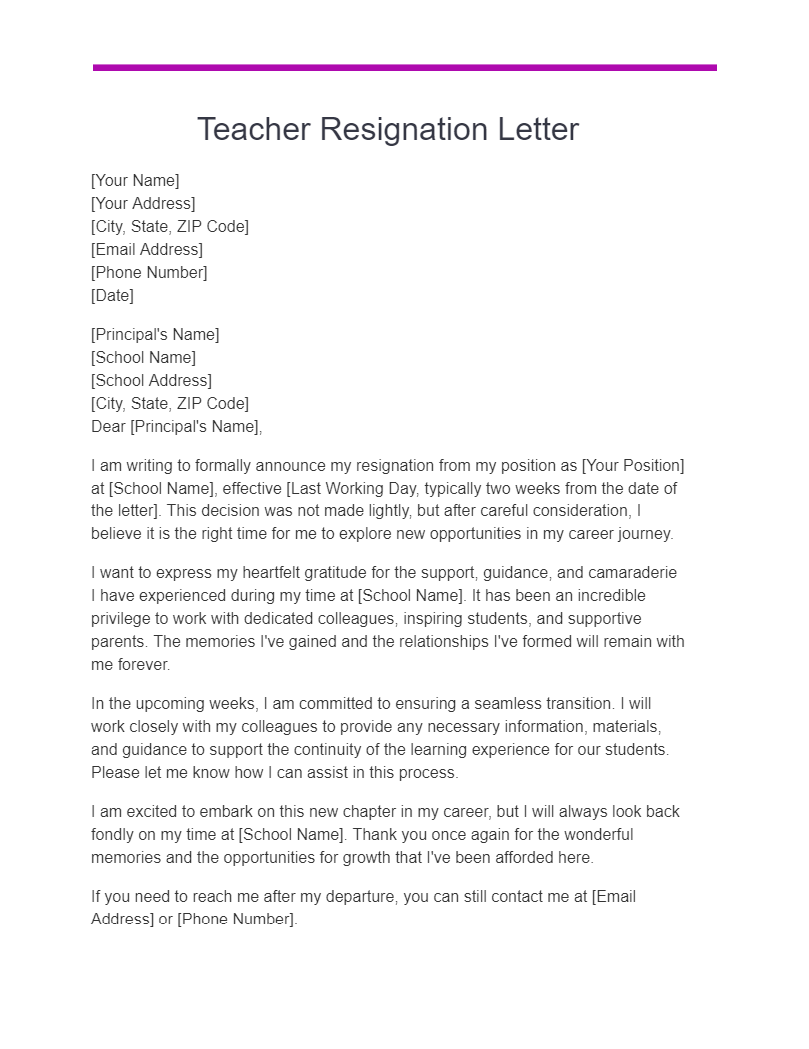
Free Resignation Letters – Copy & Paste
Simple resignation letter example for teacher.
I am writing to inform you of my decision to resign from my position as [Your Position] at [School Name], effective [Last Working Day, typically two weeks from the date of the letter]. This decision was reached after careful consideration and reflection on my career goals.
I want to express my deep gratitude for the opportunity to be a part of the [School Name] community. It has been a privilege to work alongside dedicated colleagues and contribute to the growth and development of our students.
I will work diligently over the next few weeks to ensure a smooth transition for my students and colleagues. I am confident that the exceptional team at [School Name] will continue to provide an outstanding educational experience.
Thank you for your understanding. I look forward to staying connected and wish the school continued success in the future.
Sincerely, [Your Name] [Your Signature]
A straightforward and professional resignation letter example for a teacher, expressing gratitude and commitment to a smooth transition.
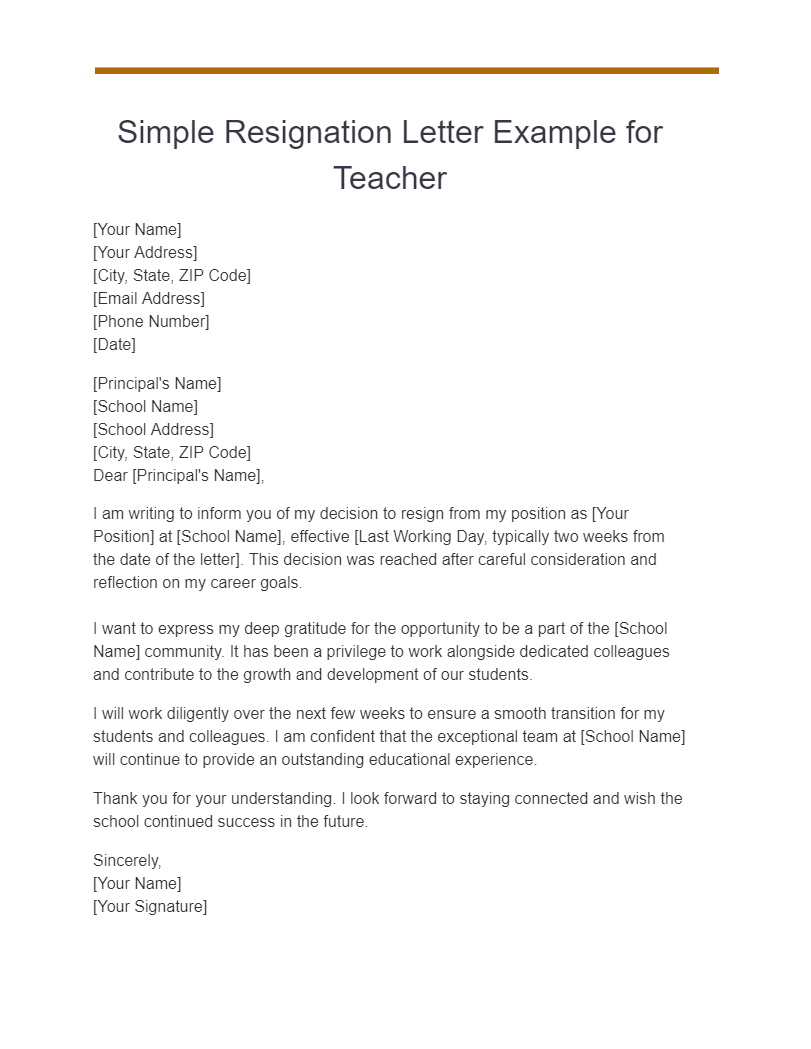
Teacher Resignation Letter Example to Principal for Personal Reasons
I am writing to announce my resignation from my role as [Your Position] at [School Name], effective [Last Working Day, typically two weeks from the date of the letter]. This decision was not easy and comes as a result of personal circumstances that require my full attention.
I want to extend my sincere gratitude to you, the staff, and the students for the incredible support and enriching experiences I’ve had during my time here. It has been an honor to contribute to the academic and personal growth of our students.
I am committed to facilitating a smooth transition for my students and colleagues during the remainder of my time here. I am confident that [School Name] will continue to thrive under your leadership.
Thank you for your understanding and support during this time. I wish [School Name] all the best in the future.
Warm regards, [Your Name] [Your Signature]
This example resigns due to personal reasons, conveying gratitude and ensuring a seamless transition.
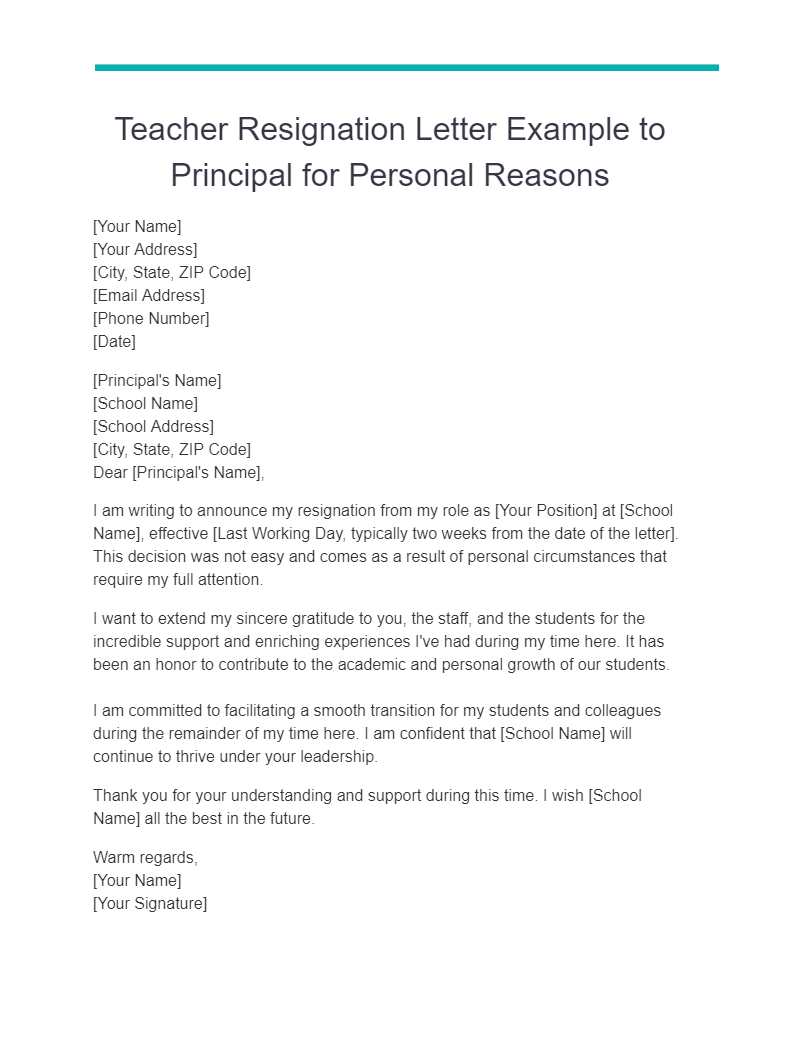
Teacher Resignation Letter End of Year Example
As the academic year draws to a close, I am writing to inform you of my decision to resign from my position as [Your Position] at [School Name], effective at the end of this school year.
I want to express my profound gratitude for the enriching experiences, collaborative environment, and professional growth that [School Name] has provided me. It has been a privilege to contribute to the education and development of our students.
Over the next few months, I am dedicated to supporting a seamless transition for my students and colleagues. I believe that [School Name] will continue to excel in providing quality education to its students.
Thank you for your understanding. I am excited about the opportunities that lie ahead and will always hold [School Name] close to my heart.
This example is a resignation letter at the end of the school year, expressing appreciation and commitment to a smooth transition.
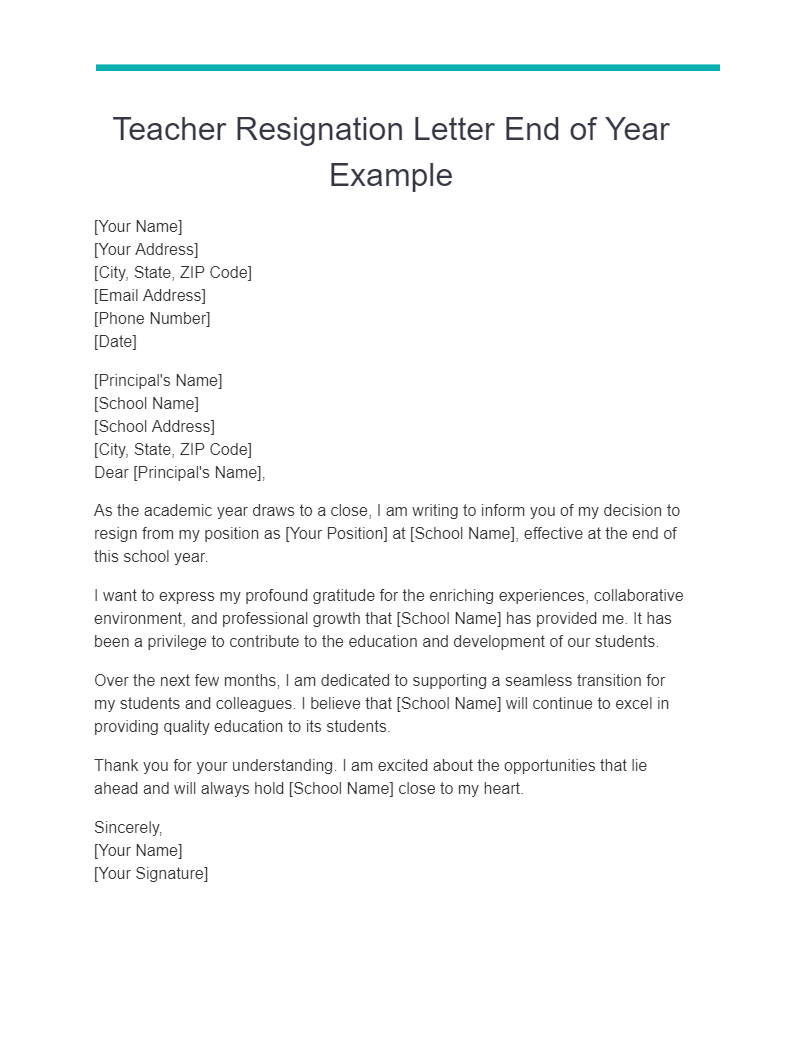
Teacher Resignation Letter for Personal Reasons Example
I am writing to announce my resignation as [Your Position] at [School Name], effective [Last Working Day, typically two weeks from the date of the letter]. This decision comes as a result of personal reasons that require my immediate attention and focus.
I want to extend my sincere gratitude to you and the entire [School Name] community for the support and camaraderie I have experienced during my time here. It has been an incredible journey contributing to the growth and development of our students.
During my remaining time, I am committed to ensuring a smooth transition for my students and colleagues. I am confident that [School Name] will continue to flourish and provide exceptional education under your leadership.
Thank you for your understanding. I look forward to cherishing the memories and lessons from [School Name].
Best regards, [Your Name] [Your Signature]
This example resigns due to personal reasons, expressing gratitude and ensuring a seamless transition.
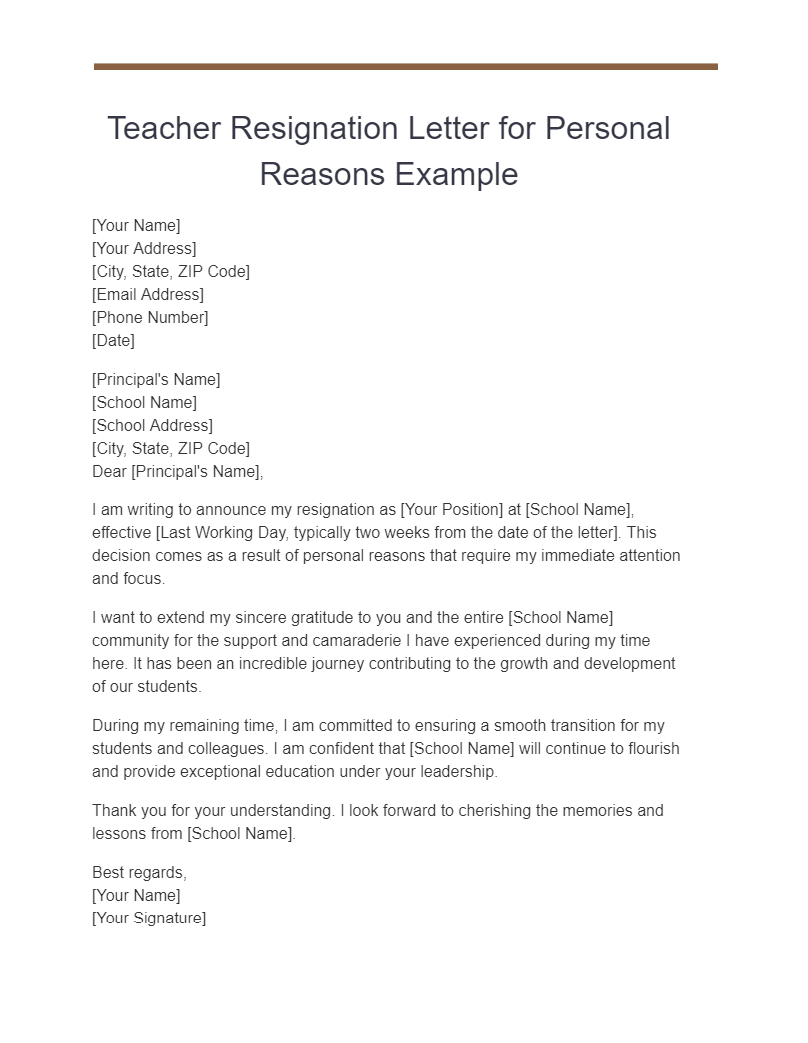
Teacher Resignation Letter for Family Reasons Example
I am writing to inform you of my decision to resign from my position as [Your Position] at [School Name], effective [Last Working Day, typically two weeks from the date of the letter]. This decision was reached after careful consideration of my family’s needs and priorities.
I want to express my deep appreciation for the enriching experiences, professional growth, and supportive environment that [School Name] has provided me. It has been an honor to contribute to the educational journey of our students.
I am committed to facilitating a smooth transition for my students and colleagues during the upcoming weeks. I am confident that [School Name] will continue to excel in nurturing young minds under your leadership.
Thank you for your understanding during this time. I am excited about the path ahead and will always hold [School Name] in high regard.
This example resigns due to family reasons, conveying gratitude and ensuring a seamless transition.
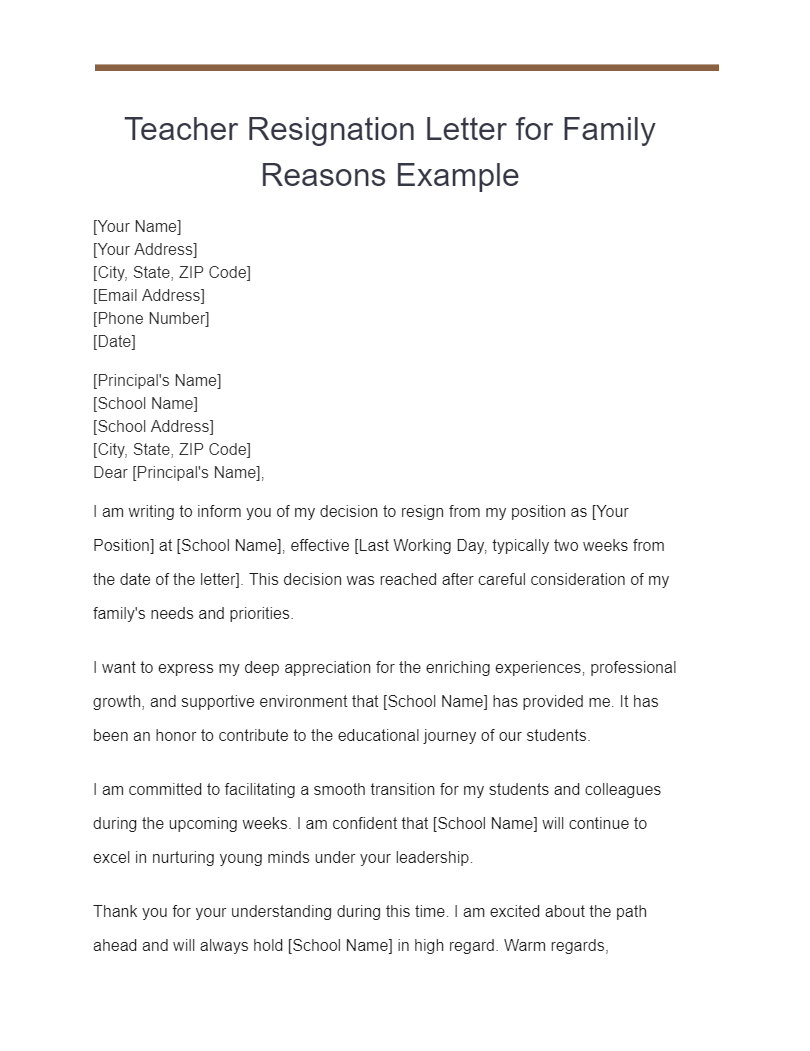
Teacher Resignation Letter to Principal Example
I hope this letter finds you well. It is with mixed emotions that I write to inform you of my decision to resign from my position as a [Your Position] at [School Name], effective [Last Working Day, typically two weeks from the date of the letter]. This decision was not reached without careful consideration, and I want to express my gratitude for the opportunities and experiences I’ve had during my time here.
Working at [School Name] has been a truly enriching experience for me. I’ve had the privilege of working with dedicated colleagues, passionate students, and supportive parents. The collaboration, growth, and learning that have taken place within these walls are remarkable, and I am proud to have been a part of it.
While I am excited about the new direction my career is taking, I will deeply miss the connections and relationships I’ve built at [School Name]. Please know that my decision to resign is driven by personal and professional factors, and I believe it’s time for me to explore new challenges.
In the coming weeks, I am committed to ensuring a smooth transition. I will work closely with my fellow teachers to provide any necessary materials, guidance, and insights to ensure that our students continue to receive the high-quality education they deserve.
I am grateful for the guidance, mentorship, and support you’ve provided me during my time at [School Name]. I have learned and grown immensely under your leadership, and I carry those lessons with me as I move forward in my career journey.
If there’s anything I can do to assist in this transition or to support the school in any way after my departure, please don’t hesitate to reach out. You can still contact me at [Email Address] or [Phone Number].
Thank you again for everything, and I wish [School Name] continued success in all its endeavors.
This teacher resignation letter to the principal exemplifies gratitude, professionalism, and commitment to a smooth transition. Expressing both personal and professional reasons for leaving, it reflects on enriching experiences while ensuring the continuation of quality education for students.
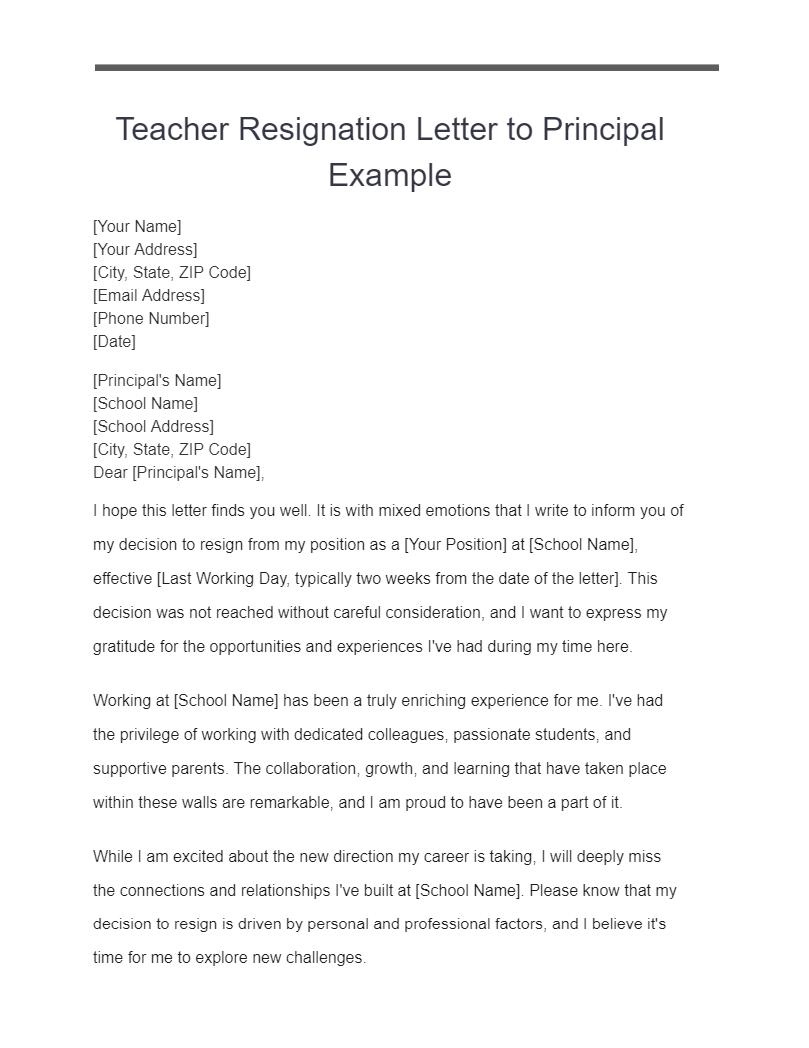
Elementary Teacher Resignation Letter Example
I hope this letter finds you in good health. It is with a mix of emotions that I am writing to announce my resignation from my role as an Elementary Teacher at [School Name], effective [Last Working Day, typically two weeks from the date of the letter].
Over the past [Number of Years] years, I have had the privilege of being a part of the [School Name] community, where I have grown as an educator and cherished every moment spent with my young learners. However, after much contemplation and consideration of my personal and professional goals, I have decided that it is time for me to embark on a new chapter in my career journey.
Working at [School Name] has been a remarkable experience. I am grateful for the camaraderie and collaboration among my colleagues, the enthusiasm of my students, and the unwavering support of parents. As I bid farewell to this chapter, I do so with a heart full of gratitude and cherished memories.
In the upcoming weeks, I am committed to ensuring a seamless transition for my students and colleagues. I will work diligently to provide comprehensive transition materials, offer insights, and assist in any way possible to ensure that my successor steps into a supportive and well-prepared environment.
I want to express my sincere gratitude to you, [Principal’s Name], for your guidance, leadership, and unwavering commitment to fostering a nurturing learning environment. Your support has been invaluable to my growth as an educator.
While I look forward to new opportunities and challenges, I will always hold [School Name] close to my heart. Please know that my decision to leave is not without a heavy heart, and I will cherish the memories and relationships formed during my time here.
If there is anything I can do to facilitate a smooth transition or support the school community after my departure, please do not hesitate to reach out. You can still contact me at [Email Address] or [Phone Number].
Thank you once again for the wonderful experiences and memories.
Warm regards,
This detailed elementary teacher resignation letter strikes a balance between gratitude and professional growth. It showcases the teacher’s connection to the school community, emphasizes the commitment to a smooth transition, and expresses appreciation for the principal’s leadership. It’s a heartfelt farewell to a cherished chapter.
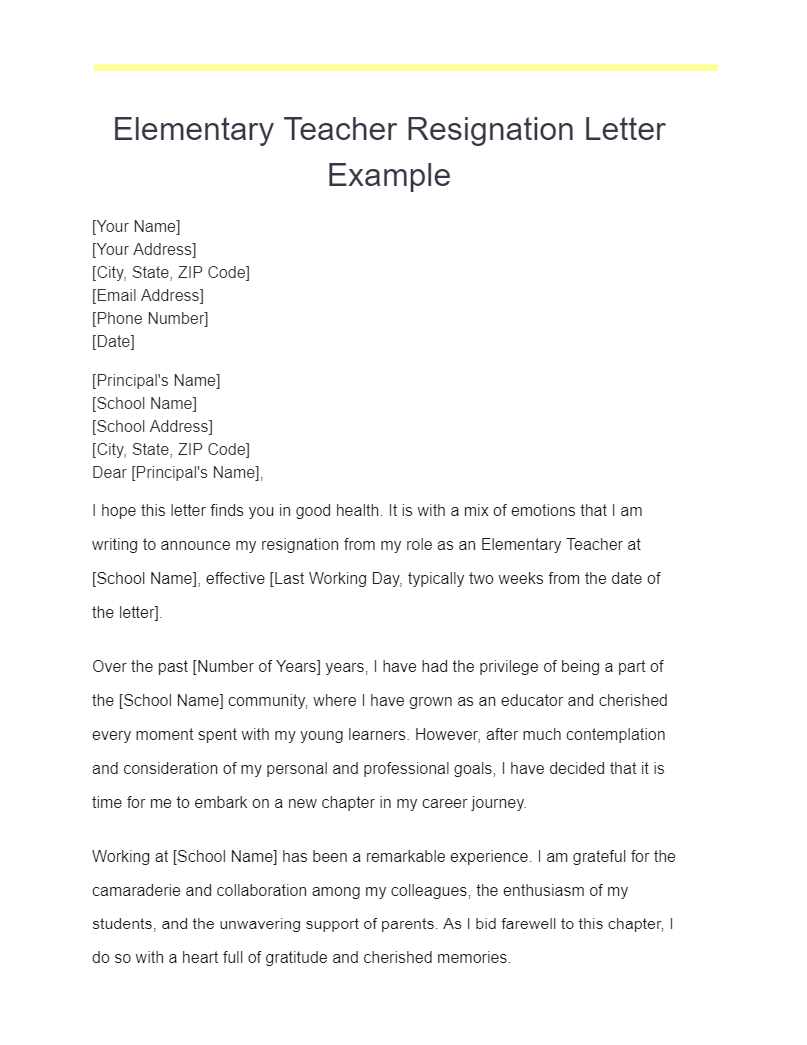
Primary Teacher Resignation Letter Example
I trust this letter finds you well. It is with a mix of emotions that I am writing to inform you of my decision to resign from my position as a Primary Teacher at [School Name], effective [Last Working Day, typically two weeks from the date of the letter].
The journey I have shared with the students, parents, and colleagues at [School Name] has been nothing short of exceptional. However, as I reflect on my personal and professional aspirations, I believe it is time for me to seek new challenges and opportunities in my career.
Teaching the youngest minds at [School Name] has been an honor and a privilege. The laughter, curiosity, and growth I have witnessed within these walls are memories I will forever hold close to my heart. I am grateful for the unwavering support of my colleagues and the partnership of parents in nurturing the love of learning in our students.
In the coming weeks, I am dedicated to ensuring a smooth transition for my students and fellow teachers. I will provide comprehensive handover materials, insights, and assistance to ensure that the students continue to thrive in a supportive environment.
I wish to extend my deepest gratitude to you, [Principal’s Name], for your leadership, mentorship, and commitment to creating a vibrant educational community. Your guidance has been instrumental in shaping my journey as a teacher.
While I am eager to embrace new horizons, I will always carry the fond memories and relationships cultivated at [School Name]. Should you need any support beyond my departure, please feel free to reach me at [Email Address] or [Phone Number].
Thank you for the invaluable experiences and cherished memories.
This heartfelt primary teacher resignation letter eloquently captures the teacher’s journey with young students. It balances gratitude with a desire for professional growth, expressing appreciation for colleagues and parents. The letter showcases commitment to a smooth transition and pays tribute to the principal’s guidance in nurturing young minds.
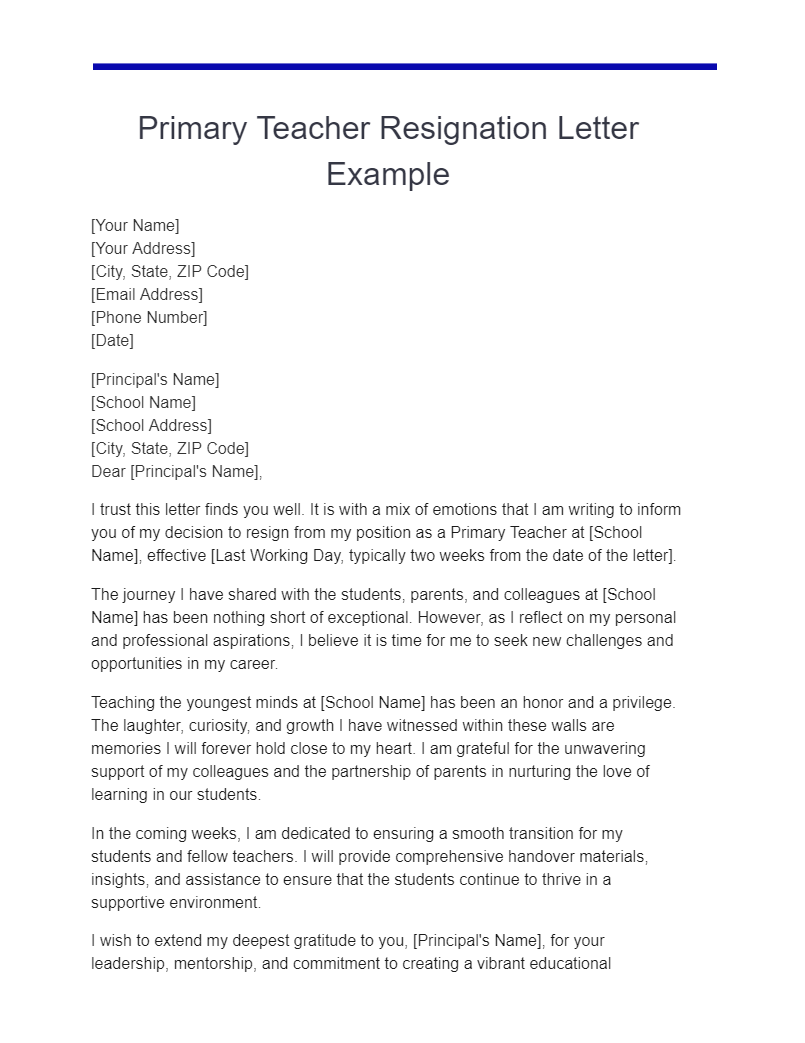
Short Resignation Letter Example
I am writing to inform you of my resignation from my position as a [Your Position] at [School Name], effective [Last Working Day, typically two weeks from the date of the letter]. I have truly enjoyed my time here and am grateful for the experiences. Thank you for your understanding.
Sincerely, [Your Name]
This concise yet polite short resignation letter demonstrates professionalism. It communicates the resignation and appreciation for the school in a brief manner, adhering to the formalities while expressing gratitude for the time spent at the institution.
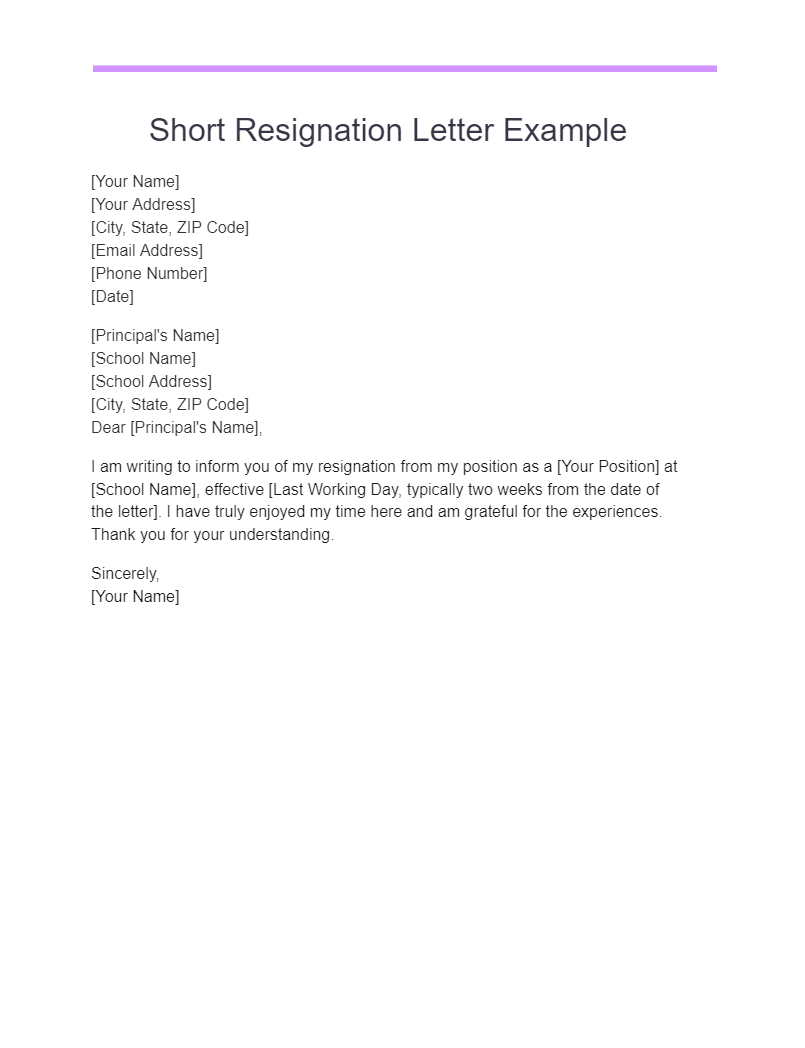
Class Teacher Resignation Letter Example
I trust you are well. I am writing to inform you of my decision to resign from my role as a Class Teacher at [School Name], effective [Last Working Day, typically two weeks from the date of the letter]. It has been an honor to guide and nurture the students under my care.
Over the past [Number of Years] years, I have had the privilege of witnessing growth, development, and curiosity in my students. However, as my journey takes a new direction, I believe it is time for me to explore new avenues for personal and professional growth.
I am grateful for the support and camaraderie of my colleagues and the trust that parents have placed in me. The connections forged with students and the shared moments of learning have been immensely rewarding.
In the forthcoming weeks, I am dedicated to ensuring a seamless transition for my students. I will collaborate with fellow teachers, provide transition materials, and offer insights to ensure that the students’ educational journey remains uninterrupted.
I extend my heartfelt appreciation to you, [Principal’s Name], for your leadership and guidance. Your commitment to creating an environment conducive to learning has been a source of inspiration.
As I step into this new phase of my career, I will always carry the memories and experiences gained at [School Name]. If there is any way I can contribute to the school community after my departure, please do not hesitate to reach out to me at [Email Address] or [Phone Number].
This detailed class teacher resignation letter exemplifies gratitude and professionalism while highlighting the teacher’s role in students’ growth. It emphasizes a smooth transition and pays tribute to the principal’s leadership. The letter balances the personal journey with dedication to the educational community.
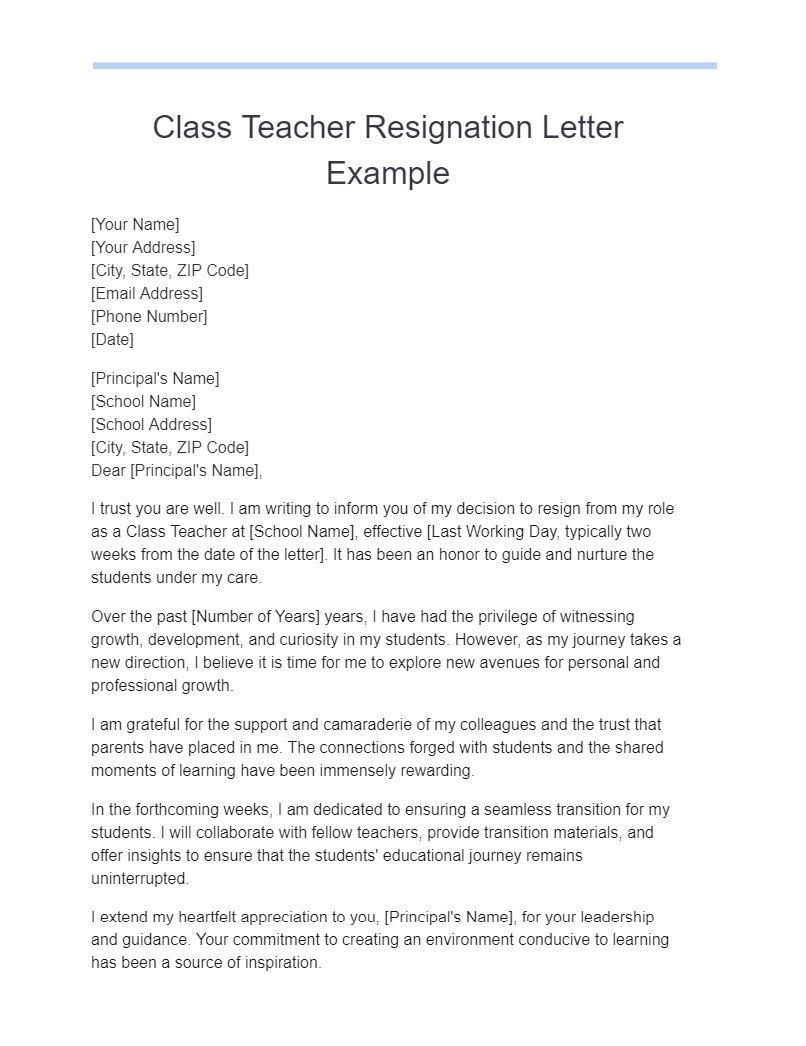
Teacher Resignation Letter for Retirement Example
I am writing to formally announce my retirement from my position as [Your Position] at [School Name], effective [Retirement Date, typically a few months in advance]. This decision comes after long and rewarding years of service, and I am looking forward to embarking on this new phase of life.
Reflecting on my time at [School Name], I am filled with gratitude for the opportunities, experiences, and relationships that have shaped my career. It has been an honor to contribute to the growth and development of countless students over the years. While I will miss the classroom and interactions with my colleagues, I am excited about the prospect of dedicating more time to personal pursuits and spending quality moments with my loved ones.
I am committed to ensuring a smooth transition as I pass on my responsibilities to my colleagues. I will work closely with the [Department/Grade Level] team to provide any necessary information, materials, and insights to facilitate the continuity of exceptional education at [School Name].
Please accept my sincere appreciation for the support and camaraderie that have defined my tenure at [School Name]. I am grateful for the memories and proud of the impact I have had on students’ lives. If you need to reach me after my retirement, you can still contact me at [Email Address] or [Phone Number].
Thank you for your understanding, and I extend my best wishes to the entire [School Name] community.
In this example, the teacher is announcing their retirement from the teaching position. The letter is written in a respectful tone, expressing gratitude for the experiences and memories gained during their career. The teacher explains the reasons for retirement and commits to ensuring a smooth transition. The letter also provides contact information for future communication.
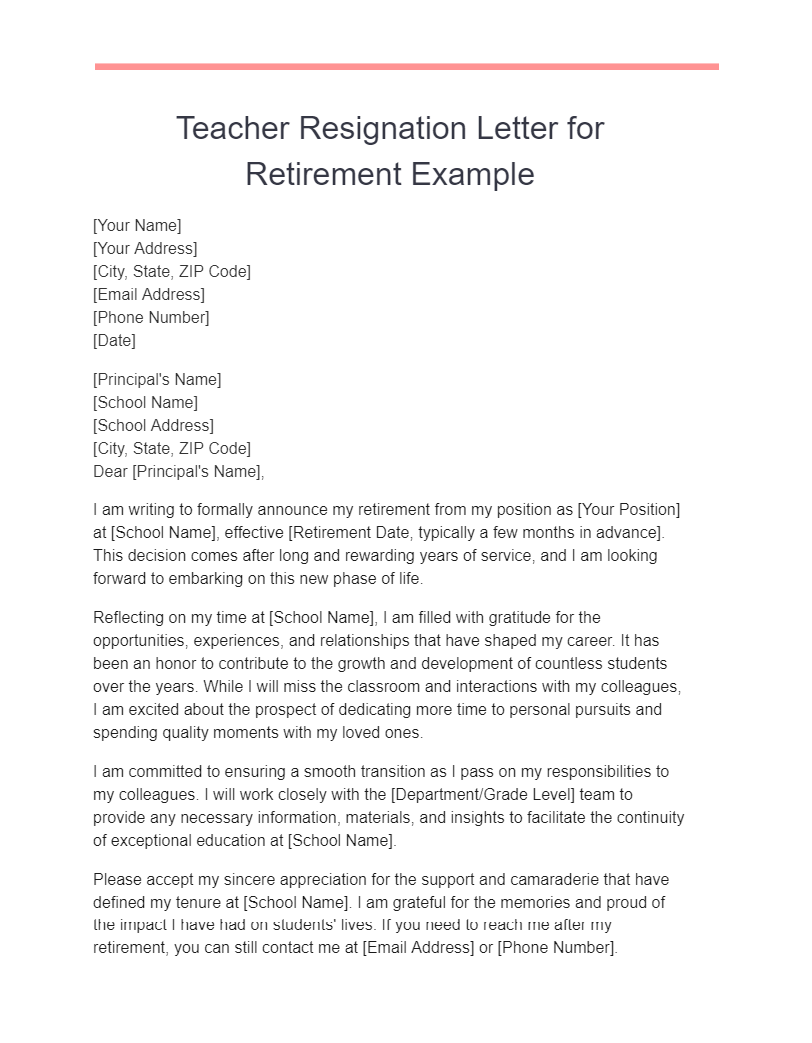
Teacher Resignation Letter in Mid Year Example
I am writing to formally announce my resignation from my position as [Your Position] at [School Name], effective [Resignation Date, typically two weeks from the date of the letter]. It is with mixed emotions that I tender my resignation in the middle of the academic year.
The decision to leave [School Name] has not been an easy one, as I have truly enjoyed working with the dedicated faculty and enthusiastic students. However, due to unforeseen personal circumstances, I believe it is in the best interest of all parties that I step down from my role at this time.
I want to express my deep gratitude for the support and guidance I have received during my time at [School Name]. The memories I’ve made and the lessons I’ve learned will stay with me for years to come. I am committed to ensuring a smooth transition and will work closely with my colleagues to provide any necessary information and support.
Please accept my apologies for any inconvenience this may cause and extend my appreciation to the entire [School Name] community for the privilege of being a part of this educational institution.
Here, the teacher is resigning in the middle of the academic year due to unforeseen personal circumstances. The tone is apologetic and acknowledges the impact of the decision. The teacher expresses appreciation for the school and colleagues, even though the resignation is sudden. The commitment to facilitating a smooth transition is highlighted, and the letter ends on a positive note.
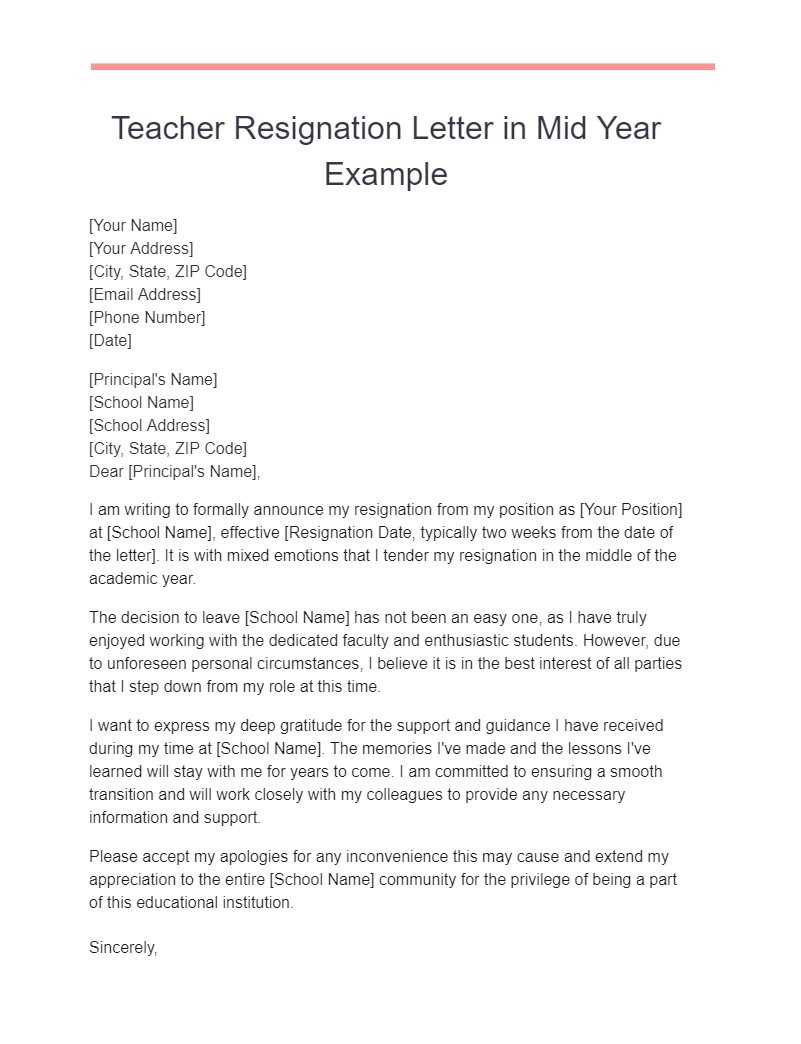
Immediate Teacher Resignation Letter Example
I am writing to announce my immediate resignation from my position as [Your Position] at [School Name]. Effective immediately, I am stepping down from my role due to unforeseen personal circumstances that require my immediate attention and focus.
This decision was not taken lightly, and I deeply regret any inconvenience this may cause the school and my colleagues. I have enjoyed my time at [School Name] and value the relationships I’ve built with students and staff members. I will work diligently to ensure a smooth transition and provide any necessary assistance during this period of change.
Thank you for your understanding, and I apologize for any disruption my sudden departure may cause. I extend my best wishes to the [School Name] community and appreciate the support I’ve received during my tenure here.
This example is for a situation where the teacher needs to resign immediately due to urgent personal reasons. The tone is professional and straightforward. The teacher explains the immediate resignation and apologizes for any inconvenience caused. Despite the sudden departure, the commitment to aiding the transition process is mentioned, and the letter ends with best wishes for the school.
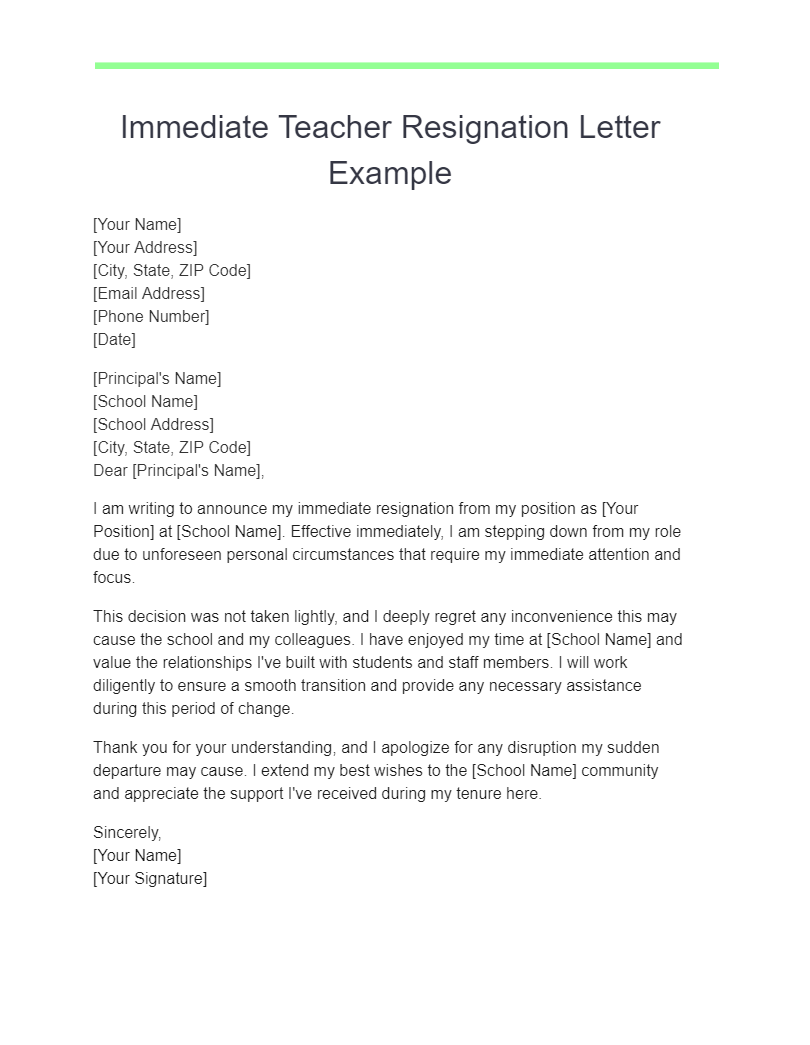
Sample Resignation Letter Example
I am writing to announce my resignation from my position as [Your Position] at [School Name], effective [Resignation Date, typically two weeks from the date of the letter]. While it is difficult to bid farewell to an institution I have grown to love, I believe it is time for me to pursue new opportunities and challenges.
I want to express my deep gratitude for the experiences and growth I’ve gained during my time at [School Name]. It has been an honor to contribute to the development of students and collaborate with fellow educators. I am committed to ensuring a smooth transition by working closely with my colleagues to provide necessary information and support.
I extend my best wishes to the students, staff, and administration of [School Name]. Thank you for the valuable lessons and memories I will carry with me throughout my career.
In this example, a teacher is resigning to pursue new opportunities and challenges. The letter is appreciative of the school’s experiences and growth. The teacher expresses gratitude for collaborating with fellow educators and contributing to student development. The commitment to ensuring a smooth transition is emphasized, and the letter ends with well wishes for the school’s future.
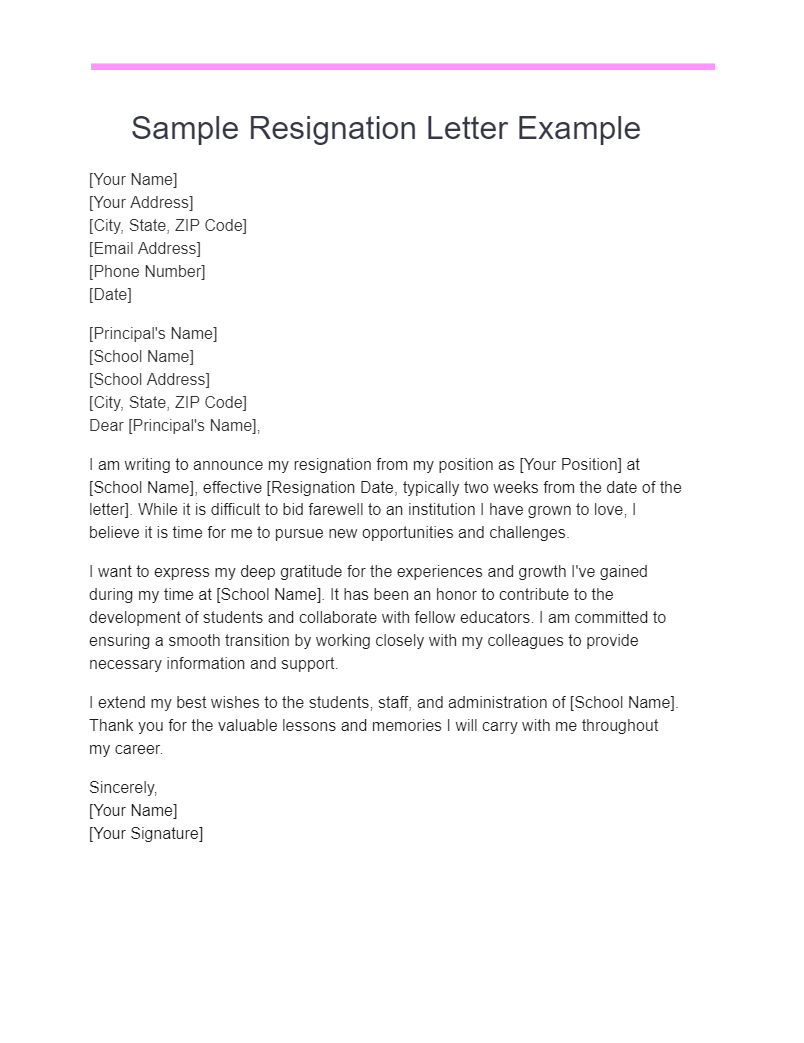
Basic Teacher Resignation Letter Example
I am writing to announce my resignation from my position as [Your Position] at [School Name], effective [Resignation Date, typically two weeks from the date of the letter]. I have enjoyed my time at [School Name] and have made the decision to move on to new opportunities.
I appreciate the experiences and memories I’ve gained during my tenure at [School Name]. I am committed to ensuring a smooth transition by collaborating with my colleagues and providing necessary information.
Thank you for the support and growth I’ve experienced at [School Name]. I wish the school continued success in the future.
This example is a concise resignation letter where the teacher is resigning to explore new opportunities. The tone is appreciative of the experiences gained and the decision to move on. The teacher commits to a smooth transition by working with colleagues. The letter concludes with thanks and wishes for the school’s success.
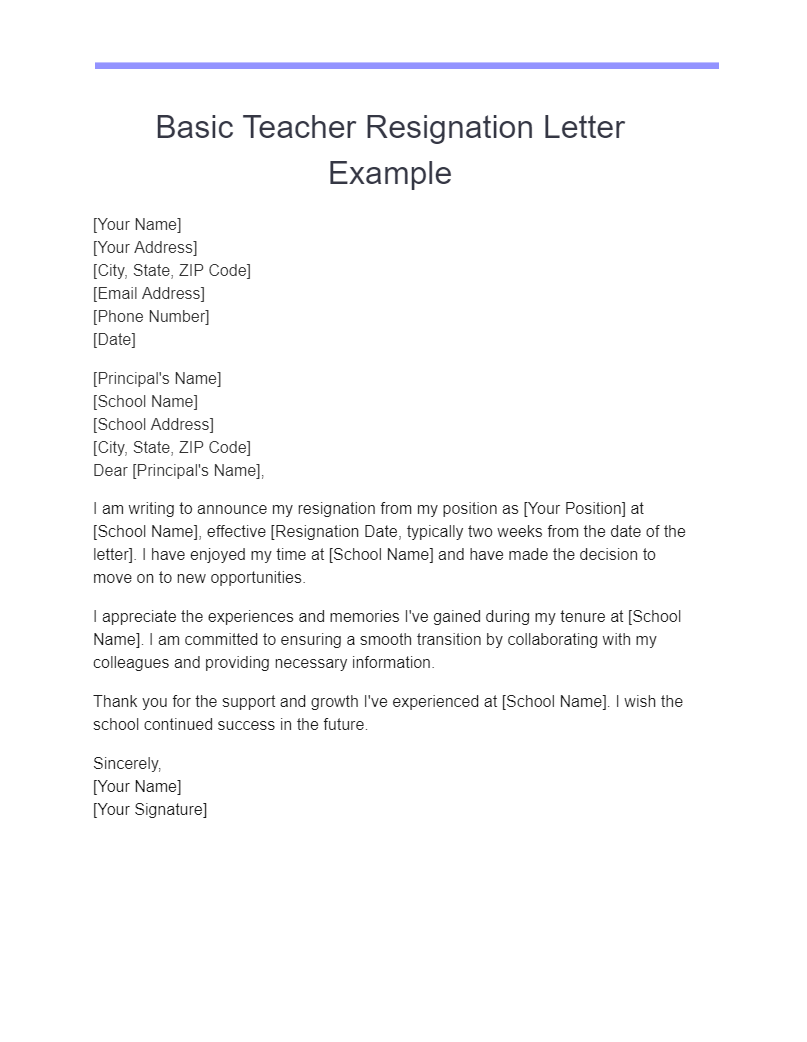
Why is It Important to Write a Teacher Resignation Letter?
Writing a teacher resignation letter is a crucial step in leaving your teaching position with professionalism and integrity. It serves several important purposes:
- Formal Communication: A resignation letter is an official document that communicates your decision to leave the teaching position to school administrators, colleagues, and other stakeholders.
- Maintaining Professionalism: Submitting a resignation letter demonstrates your commitment to maintaining professionalism even as you exit your role. It reflects positively on your character and reputation.
- Facilitating Transition: A well-written resignation letter helps ensure a smooth transition for both students and colleagues. It provides time for the school to find a suitable replacement and for you to assist in transferring responsibilities.
- Legal Requirement: In many educational institutions, submitting a resignation letter is a standard procedure and may be required as per employment contracts or school policies.
- Future References: Leaving a positive impression through a resignation letter can impact your future references. Your letter showcases your gratitude and professionalism, which can be valuable for securing future job opportunities.
Step-by-Step Guide to Composing Your Teacher Resignation Letter
1. Start with Your Contact Information
- Name : Full legal name.
- Address : Home address with city, state, and zip code.
- Email : Professional email address.
- Phone Number : Best contact number.
- Date : The date when you are writing the letter.
2. Add the Recipient’s Information
- Name : Principal’s full name or the person in charge of faculty affairs.
- Title : Such as “Principal”, “Headmaster”, or “Director”.
- School Name and Address .
3. Salutation
- Address the recipient formally, e.g., “Dear Mr./Ms. [Last Name],”
4. State the Purpose of the Letter
- Clearly mention that you are resigning.
- Specify your current position and the name of the school.
- Include the effective date of your resignation.
5. Explain the Reason for Resignation (Optional)
- Briefly mention why you are leaving (e.g., personal reasons, career change, relocation).
- Keep this section professional and neutral to maintain good relationships.
6. Discuss the Transition Process
- Outline how you intend to manage your responsibilities before leaving.
- Mention any end-of-period duties like grading final exams or completing reports.
- Offer to assist in finding or training your replacement if possible.
7. Express Gratitude
- Thank the principal or school board for the opportunities you had during your tenure.
- Reflect on positive experiences and growth opportunities.
8. Offer to Keep in Touch
- Provide your personal contact information for future correspondence.
- Express willingness to assist the school post-resignation if needed.
9. Close Formally
- Use a formal closing, such as “Sincerely” or “Respectfully”.
- Sign your name above your printed name.
- Include your current job title below your printed name.
10. Proofread Your Letter
- Check for any grammatical or spelling mistakes.
- Ensure the tone is professional and the content accurately reflects your intentions
Common Mistakes to Avoid When Writing a Resignation Letter
- Being Overly Emotional : Avoid emotional expressions that reflect anger, frustration, or excessive sentimentality. Keep the tone professional and composed.
- Too Much Detail About Reasons for Leaving : While it’s appropriate to mention why you are leaving, there’s no need to go into excessive detail about personal grievances or comprehensive reasons.
- Negativity Towards the School or Colleagues : Criticizing the school, your colleagues, or your students can come off as unprofessional and may harm future references or professional relationships.
- Forgetting to Date the Letter : Always date your resignation letter. The date is crucial as it marks the start of your notice period.
- Vague Language : Be clear and straightforward about your intention to resign. Ambiguities may cause unnecessary confusion.
- Omitting the Notice Period : Specify the effective date of your resignation and acknowledge the required notice period as per your contract.
- Not Offering to Help with the Transition : It’s courteous and professional to offer assistance during the transitional period, whether through training a replacement or finishing up pending tasks.
- Leaving Out Contact Information : Include your personal contact information for any follow-up correspondence after you leave the institution.
- Poor Formatting and Typos : A resignation letter should be well-formatted, clean, and free of spelling or grammatical errors to maintain professionalism.
- Sending the Letter via Inappropriate Channels : Deliver your resignation letter through the proper channels. Typically, this would be in person to your direct supervisor, followed by an email or formal paper copy for official records.
FAQ’s
How should a teacher resign.
A teacher should resign professionally by submitting a formal resignation letter to the principal or school administration, providing adequate notice, usually two weeks to one month, and explaining the resignation politely without delving into negative reasons.
What Is the Format of Relieving Letter for School Teacher?
A relieving letter for a school teacher should include the teacher’s name, position, resignation acceptance, last working day, and a statement of service. It confirms the teacher’s employment period and that they left on good terms.
How Do I Write a Letter of Resignation for a Teacher in India?
In India, a teacher’s resignation letter should start with the date and the principal’s contact information, followed by a formal declaration of resignation, a brief reason for leaving, the last working day, a thank you note, and the teacher’s signature.
Is Resignation Letter a Formal Letter?
Yes, a resignation letter is a formal letter. It communicates an employee’s intent to leave their current position and should adhere to a professional tone and format, addressing the recipient respectfully and clearly stating the resignation details.
What Is an Example of a Teacher Letter of Resignation for Retirement?
“Dear [Principal’s Name], I hereby resign from my position as [Your Position], effective [Date], due to retirement. I appreciate the opportunities for professional and personal development that I have received during my tenure at [School’s Name]. Sincerely, [Your Name].”
What Is the Subject of Teacher Resignation Letter to Principal?
The subject of a teacher resignation letter to the principal should be concise and clear, typically formatted as: “Resignation – [Your Full Name]”. This subject line instantly informs the principal of the letter’s purpose
Text prompt
- Instructive
- Professional
Compose a resignation letter for a teacher leaving to pursue further education
Develop a resignation letter for a school librarian retiring after years of service.

IMAGES
VIDEO
COMMENTS
How to write an application letter. Follow these steps to compose a compelling application letter: 1. Research the company and job opening. Thoroughly research the company you're applying to and the specifications of the open position. The more you know about the job, the better you can customize your application letter.
No hard numbers. "I worked in a team and provided customer service to elderly residents". 5. Choose engaging words for your application letter. Your letter of application's length should be 250 to 400 words or 3 to 4 paragraphs — long enough to get your point across but short enough that the reader won't lose interest.
Letters of application are essential in the job market, so don't risk losing to other candidates just because you didn't write one. 2. Address Your Letter of Application Properly. Addressing an application letter is simple. Firstly, include your contact information in the header of the application letter : Full name.
Format of an Application Letter. Create enough spacing: 1-1.15 between lines, 1-inch margins, double space between paragraphs. Choose the font: Garamond, Helvetica, or Arial in 11-12 points in a font size. Align the content to the left. Pick the file format: PDF, unless the recruiter requested a Word file specifically.
A Step-by-Step Guide to Writing a Perfect Application Letter. Let's learn how to write an application letter for a job with a step-by-step guide that'll show you how to craft every part of it. #1. Research the Company. Researching the company is the first step before you even start writing your application letter.
Application Letter Templates for Your Career. Jobs, internships and academic programs often require an application letter. You can also write an application letter to seek out unlisted opportunities and advertise yourself to potential employers. Your application letter is a description of why you're the ideal fit for the opening you're applying ...
Sample Job Application Letter (Text Version) Elizabeth Johnson 12 Jones Street Portland, Maine 04101 555-555-5555 [email protected]. August 11, 2024. Mark Smith Human Resources Manager Veggies to Go 238 Main Street Portland, Maine 04101.
Pick an appropriate file format and name. Save your letter in a widely accepted file format, such as PDF or Microsoft Word (.doc or .docx). Ensure your file name is professional and includes your name, such as "FirstName_LastName_CoverLetter.pdf.".
It means that you need to provide the following information: Your personal info (name, email, phone number/LinkedIn) Date written. The recipient's info (name, job title, email, company address) Example of an application letter header: Kaylee Tran. 9215 Fremontia Ave, Fontana, CA 92335.
Introduce yourself as a professional. Mention the specific job title you're applying for. Explain why you want to join the company. Highlight how your skills and experience align with the job requirements. Indicate where you heard about the position. 3. Convince the employer you're the right person for the job.
To write a winning job application letter, it is important to understand the job requirements, analyze the job description, understand the needs of the employer, and tailor the letter to attract the specific employer. By doing so, you can craft an application that stands out from the competition and showcases your value as a candidate.
Follow business letter format. Use business letter format when writing your letter. If you're sending a typed hard-copy letter, be sure to lead with a paragraph containing your address, followed by the date, followed by the address of the recipient. If you're sending an email, you can omit the address and date sections.
2. Make sure the language you use is easy to read. You might be a literary wizard, but those long words won't impress the hiring manager if they make your letter difficult to read. 3. Use positive language. Positivity is the way forward when it comes to selling your skills to a potential employer.
Use a professional format for your application letter When writing an application letter, use a professional font type. Choose fonts like Times New Roman, Calibri or Arial in plain black. Choose between 10 and 12-point font and use single spacing alignment. Your application letter should have a professional business heading that includes your ...
Use a formal closing. When you get to the end of your letter, add a space, then include a closing, like "Sincerely" and sign your name. [11] Sometimes, it's appropriate to type your name, then print out the letter and sign it in pen. That can be a nice touch. 5. Put your contact information in the header.
1. Explain what drew you to the job. Your letter of application should capture the interest of a potential employer, so be engaging. Open with a strong, declarative statement about your excitement for the position or interest in the company. Briefly highlight traits that make you a star candidate to pique their interest.
At the top-left of the page, begin with your contact information, including your name, location, phone number and email address. Include the date on the line below. Next, address the letter to the hiring manager or the appropriate recipient, using a formal greeting such as Dear [Hiring Manager's Name].
Note down the top keywords to use in your letter to tailor it to the job. Creating a draft of an application letter can help you craft your sentences correctly and notice information that you find lacking as you craft it. 2. Create an outline for your letter. You should divide your application letter into three essential parts: the introduction ...
10. Ending your application letter: When you are sending your application letter, you should make sure that your tone matches the tone of the letter. A formal letter closing is polite, courteous, and respectful. These are common closing that you can use to end your application letter: 'Sincerely' or your 'faithfully'.
4. Address the letter to the right person. Find out the name of the recruiter or the hiring manager and address the application letter to them. You could write "Hello, Mr./Mrs./Ms." or "Dear Mr./Mrs./Ms." and follow that with their surname. If you can't find their name, use "To the Hiring Manager" or "Sir/Madam."
Writing the letter of application. Write a compelling first paragraph. Write something that draws the interest of your reader, in this case, the hiring manager. ... To make sure that your application letter format will support you, consider the following tips: Get right to the point The first paragraph of your job application template should ...
Introduce yourself and highlight your skills and qualifications. State strongly why you would be right for the job. Use a polite tone throughout your letter. Stay genuine and professional. End the letter on a positive note. Proofread the letter before you send it to the concerned hiring manager/employer. Q2.
1. Begin with a letterhead. At the top of your letter, use a header that states your name, address, contact number and the current date in the mentioned order. This way, a recruiter can easily find your relevant details to contact you for further follow-up action. 2.
There are many types of cover letters out there. These include the application cover letter, the prospecting cover letter, and the career change cover letter. In this article, we'll discuss the most common: the application cover letter, which is what you'll need when trying to secure a new job (usually for a currently open position).
How to Write a Great Cover Letter for Your College Application. Writing a cover letter, also known as a personal statement or statement of purpose, is a crucial step in the admissions process. ... Structure your application letter in business letter format and include your contact information, your name, title, date, and address of the ...
Should you attach a cover letter when emailing a resume? Now we've covered what to say when emailing a resume, it's time to consider the cover letter. As you can see, we recommend that the body of the email be kept short and concise. If you feel the need to include more detail, you can consider attaching a cover letter as well as a resume.
Guidelines to Write a Leave Letter to Class Teacher . Some guidelines that should be kept in mind while writing a Leave Letter to Class Teacher are: The tone of the letter should be sincere and respectful. Mention what is the cause behind your application of leave. The letter should be concise and to the point.
Sample Job Offer Letter Templates. Writing an offer letter is a crucial step in the hiring process. An effective offer letter not only extends a formal job offer but also clearly communicates the terms of employment, ensuring both parties are on the same page. To streamline this process, we've compiled a collection of sample offer letter ...
Writing a teacher resignation letter is a crucial step in leaving your teaching position with professionalism and integrity. It serves several important purposes: Formal Communication: A resignation letter is an official document that communicates your decision to leave the teaching position to school administrators, colleagues, and other ...